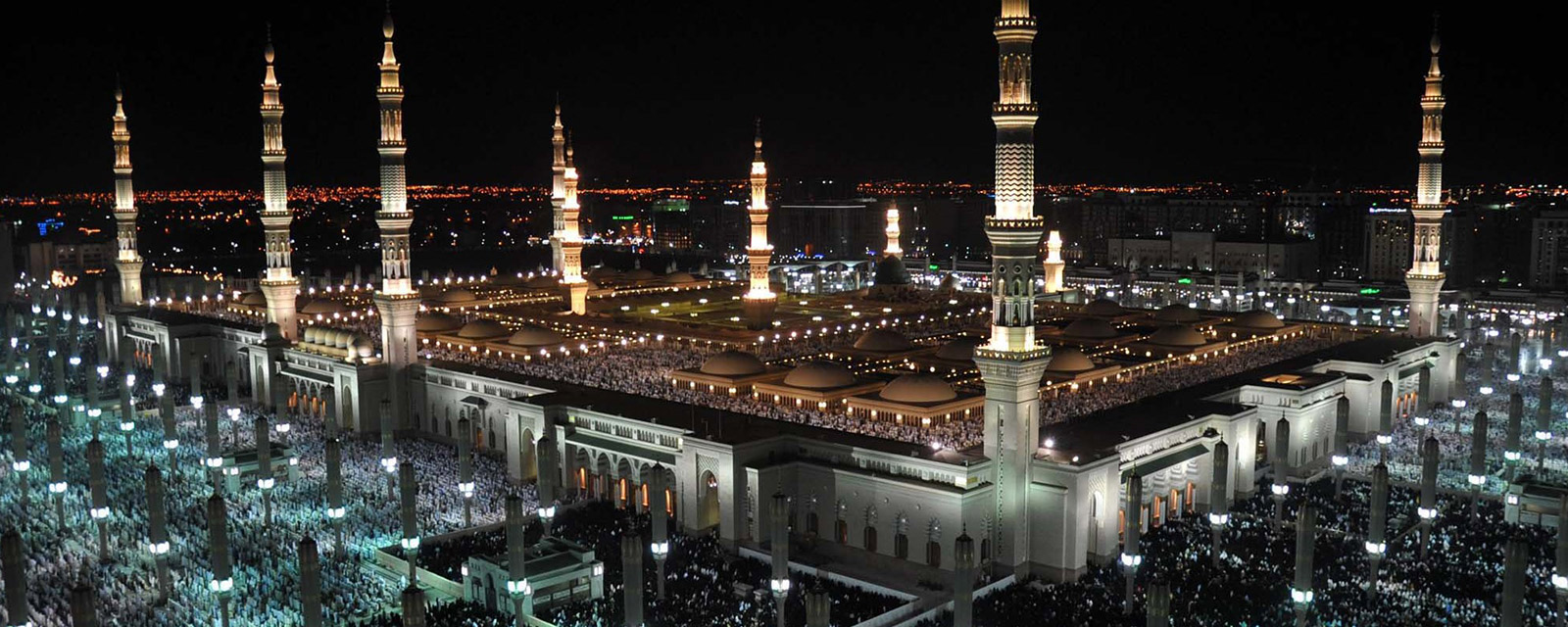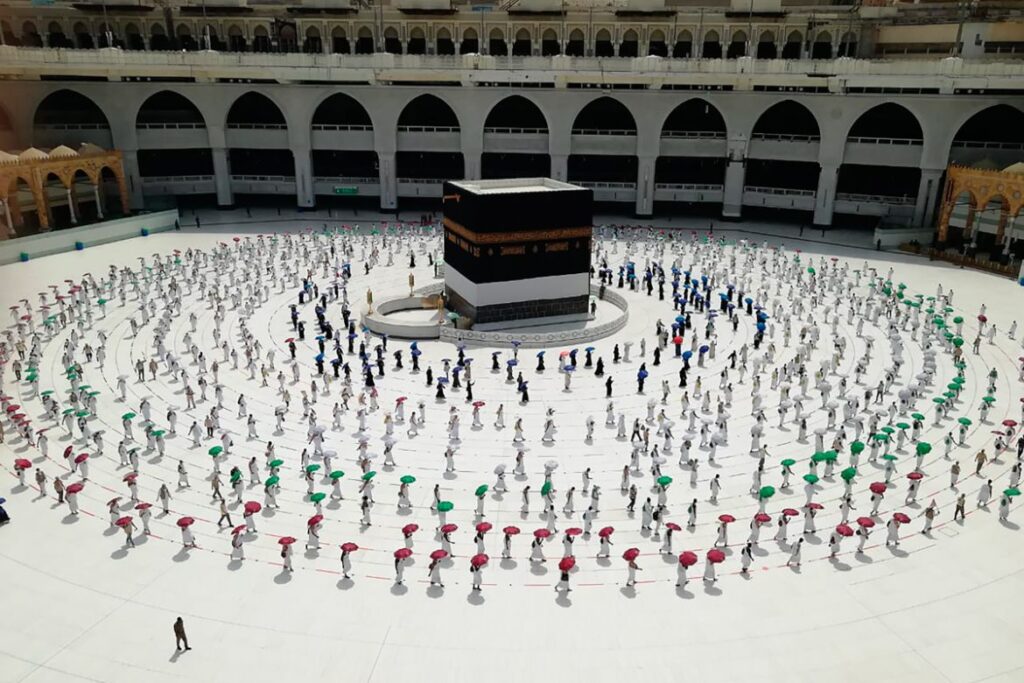بسم الله الرحمن الرحيم
Assalamu Alaikum.
(Here are Parts 1, 2, 3, 4, 5, 6, 7 ,8, 9 and 10.)
Alhamdulillah, this is the last part of this series and it includes a range of topics including Madinah, Masjid An-Nabawi and Masjid Al-Aqsa.
Hope you enjoy it.
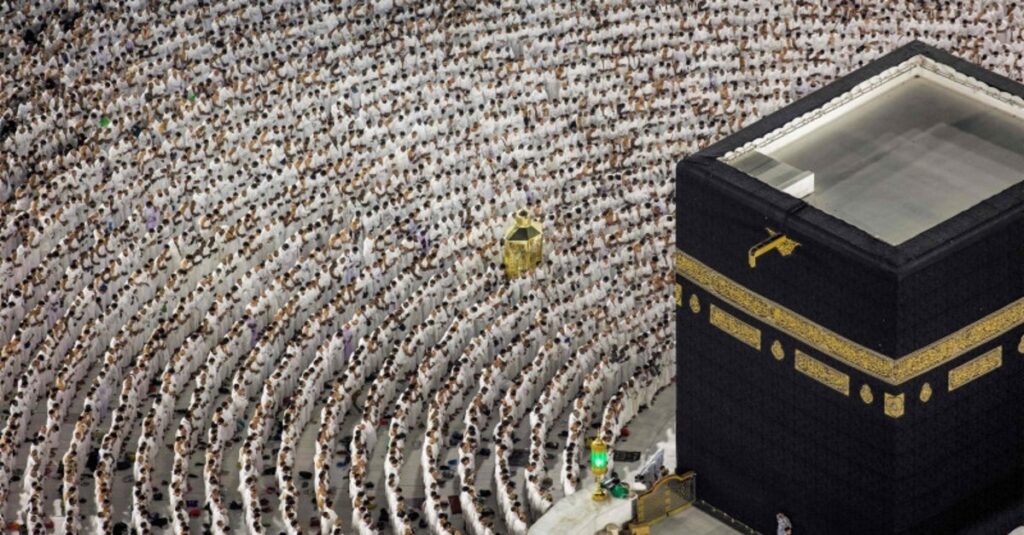
HAJJ AND IBRAHIM (ALAIHISSALAAM)
Hajj is always connected with Ibrahim (alaihissalaam) but it was only after working on the last few parts of this series, that I realised just how MUCH Hajj is connected to him.
It was known that the pagans used to do both Hajj and Umrah prior to Islam.
عَنْ جَابِرٍ، قَالَ كَانَ النَّبِيُّ صلى الله عليه وسلم يَعْرِضُ نَفْسَهُ بِالْمَوْقِفِ فَقَالَ : أَلاَ رَجُلٌ يَحْمِلُنِي إِلَى قَوْمِهِ فَإِنَّ قُرَيْشًا قَدْ مَنَعُونِي أَنْ أُبَلِّغَ كَلاَمَ رَبِّي
عن أَبي هُرَيْرَة، قَالَ بَعَثَنِي أَبُو بَكْرٍ ـ رضى الله عنه ـ فِيمَنْ يُؤَذِّنُ يَوْمَ النَّحْرِ بِمِنًى لاَ يَحُجُّ بَعْدَ الْعَامِ مُشْرِكٌ، وَلاَ يَطُوفُ بِالْبَيْتِ عُرْيَانٌ. وَيَوْمُ الْحَجِّ الأَكْبَرِ يَوْمُ النَّحْرِ، وَإِنَّمَا قِيلَ الأَكْبَرُ مِنْ أَجْلِ قَوْلِ النَّاسِ الْحَجُّ الأَصْغَرُ. فَنَبَذَ أَبُو بَكْرٍ إِلَى النَّاسِ فِي ذَلِكَ الْعَامِ، فَلَمْ يَحُجَّ عَامَ حَجَّةِ الْوَدَاعِ الَّذِي حَجَّ فِيهِ النَّبِيُّ صلى الله عليه وسلم مُشْرِكٌ
Narrated Abu Hurairah (radiallahu anhu): Abu Bakr, on the day of Nahr (i.e. slaughtering of animals for sacrifice), sent me in the company of others to make this announcement: “After this year, no pagan will be allowed to perform the Hajj, and none will be allowed to perform the Tawaf of the Kabah naked.” And the day of Al-Hajj Al-Akbar is the day of Nahr, and it called Al-Akbar because the people call the Umrah Al-Hajj Al-Asghar (i.e. the minor Hajj). Abu Bakr threw back the pagans’ covenant that year, and therefore, no pagan performed the Hajj in the year of Hajj Al-Wada of the Prophet (sallallahu alaihi wasallam). [Sahih Al-Bukhari, Volume 4, Hadeeth No. 402]
عَنِ ابْنِ عَبَّاسٍ ـ رضى الله عنهما ـ قَالَ كَانُوا يَرَوْنَ أَنَّ الْعُمْرَةَ فِي أَشْهُرِ الْحَجِّ مِنَ الْفُجُورِ فِي الأَرْضِ، وَكَانُوا يُسَمُّونَ الْمُحَرَّمَ صَفَرًا وَيَقُولُونَ إِذَا بَرَا الدَّبَرْ، وَعَفَا الأَثَرْ، حَلَّتِ الْعُمْرَةُ لِمَنِ اعْتَمَرْ. قَالَ فَقَدِمَ رَسُولُ اللَّهِ صلى الله عليه وسلم وَأَصْحَابُهُ رَابِعَةً مُهِلِّينَ بِالْحَجِّ وَأَمَرَهُمُ النَّبِيُّ صلى الله عليه وسلم أَنْ يَجْعَلُوهَا عُمْرَةً. قَالُوا يَا رَسُولَ اللَّهِ، أَىُّ الْحِلِّ قَالَ : الْحِلُّ كُلُّهُ
Narrated Ibn Abbas (radiallahu anhuma): The people used to consider the performance of Umrah in the months of Hajj an evil deed on the earth, and they used to call the month of Muharram as Safar and used to say, “When (the wounds over) the backs (of the camels) have healed and the foot-marks (of the camels) have vanished (after coming from Hajj), then Umrah becomes legal for the one who wants to perform Umrah.” Allah’s Messenger (sallallahu alaihi wasallam) and his companions reached Makkah assuming Ihram for Hajj on the fourth of Dhul-Hijjah. The Prophet (sallallahu alaihi wasallam) ordered his companions to perform Umrah (with that lhram instead of Hajj). They asked, “O Allah’s Messenger! What kind of finishing of Ihram?” The Prophet (sallallahu alaihi wasallam) said, “Finish the Ihram completely.’ [Sahih Al-Bukhari, Volume 5, Hadeeth No. 173]
رَّبَّنَا إِنِّي أَسْكَنتُ مِن ذُرِّيَّتِي بِوَادٍ غَيْرِ ذِي زَرْعٍ عِندَ بَيْتِكَ الْمُحَرَّمِ رَبَّنَا لِيُقِيمُوا الصَّلَاةَ فَاجْعَلْ أَفْئِدَةً مِّنَ النَّاسِ تَهْوِي إِلَيْهِمْ وَارْزُقْهُم مِّنَ الثَّمَرَاتِ لَعَلَّهُمْ يَشْكُرُونَ
The pilgrim does the following acts in Hajj and Umrah:
1.Assume ihram before crossing the Meeqat
One cannot go to Makkah without ihram if one intends to do Hajj and Umrah. One of the wisdoms behind the Meeqat was mentioned in Part 5 of this series. It had to do with fortifying the Haram (Sanctuary). Interestingly enough, the one who made Makkah a sanctuary was Ibrahim (alahissalaam).
عَنْ عَبْدِ اللَّهِ بْنِ زَيْدٍ ـ رضى الله عنه ـ عَنِ النَّبِيِّ صلى الله عليه وسلم : أَنَّ إِبْرَاهِيمَ حَرَّمَ مَكَّةَ، وَدَعَا لَهَا، وَحَرَّمْتُ الْمَدِينَةَ كَمَا حَرَّمَ إِبْرَاهِيمُ مَكَّةَ، وَدَعَوْتُ لَهَا فِي مُدِّهَا وَصَاعِهَا، مِثْلَ مَا دَعَا إِبْرَاهِيمُ ـ عَلَيْهِ السَّلاَمُ ـ لِمَكَّةَ
Narrated Abdullah ibn Zaid (radiallahu anhu): The Prophet (sallallahu alaihi wasallam) said, “Ibrahim made Makkah a sanctuary, and asked for Allah’s blessing in it. I made Madinah a sanctuary as Ibrahim made Makkah a sanctuary and I asked for Allah’s Blessing in its measures the Mudd and the Saa as Ibrahim (alaihissalaam) did for Makkah. [Sahih Al-Bukhari, Volume 3, Hadeeth No. 339]
2. Say the Talbiyah
عَنْ عَبْدِ اللَّهِ بْنِ عُمَرَ ـ رضى الله عنهما ـ أَنَّ تَلْبِيَةَ، رَسُولِ اللَّهِ صلى الله عليه وسلم لَبَّيْكَ اللَّهُمَّ لَبَّيْكَ، لَبَّيْكَ لاَ شَرِيكَ لَكَ لَبَّيْكَ، إِنَّ الْحَمْدَ وَالنِّعْمَةَ لَكَ وَالْمُلْكَ، لاَ شَرِيكَ لَكَ
Narrated Abdullah ibn Umar (radiallahu anhu): The Talbiya of Allah’s Messenger (sallallahu alaihi wasallam) was : ‘Labbaika Allahumma labbaik, Labbaika la sharika Laka labbaik, Inna-l-hamda wan-nimata Laka walmulk, La sharika Lak (I respond to Your call O Allah, I respond to Your call, and I am obedient to Your orders, You have no partner, I respond to Your call All the praises and blessings are for You, All the sovereignty is for You, And You have no partners with you. [Sahih Al-Bukhari, Volume 2, Hadeeth No. 621]
As mentioned in Part 5, the first part of the Talbiyah is “I respond to your call O Allah” which is a response to the call of Ibrahim (alaihissalaam).
وَأَذِّن فِي النَّاسِ بِالْحَجِّ يَأْتُوكَ رِجَالًا وَعَلَىٰ كُلِّ ضَامِرٍ يَأْتِينَ مِن كُلِّ فَجٍّ عَمِيقٍ
And proclaim to mankind the Hajj (pilgrimage). They will come to you on foot and on every lean camel, they will come from every deep and distant (wide) mountain highway (to perform Hajj). [Surah Al-Hajj (22) : 27]
ثم قال: هل تدري كيفَ كانَتِ التَّلْبيةُ؟ قلتُ: وكيفَ كانت؟ قال: إنَّ إبراهيمَ لما أُمِر أنْ يُؤذِّنَ في الناسِ بالحَجِّ، خفَضتْ له الجبالُ رؤوسَها، ورُفِعتْ له القُرَى، فأذَّنَ في الناسِ بالحَجِّ
Then he (Ibn Abbas) said: Do you know how the Talbiyah came about? I (Abu Tufail said)said: How did it come about? He said: When Ibrahim was commanded to proclaim the Hajj to mankind, the mountains lowered their heads for him and the cities were raised up for him and he proclaimed the Hajj to mankind. [Musnad Ahmad, Hadeeth No. 2707. Shuaib Al-Arnaut pointed out that most of this narration has chains and evidence that strengthen it. More of this narration can be found in Part 10.]
3. Do Tawaf around the Kabah
According to one opinion, the Kabah was built by Ibrahim (alaihissalaam).
وَإِذْ يَرْفَعُ إِبْرَاهِيمُ الْقَوَاعِدَ مِنَ الْبَيْتِ وَإِسْمَاعِيلُ رَبَّنَا تَقَبَّلْ مِنَّا ۖ إِنَّكَ أَنتَ السَّمِيعُ الْعَلِيمُ
“Our Lord! And make us submissive unto You and of our offspring a nation submissive unto You, and show us our Manasik (all the ceremonies of pilgrimage – Hajj and Umrah, etc.), and accept our repentance. Truly, You are the One Who accepts repentance, the Most Merciful. [Surah Al-Baqarah (2) : 127]
Both Ibrahim (alaihissalaam) and Ismail (alaihissalaam) were ordered to purify the house. One reason for this was for those who did tawaf around it.
وَإِذْ جَعَلْنَا الْبَيْتَ مَثَابَةً لِّلنَّاسِ وَأَمْنًا وَاتَّخِذُوا مِن مَّقَامِ إِبْرَاهِيمَ مُصَلًّى ۖ وَعَهِدْنَا إِلَىٰ إِبْرَاهِيمَ وَإِسْمَاعِيلَ أَن طَهِّرَا بَيْتِيَ لِلطَّائِفِينَ وَالْعَاكِفِينَ وَالرُّكَّعِ السُّجُودِ
And (remember) when We made the House (the Kabah at Makkah) a place of resort for mankind and a place of safety. And take you (people) the Maqam (place) of Ibrahim [or the stone on which Ibrahim stood while he was building the Kabah] as a place of prayer (for some of your prayers, e.g. two Rakahs after the Tawaf of the Kabah at Makkah), and We commanded Ibrahim (Abraham) and Ismail that they should purify My House (the Kabah at Makkah) for those who are circumambulating it, or staying (Itikaf), or bowing or prostrating themselves (there, in prayer). [Surah Al-Baqarah (2) : 125]
The pagan Arabs used to do tawaf too (albeit naked as mentioned in Part 3) and they must have learnt this from Ibrahim (alaihissalaam) and Ismail (alaihissalaam).
As mentioned in Part 3, the pagans rebuilt the Kabah upon other than the foundations of Ibrahim (alaihissalaam) i.e. their Kabah was smaller than his Kabah. Only two of the corners of the rebuilt Kabah were upon the foundations of Ibrahim (alaihissalaam) and those are the only two corners that we are supposed to touch during tawaf.
عَنِ ابْنِ عُمَرَ، أَنَّ رَسُولَ اللَّهِ صلى الله عليه وسلم كَانَ لاَ يَسْتَلِمُ إِلاَّ الْحَجَرَ وَالرُّكْنَ الْيَمَانِيَ
It was narrated from Ibn Umar that the Prophet (sallallahu alaihi wasallam) used to touch only the Stone and the Yemeni Corner. [Sunan An-Nasai, Hadeeth No. 2951. Graded “sahih” (authentic) by Al-Albani.]
Why did he touch only two of the corners? Abdullah Ibn Umar (radiallahu anhuma) mentioned a possible reason.
عَنْ سَالِمِ بْنِ عَبْدِ اللَّهِ، أَنَّ ابْنَ أَبِي بَكْرٍ، أَخْبَرَ عَبْدَ اللَّهِ بْنَ عُمَرَ، عَنْ عَائِشَةَ ـ رضى الله عنهم ـ زَوْجِ النَّبِيِّ صلى الله عليه وسلم أَنَّ رَسُولَ اللَّهِ صلى الله عليه وسلم قَالَ ” أَلَمْ تَرَىْ أَنَّ قَوْمَكِ بَنَوُا الْكَعْبَةَ اقْتَصَرُوا عَنْ قَوَاعِدِ إِبْرَاهِيمَ ”. فَقُلْتُ يَا رَسُولَ اللَّهِ، أَلاَ تَرُدُّهَا عَلَى قَوَاعِدِ إِبْرَاهِيمَ. فَقَالَ ” لَوْلاَ حِدْثَانُ قَوْمِكِ بِالْكُفْرِ ”. فَقَالَ عَبْدُ اللَّهِ بْنُ عُمَرَ لَئِنْ كَانَتْ عَائِشَةُ سَمِعَتْ هَذَا مِنْ رَسُولِ اللَّهِ صلى الله عليه وسلم مَا أُرَى أَنَّ رَسُولَ اللَّهِ صلى الله عليه وسلم تَرَكَ اسْتِلاَمَ الرُّكْنَيْنِ اللَّذَيْنِ يَلِيَانِ الْحِجْرَ إِلاَّ أَنَّ الْبَيْتَ لَمْ يُتَمَّمْ عَلَى قَوَاعِدِ إِبْرَاهِيمَ.
Salim ibn Abdullah narrated that the son of Abu Bakr informed Abdullah ibn Umar, that Aishah (radiallahu anhum), the wife of the Prophet (sallallahu alaihi wasallam) that the Messenger of Allah (sallallahu alaihi wasallam) said: Don’t you see that when your people built the Kabah, they did not build it on all the foundations built by Ibrahim?” I said, “O Allah’s Messenger! Why don’t we rebuild it on the foundations of Ibraham?” He said. “But for the fact that your people have recently given up disbelief (I would have done so). Abdullah Ibn Umar said: Aishah must have heard this from Allah’s Messenger (sallallahu alaihi wasallam) for I see that Allah’s Messenger (sallallahu alaihi wasallam) used not to touch the two corners facing Al-Hijr only because the House had not been built on the foundations of Ibrahim.” [Sahih Al-Bukhari, Volume 4, Hadeeth No. 587]
When Ibrahim (alaihissalaam) built the Kabah, he stood on a stone.
The Prophet (sallallahu alaihi wasallam) added, “Then they raised the foundations of the House (i.e. the Kabah). Ismail brought the stones and Ibrahim was building, and when the walls became high, Ismail brought this stone and put it for Ibrahim who stood over it and carried on building, while Ismail was handing him the stones, and both of them were saying,
رَبَّنَا تَقَبَّلْ مِنَّا ۖ إِنَّكَ أَنتَ السَّمِيعُ الْعَلِيمُ
“Our Lord! Accept (this service) from us. Verily! You are the All-Hearer, the All-Knower.” [Surah Al-Baqarah (2) : 127]
[Sahih Al-Bukhari, Volume 4, Hadeeth No. 583. The whole narration can be found in Part 3.]
The people were commanded to pray behind the stone which is referred to as Maqam Ibrahim.
وَإِذْ جَعَلْنَا الْبَيْتَ مَثَابَةً لِّلنَّاسِ وَأَمْنًا وَاتَّخِذُوا مِن مَّقَامِ إِبْرَاهِيمَ مُصَلًّى ۖ وَعَهِدْنَا إِلَىٰ إِبْرَاهِيمَ وَإِسْمَاعِيلَ أَن طَهِّرَا بَيْتِيَ لِلطَّائِفِينَ وَالْعَاكِفِينَ وَالرُّكَّعِ السُّجُودِ
And (remember) when We made the House (the Kabah at Makkah) a place of resort for mankind and a place of safety. And take you (people) the Maqam (place) of Ibrahim [or the stone on which Ibrahim stood while he was building the Kabah] as a place of prayer (for some of your prayers, e.g. two Rakahs after the Tawaf of the Kabah at Makkah), and We commanded Ibrahim (Abraham) and Ismail that they should purify My House (the Kabah at Makkah) for those who are circumambulating it, or staying (Itikaf), or bowing or prostrating themselves (there, in prayer). [Surah Al-Baqarah (2) : 125]
One needs to pray two rakahs behind Maqam Ibrahim after doing tawaf. After this, one is meant to drink some Zam Zam water.
عن جابر بن عبد الله أنَّ النَّبيَّ صلَّى اللهُ عليه وسَلَّم رَمَلَ ثَلاثةَ أطْوافٍ مِن الحَجَرِ إلى الحَجَرِ، وصلَّى رَكعَتَينِ، ثُمَّ عادَ إلى الحَجَرِ، ثُمَّ ذَهَبَ إلى زَمزَمَ فشَرِبَ منها، وصَبَّ على رَأْسِه، ثُمَّ رَجَعَ فاستَلَمَ الرُّكنَ، ثُمَّ رَجَعَ إلى الصَّفا، فقال: أبْدأُ بما بَدَأَ اللهُ عزَّ وجلَّ به
Jaabir ibn Abdullah (radiallanhu anhuma): The Prophet (sallallahu alaihi wasallam) performed three rounds of Tawaf walking briskly (starting) from the Stone to the Stone (i.e. ending with it). He performed two units of prayer, returned to the Stone, then went to Zam Zam and drank from it and poured some over his head. Next, he returned and touched the corner, and then went to As-Safaa and said, “Begin with what Allah began with.” [Musnad Ahmad, Hadeeth No. 15243. Shuaib Al-Arnaut stated that its isnad (chain of narrators) was authentic upon the conditions of Muslim.]
As mentioned in Part 7, Zam Zam is connected to Haajar (radiallahu anha), the wife of Ibrahim (alaihissalaam).
فلماأشرَفَت على المروةِ سمعَت صوتاً فقالت: صَهٍ ـ تريدُ نفسَها ـ ثمَّ تسمَّعَتْ أيضاً فقالت: قد أسمعتَ إن كان عندَكَ غِواث، فإِذا هيَ بالملَكِ عند مَوضعِ زَمزم، فبَحَثَ بعَقِبهِ ـ أو قال بجَناحهِ ـ حتى ظهرَ الماءُ، فجعَلَت تَحُوضهُ وتقول بيدِها هكذا، وجَعلت تَغرِفُ منَ الماءِ في سِقائها وهوَ يَفورُ بعدما تَغرِفُ. قال ابنُ عباسٍ قال النبيُّ صلى الله عليه وسلّم: يَرحَمُ الله أمَّ إسماعيلَ لو تَرَكَت زمزَم ـ أو قال: لو لم تَغرِف منَ الماء ـ لكانت زمزمُ عَيناً مَعيناً.
When she reached the Marwah (for the last time) she heard a voice and she asked herself to be quiet and listened attentively. She heard the voice again and said, ‘O, (whoever you may be)! You have made me hear your voice; have you got something to help me?” And behold! She saw an angel at the place of Zam-Zam, digging the earth with his heel (or his wing), till water flowed from that place. She started to make something like a basin around it, using her hand in this way, and started filling her water-skin with water with her hands, and the water was flowing out after she had scooped some of it.”
The Prophet (sallallahu alaihi wasallam) added, “May Allah bestow Mercy on Ismail’s mother! Had she let the Zam-Zam (flow without trying to control it) (or had she not scooped from that water) (to fill her water-skin), Zam-Zam would have been a stream flowing on the surface of the earth.” [Sahih Al-Bukhari, Volume 4, Hadeeth No. 583. This is only part of the hadeeth. The full story was mentioned in Part 3.]
4. Do Saee between As-Safa and Al-Marwah
Saee is connected to Haajar (radiallahu anha), the wife of Ibrahim (alaihissalaam).
وجَعَلت أمُّ إِسماعيلَ تُرضِعُ إِسماعيلَ وتَشربُ من ذلك الماء، حتى إِذا نَفِذَ ما في السِّقاءِ عَطِشَت وعطِش ابنُها، وجعَلَت تَنظُرُ إِليه يَتلوَّى ـ أو قال: يَتلبَّط ـ فانطَلَقَتْ كراهيةَ أن تَنظُرَ إِليه، فوَجدَتِ الصَّفا أقرَبَ جَبلٍ في الأرضِ يَليها، فقامَت عليهِ، ثمَّ استقبَلَتِ الوادِيَ تَنظُرُ هل تَرَى أحداً، فلم تَرَ أحداً، فهبَطَت مِنَ الصَّفا، حتى إِذا بلَغَتِ الواديَ رَفعَت طرَفَ دِرعِها، ثمَّ سَعَت سَعيَ الإنسانِ المجهودِ حتى جاوَزَتِ الواديَ، ثمَّ أتَتِ المرْوَةَ فقامت عليها فنظَرَت هل تَرَى أحداً، فلم تَرَ أحداً، ففعلت ذلك سبعَ مراتٍ. قال ابنُ عباسٍ قال النبيُّ: فذلك سعيُ الناسِ بينهما
Ismail’s mother went on suckling Ismail and drinking from the water (she had). When the water in the water-skin had all been used up, she became thirsty and her child also became thirsty. She started looking at him (i.e. Ismail) tossing in agony; She left him, for she could not endure looking at him, and found that the mountain of Safa was the nearest mountain to her on that land. She stood on it and started looking at the valley keenly so that she might see somebody, but she could not see anybody. Then she descended from Safa and when she reached the valley, she tucked up her robe and ran in the valley like a person in distress and trouble, till she crossed the valley and reached the Marwah mountain where she stood and started looking, expecting to see somebody, but she could not see anybody. She repeated that (running between Safa and Marwah) seven times.” The Prophet (sallallahu alaihi wassalam) said, “This is the source of the tradition of the walking of people between them (i.e. Safa and Marwah). [Sahih Al-Bukhari, Volume 4, Hadeeth No. 583. The whole narration can be found in Part 3.]
The men are supposed to run between the green markers in As-Safa and Al-Marwah. That is the sunnah of the Prophet (sallallahu alaihi wasallam). It might have some connection to Ibrahim (alaihissalaam) as well, as his wife ran between the mountains, and it seems he raced the devil between them.
ذلك سُنَّةٌ؟ قال: صدَقوا، إنَّ إبراهيمَ لمَّا أُمِر بالمناسِكِ، عرَضَ له الشيطانُ عندَ المَسْعى فسابَقَه، فسبَقَه إبراهيمُ، ثم ذهَب به جِبْريلُ إلى جَمْرةِ العَقَبةِ، فعرَضَ له شيطانٌ -قال يونُسُ: الشيطانُ– فرماه بسبْعِ حَصَياتٍ، حتى ذهَب،
I [Abu Tufail] said [to Ibn Abbas]: And your people are claiming that the Messenger of Allah (sallallahu alaihi wasallam) trotted As-Safa and Al-Marwah and that this is the Sunnah. He said: They are telling the truth. When the rituals were enjoined upon Ibrahim, the Shaytaan (devil) appeared to him at the place of saee and started to race with him, but Ibrahim beat him to the race. Then Jibreel (alaihissalaam) took him to Jamratul Aqabah, where a Shaytaan (devil) – Yoonus said: the Shaytaan (devil) – appeared to him, so he stoned him with seven pebbles until he went away. [Musnad Ahmad, Hadeeth No. 2707. Shuaib Al-Arnaut pointed out that most of this narration has chains and evidence that strengthen it. More of this narration can be found in Part 10.]
5. Going to Mina, Arafah and Muzdalifah for Hajj
In Mina, one stones the pillars and slaughters an animal, whereas Arafah and Muzdalifah are for the remembrance of Allah.
All of these have a connection to Ibrahim (alaihissalaam).
قلتُ: ويزعُمُ قومُكَ أنَّ رسولَ اللهِ صلَّى اللهُ عليه وسلَّمَ سعَى بينَ الصفا والمروةِ، وأنَّ ذلك سُنَّةٌ؟ قال: صدَقوا، إنَّ إبراهيمَ لمَّا أُمِر بالمناسِكِ، عرَضَ له الشيطانُ عندَ المَسْعى فسابَقَه، فسبَقَه إبراهيمُ، ثم ذهَب به جِبْريلُ إلى جَمْرةِ العَقَبةِ، فعرَضَ له شيطانٌ -قال يونُسُ: الشيطانُ– فرماه بسبْعِ حَصَياتٍ، حتى ذهَب، ثم عرَضَ له عندَ الجَمْرةِ الوُسْطى، فرماه بسبْعِ حَصَياتٍ، قال: قد تَلَّه للجَبينِ -قال يونُسُ: وثَمَّ تَلَّه للجَبينِ- وعلى إسماعيلَ قميصٌ أبيضُ، وقال: يا أبَتِ، إنَّه ليس لي ثوبٌ تُكفِّنُني فيه غيرُه، فاخلَعْه حتى تُكَفِّنُني فيه، فعالَجَه ليخلَعَه، فنُودِيَ من خلفِه: {أَنْ يَا إِبْرَاهِيمُ قَدْ صَدَّقْتَ الرُّؤْيَا} [الصافات: 105] فالتفَتَ إبراهيمُ، فإذا هو بكبشٍ أبيضَ، أقرَنَ، أعيَنَ. قال ابنُ عبَّاسٍ: لقد رأيتُنا نتبَعُ ذلك الضَّربَ من الكِباشِ، قال: ثم ذهَب به جِبْريلُ إلى الجَمْرةِ القُصْوى، فعرَضَ له الشيطانُ، فرماه بسبْعِ حَصَياتٍ؛ حتى ذهَب، ثم ذهَب به جِبْريلُ إلى مِنًى، قال: هذا مِنًى -قال يونُسُ: هذا مُناخُ الناسِ- ثم أتى به جَمْعًا، فقال: هذا المَشعَرُ الحرامُ، ثم ذهَب به إلى عَرَفةَ، فقال ابنُ عبَّاسٍ: هل تدري لِمَ سُمِّيتْ عَرَفةَ؟ قلتُ: لا. قال: إنَّ جِبْريلَ قال لإبراهيمَ: عرَفتَ -قال يونُسُ: هل عرَفتَ؟- قال: نعَمْ. قال ابنُ عبَّاسٍ: فمِن ثَمَّ سُمِّيتْ عَرَفةَ، ثم قال: هل تدري كيفَ كانَتِ التَّلْبيةُ؟ قلتُ: وكيفَ كانت؟ قال: إنَّ إبراهيمَ لما أُمِر أنْ يُؤذِّنَ في الناسِ بالحَجِّ، خفَضتْ له الجبالُ رؤوسَها، ورُفِعتْ له القُرَى، فأذَّنَ في الناسِ بالحَجِّ
أَن يَا إِبْرَاهِيمُ
قَدْ صَدَّقْتَ الرُّؤْيَا
The sacrifice of Ismail (alaihissalaam) is mentioned in more detail in Part 10.
As you can see from all the above, Hajj and Umrah are deeply connected to Ibrahim (alaihissalaam), the Khalil (close friend) of Allah.
In today’s time, people are trying to connect Islam with two false religions and are using his name in the process by referring to the three as “the Abrahim Faiths”.
However, there is no such that as “Abrahim Faiths (plural)”. There is only the “Abrahamic Faith (singular)” i.e. the religion of Islam. Ibrahim (alaihissalaam) was a Muslim, not a Jew nor a Christian, and he worshipped Allah alone.
قُلْ يَا أَهْلَ الْكِتَابِ تَعَالَوْا إِلَىٰ كَلِمَةٍ سَوَاءٍ بَيْنَنَا وَبَيْنَكُمْ أَلَّا نَعْبُدَ إِلَّا اللَّهَ وَلَا نُشْرِكَ بِهِ شَيْئًا وَلَا يَتَّخِذَ بَعْضُنَا بَعْضًا أَرْبَابًا مِّن دُونِ اللَّهِ ۚ فَإِن تَوَلَّوْا فَقُولُوا اشْهَدُوا بِأَنَّا مُسْلِمُونَ
يَا أَهْلَ الْكِتَابِ لِمَ تُحَاجُّونَ فِي إِبْرَاهِيمَ وَمَا أُنزِلَتِ التَّوْرَاةُ وَالْإِنجِيلُ إِلَّا مِن بَعْدِهِ ۚ أَفَلَا تَعْقِلُونَ
هَا أَنتُمْ هَٰؤُلَاءِ حَاجَجْتُمْ فِيمَا لَكُم بِهِ عِلْمٌ فَلِمَ تُحَاجُّونَ فِيمَا لَيْسَ لَكُم بِهِ عِلْمٌ ۚ وَاللَّهُ يَعْلَمُ وَأَنتُمْ لَا تَعْلَمُونَ
مَا كَانَ إِبْرَاهِيمُ يَهُودِيًّا وَلَا نَصْرَانِيًّا وَلَٰكِن كَانَ حَنِيفًا مُّسْلِمًا وَمَا كَانَ مِنَ الْمُشْرِكِينَ
إِنَّ أَوْلَى النَّاسِ بِإِبْرَاهِيمَ لَلَّذِينَ اتَّبَعُوهُ وَهَٰذَا النَّبِيُّ وَالَّذِينَ آمَنُوا ۗ وَاللَّهُ وَلِيُّ الْمُؤْمِنِينَ
وَدَّت طَّائِفَةٌ مِّنْ أَهْلِ الْكِتَابِ لَوْ يُضِلُّونَكُمْ وَمَا يُضِلُّونَ إِلَّا أَنفُسَهُمْ وَمَا يَشْعُرُونَ
يَا أَهْلَ الْكِتَابِ لِمَ تَكْفُرُونَ بِآيَاتِ اللَّهِ وَأَنتُمْ تَشْهَدُونَ
يَا أَهْلَ الْكِتَابِ لِمَ تَلْبِسُونَ الْحَقَّ بِالْبَاطِلِ وَتَكْتُمُونَ الْحَقَّ وَأَنتُمْ تَعْلَمُونَ
Say (O Muhammad): “O people of the Scripture (Jews and Christians): Come to a word that is just between us and you, that we worship none but Allah, and that we associate no partners with Him, and that none of us shall take others as lords besides Allah. Then, if they turn away, say: “Bear witness that we are Muslims.”
O people of the Scripture (Jews and Christians)! Why do you dispute about Ibrahim, while the Taurah (Torah) and the Injeel (Gospel) were not revealed till after him? Have you then no sense?
Verily, you are those who have disputed about that of which you have knowledge. Why do you then dispute concerning that which you have no knowledge? It is Allah Who knows, and you know not.
Ibrahim was neither a Jew nor a Christian, but he was a true Muslim Hanifa (Islamic Monotheism – to worship none but Allah Alone) and he was not of Al-Mushrikoon (polytheists).
Verily, among mankind who have the best claim to Ibrahim are those who followed him, and this Prophet (Muhammad) and those who have believed (Muslims). And Allah is the Wali (Protector and Helper) of the believers.
A party of the people of the Scripture (Jews and Christians) wish to lead you astray. But they shall not lead astray anyone except themselves, and they perceive not.
O people of the Scripture! (Jews and Christians): “Why do you disbelieve in the Ayat of Allah, [the Verses about Prophet Muhammad present in the Taurat (Torah) and the Injeel (Gospel)] while you (yourselves) bear witness (to their truth).”
O people of the Scripture (Jews and Christians): “Why do you mix truth with falsehood and conceal the truth while you know?” [Surah Aal-Imran (3) : 66 – 71]
All Muslims need to study the proper aqeedah (creed) so that they do not fall for the plots of the enemies of Islam*.
[*Warning: When I say “the enemies of Islam”, I am NOT referring to the Muslim rulers. The fact that some people think so just shows that the Khawarij mentality seems to be spreading. Truly, Allah’s refuge is sought.
The Muslim rulers are just that – Muslims, just like us. Please don’t forget that. I’m not saying that to avoid a jail term, rather I say that in defense of the Sunnah. The Sunnah makes it clear that we are supposed to be patient with the rulers, even if we see them doing things we dislike. Referring to them as “enemies of Islam” is not from the Sunnah, nor is defaming them. The other extreme is overpraising the rulers and obeying them in matters where they disobey Allah (and being pleased with them when they do this). None of this is from the Sunnah. Rather both groups are those that are hungry for the temporary life of this world.
Rather the sunnah with regards to the rulers is supplicating for them (i.e. to be guided and steadfast), not revolting against them, advising them (in an appropriate manner, obeying them in good and not being pleased with their disobedience (however, one should not defame them in public, due to this).
As the scholars said, the rulers are a reflection of the ruled. So, if you don’t like the actions of the Muslim rulers, my advice would be to first look at yourself and your own actions, and work on improving yourself. If every Muslim, whether ruler or ruled, did that, the world would look quite different.]
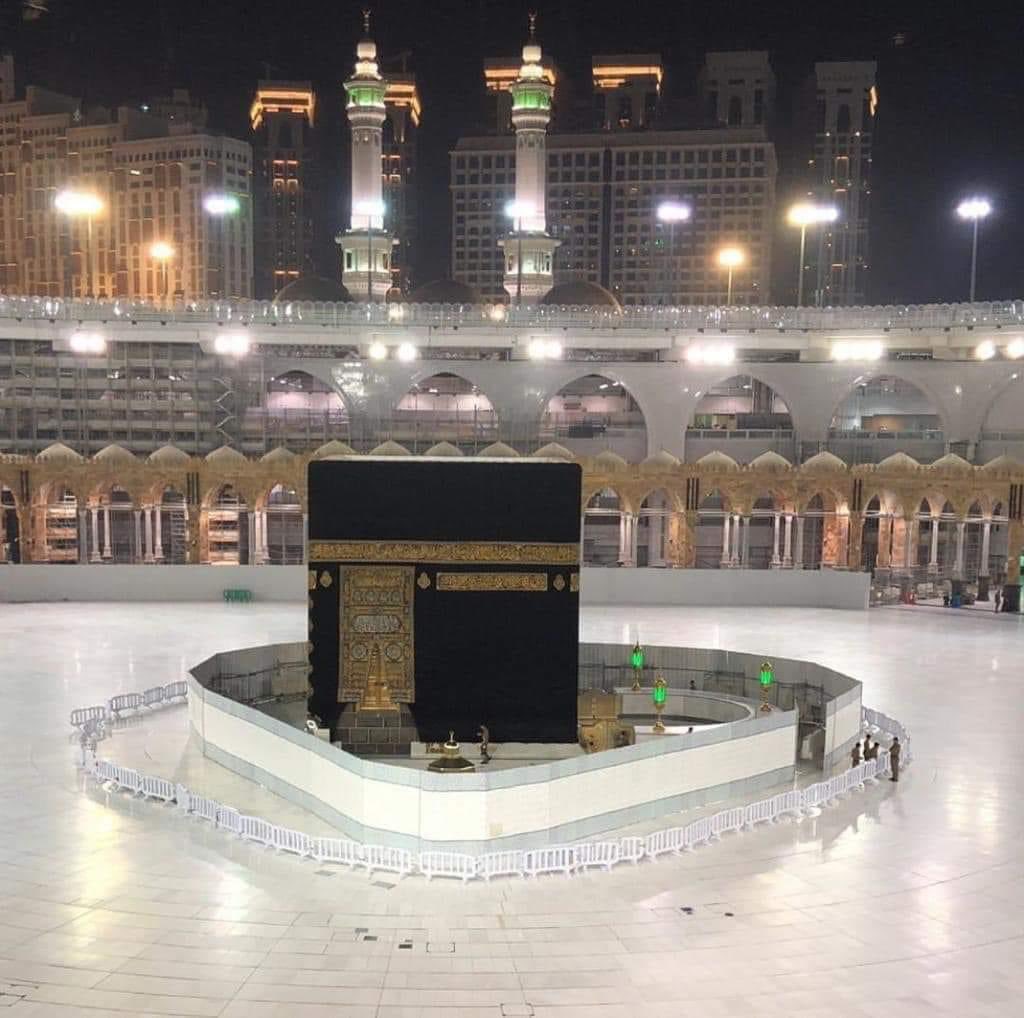
HAJJ AND UMRAH IN THE COVID ERA
Hajj 2020-2022 (i.e. the last 3 years) took place during Covid. This year’s Hajj (2023) will be the first normal Hajj since 2019.
Let’s take a look at how Hajj and Umrah looked like in the Covid era (especially at the peak of the virus), so that we can be grateful to Allah for causing us to have a normal life again.
Let’s start with the masks. Remember those?
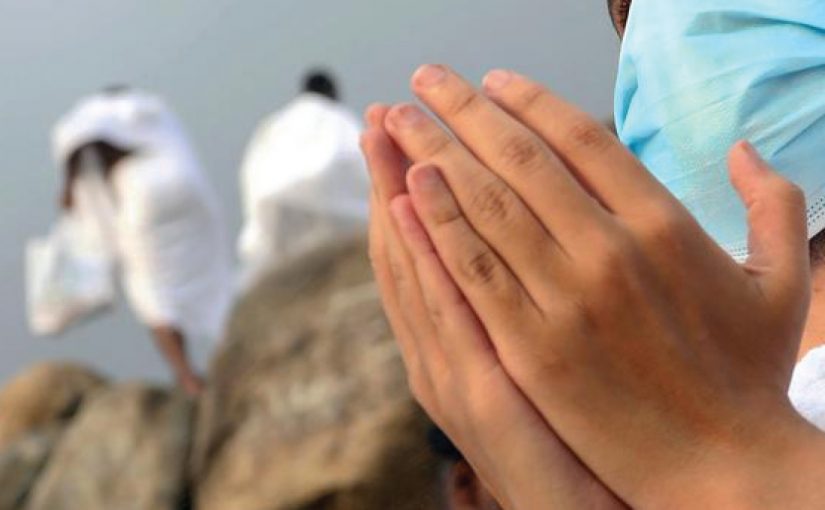
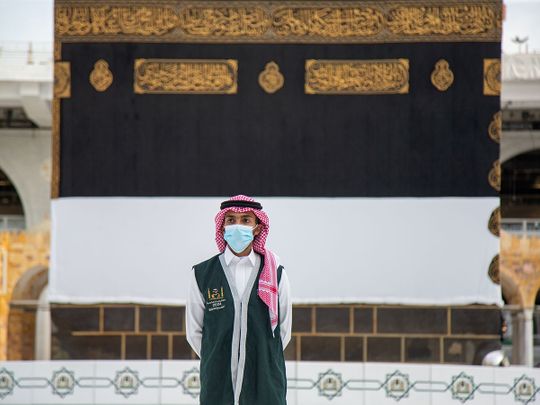
This is what Masjid Al-Haram and the Kabah looked like during Covid:
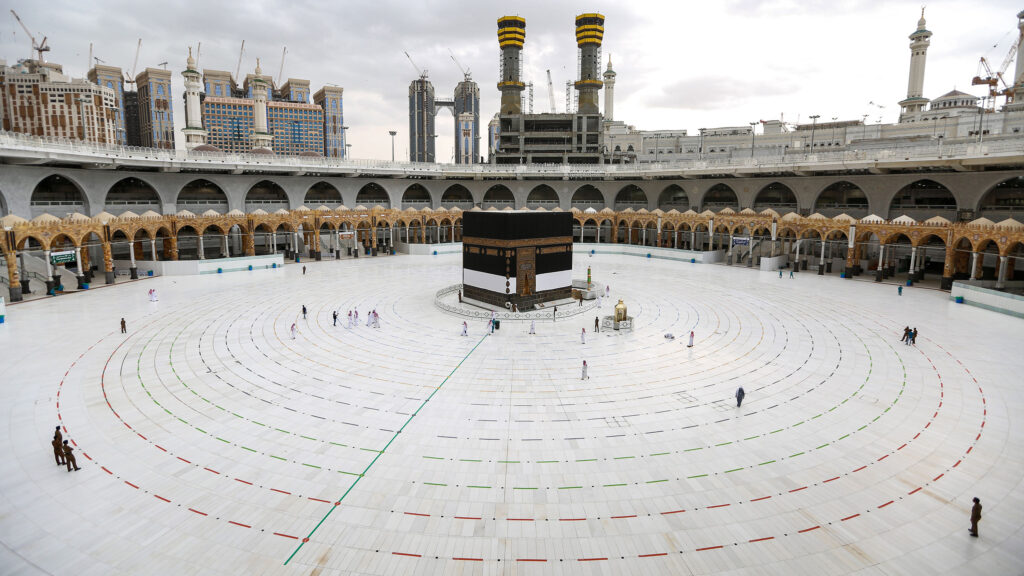
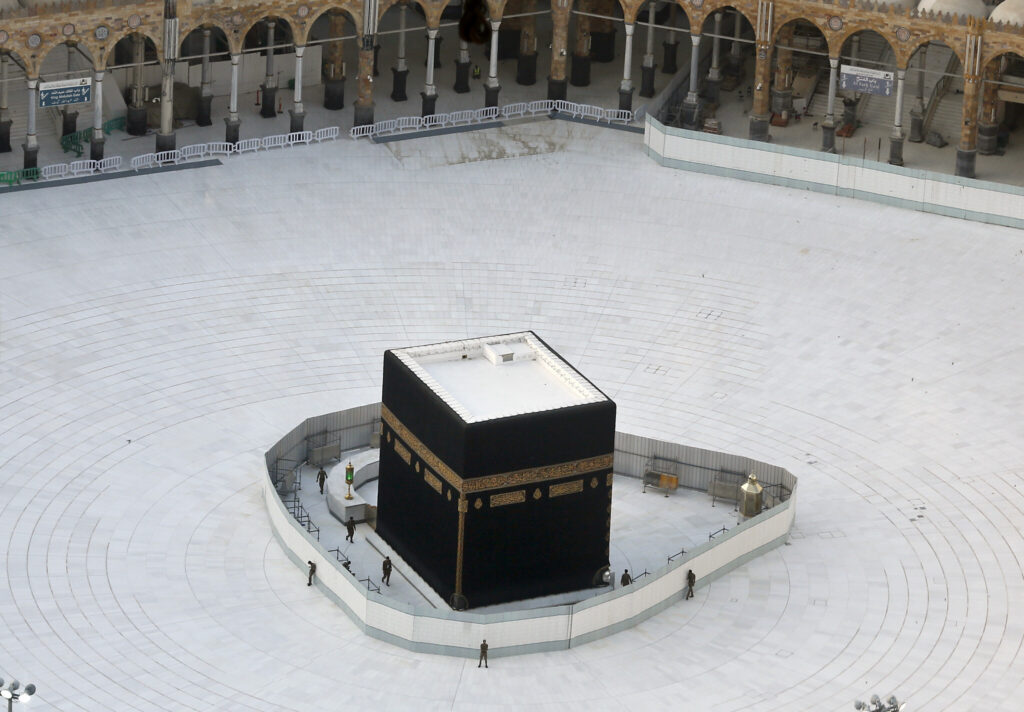
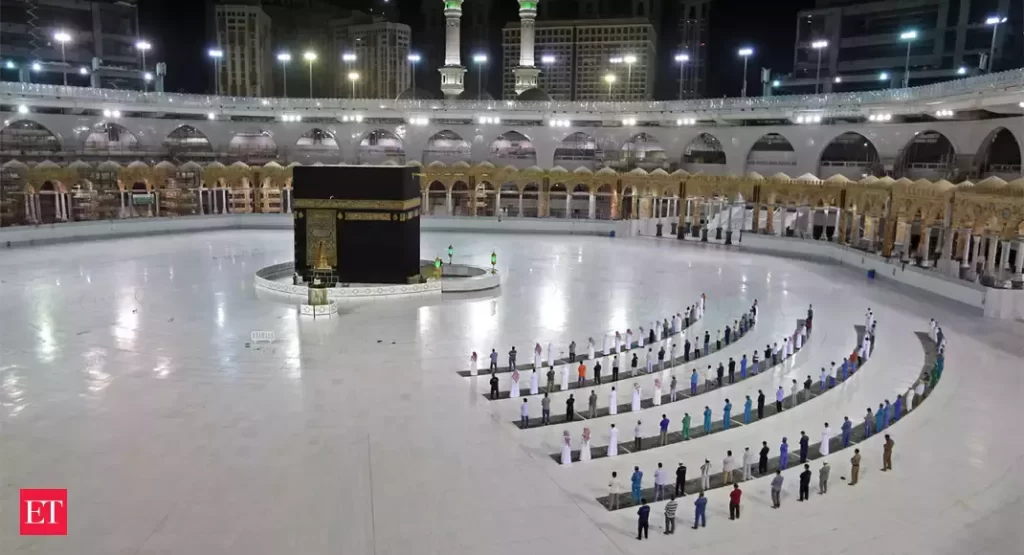
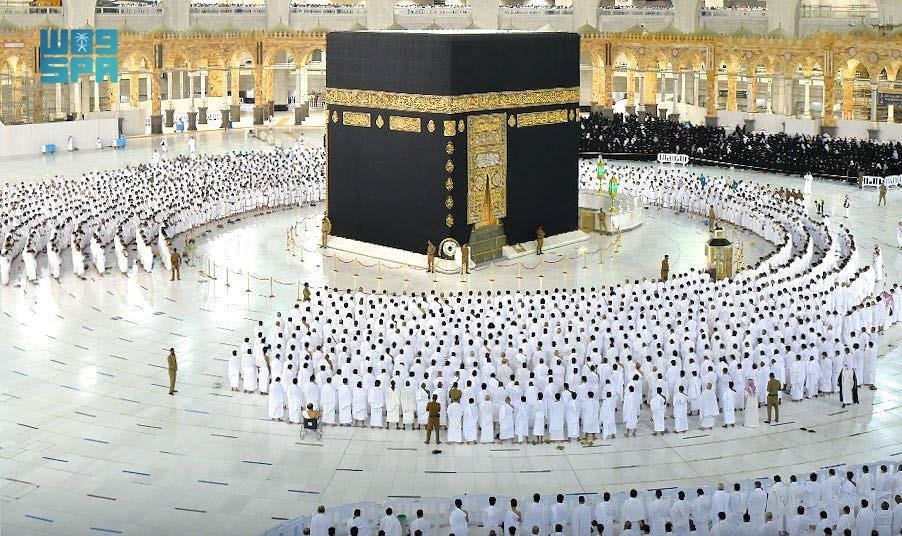
This is what tawaf in the Covid era looked like:
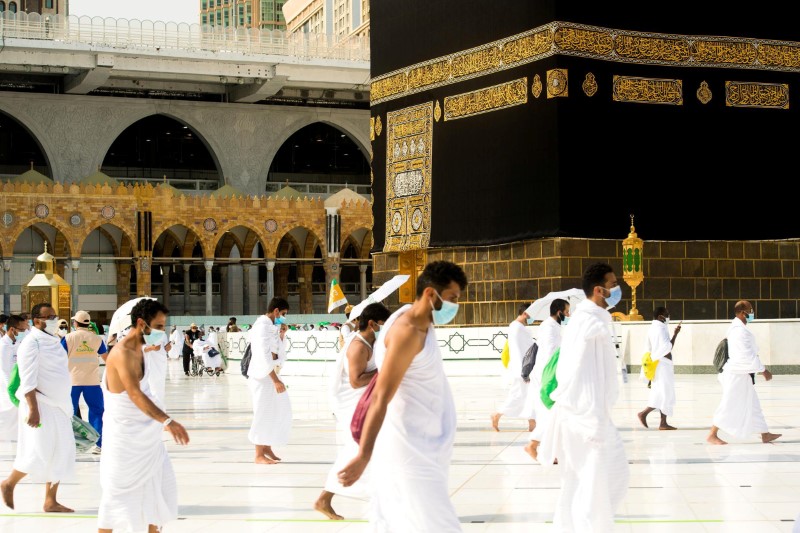
Remember the “social distancing” that we all used to practice? We went from being brothers and sisters to behaving like cold fishes.
This is what Maqam Ibrahim looked like in the Covid era:
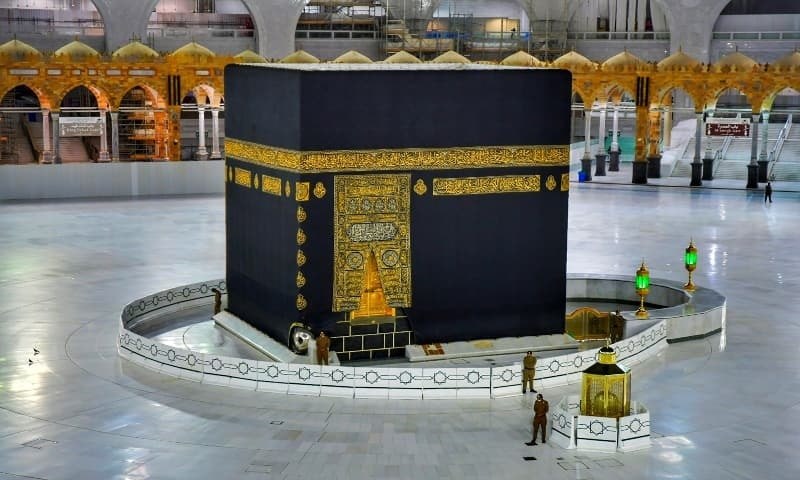
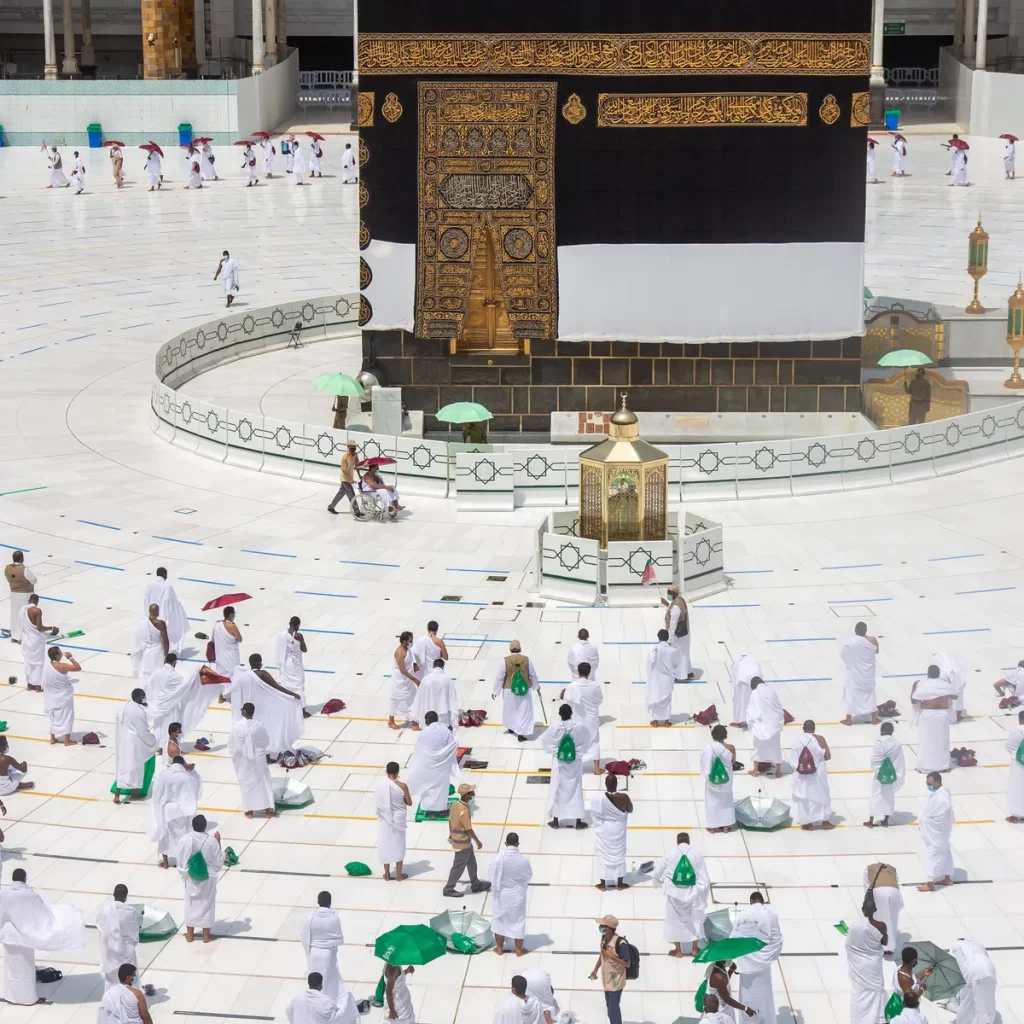
This is what saee looked liked in the Covid era:
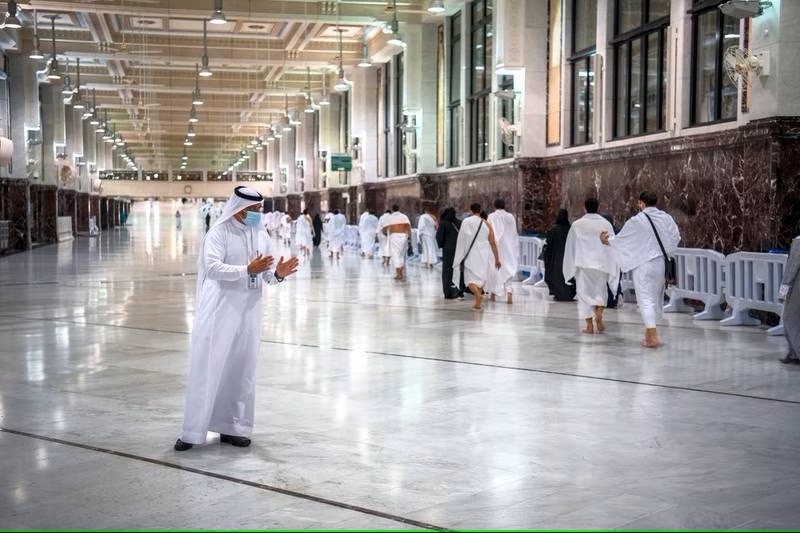
In the Covid era, robots were introduced to distribute Zam Zam:
This is what it looked like inside a tent in Mina, in the Covid era:
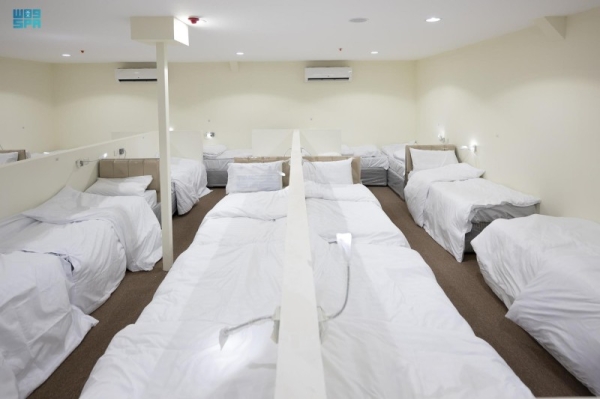
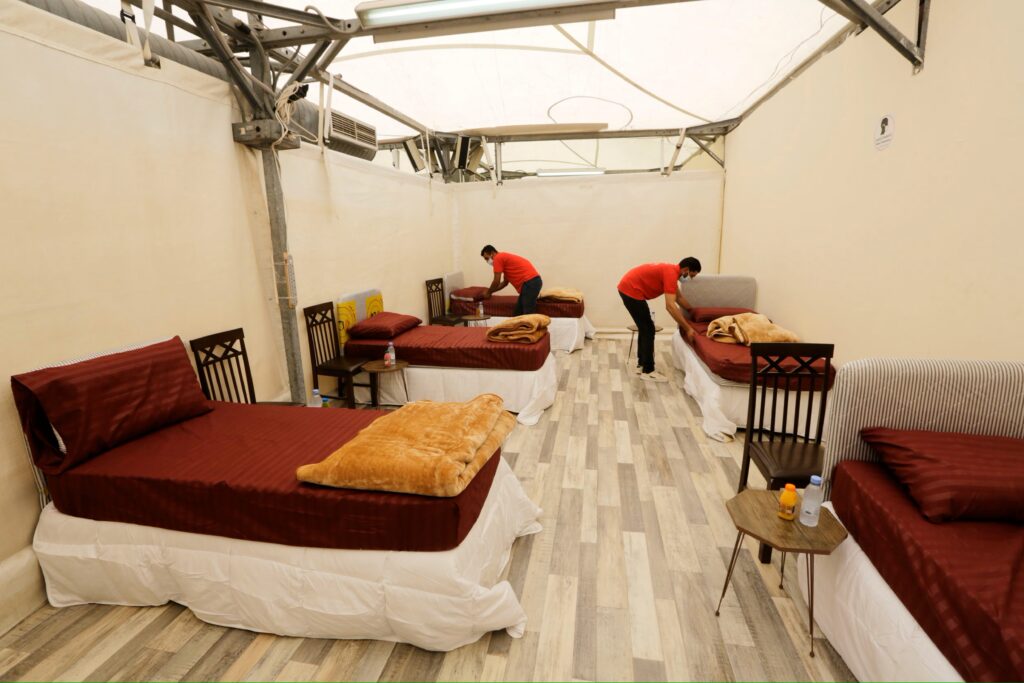
This is what stoning the Jamraat looked like in the Covid era:

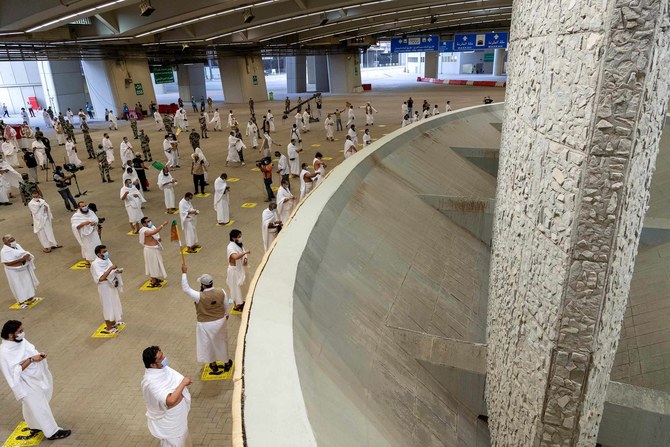
This is what Arafah looked like in the Covid era:
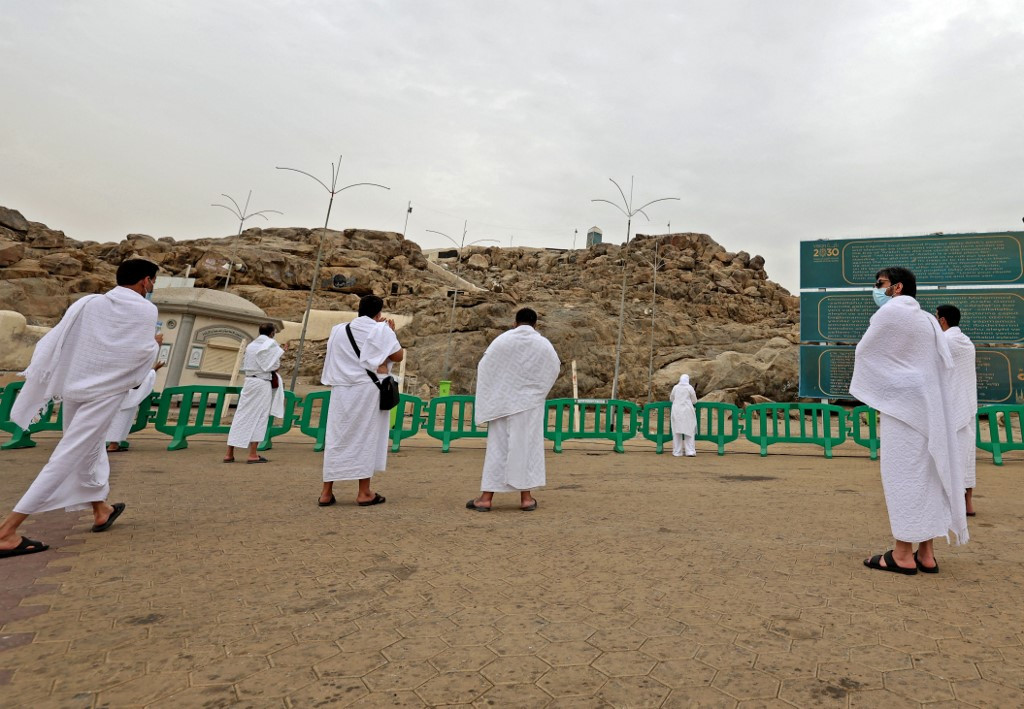
Here’s what congregational prayer in Masjid Namira (in Arafah) looked like in the Covid era:
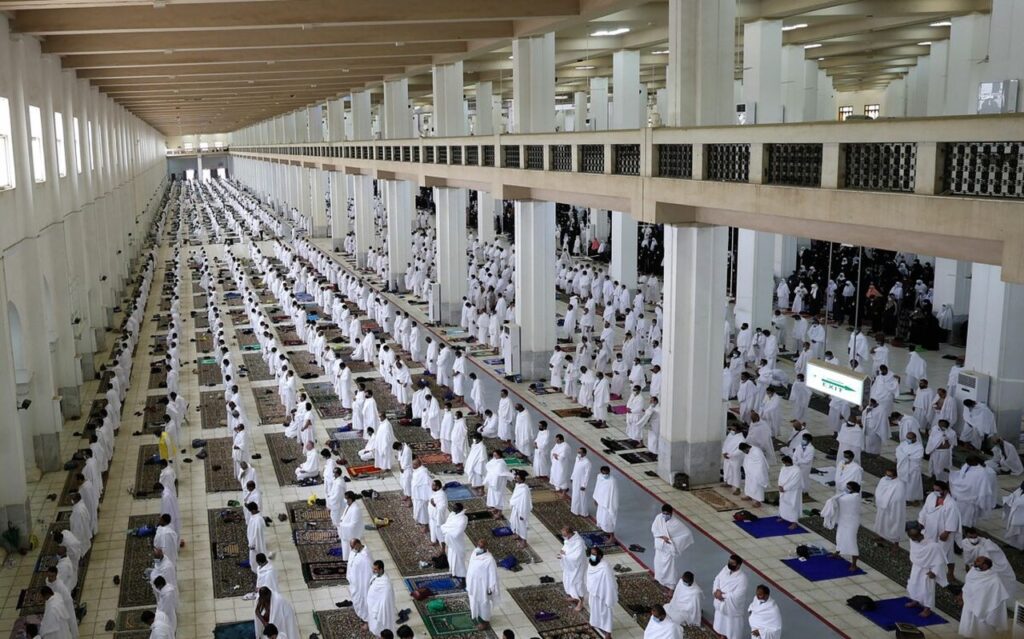
This is what Muzdalifah looked like in the Covid era:
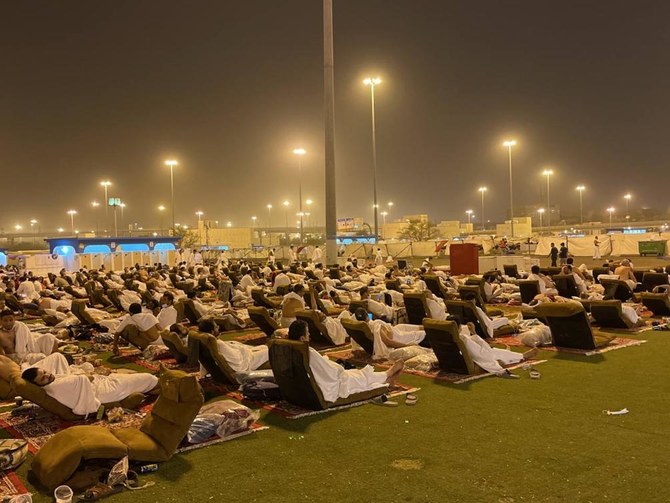
Truly, all praise is due to Allah who raised this pandemic from amongst us. All those who do Hajj this year and in the coming years should be grateful that they are getting to do a normal Hajj.
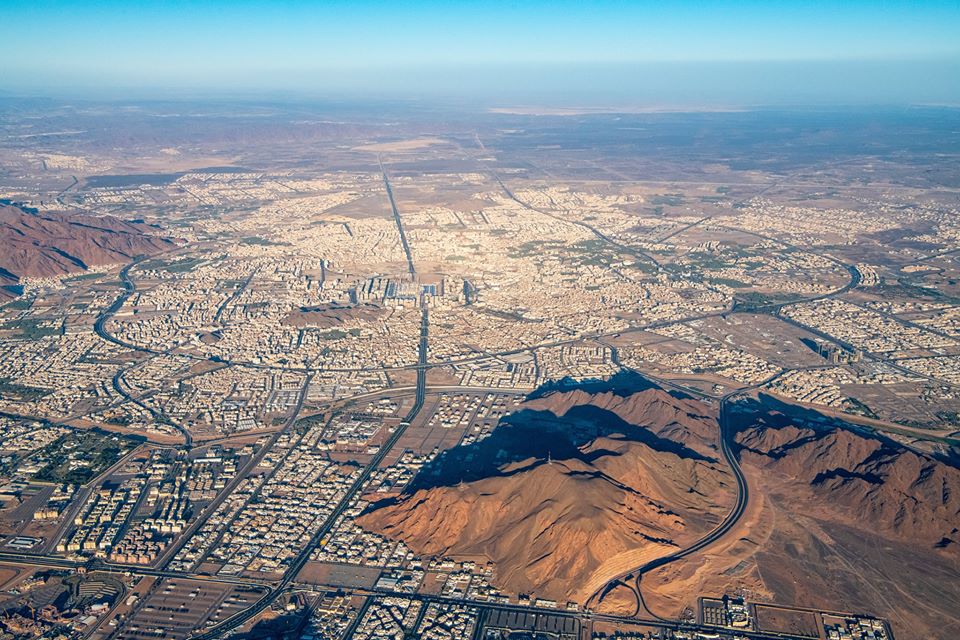
VIRTUES OF MADINAH
Madinah is a special place. It is the best place on earth after Makkah. Now, visiting Madinah is not connected to Hajj or Umrah at all. However, as people who come for Hajj or Umrah are already in Saudi Arabia, they take that opportunity to visit Madinah as well so they can pray in Al-Masjid An-Nabawi. Due to this, you will find the mention of Madinah in just about all the books on Hajj and Umrah.
Here’s what Madinah looked like in the past.
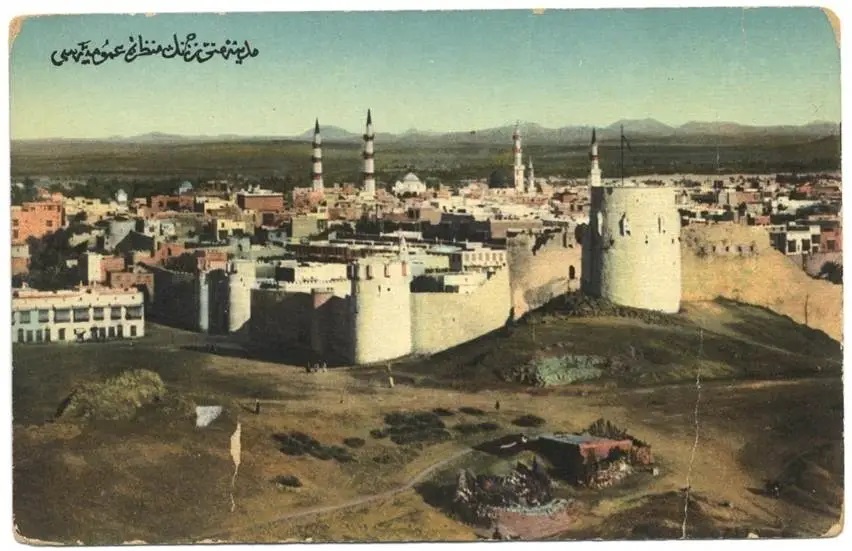
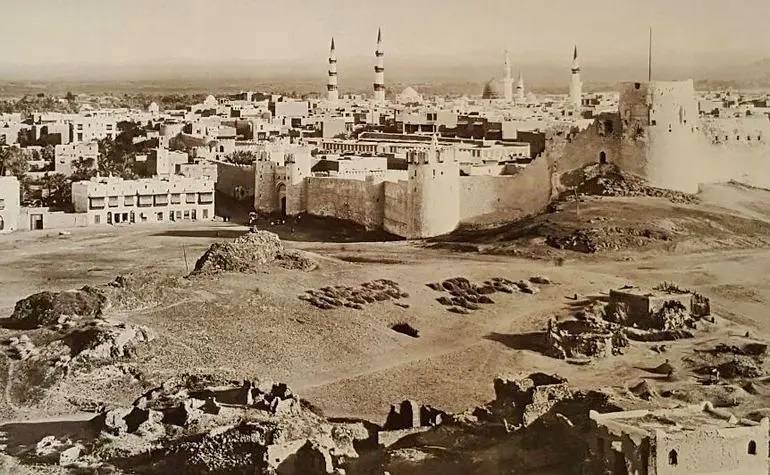
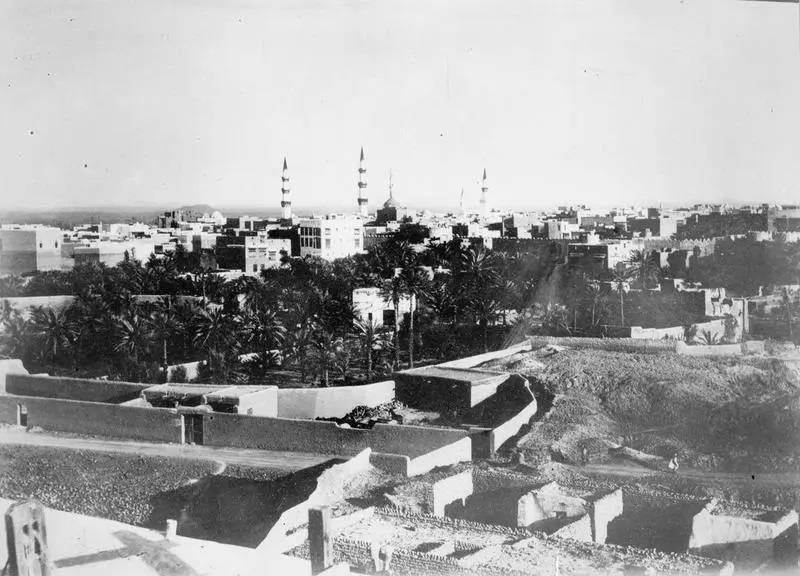
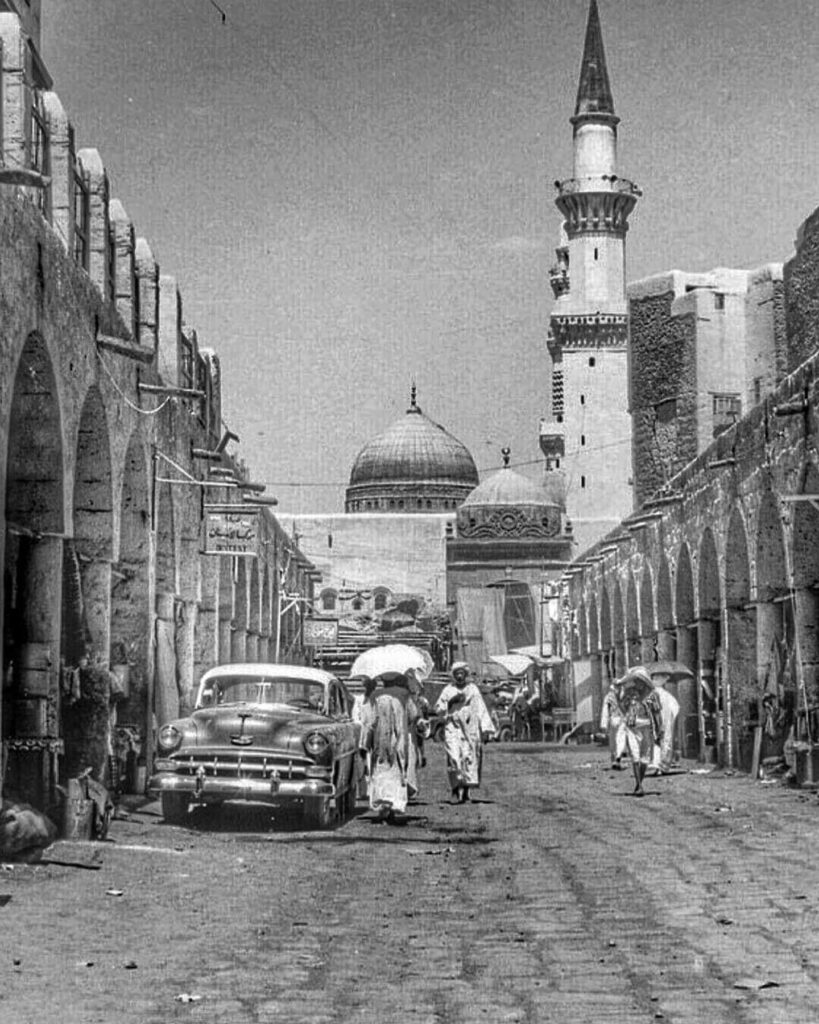
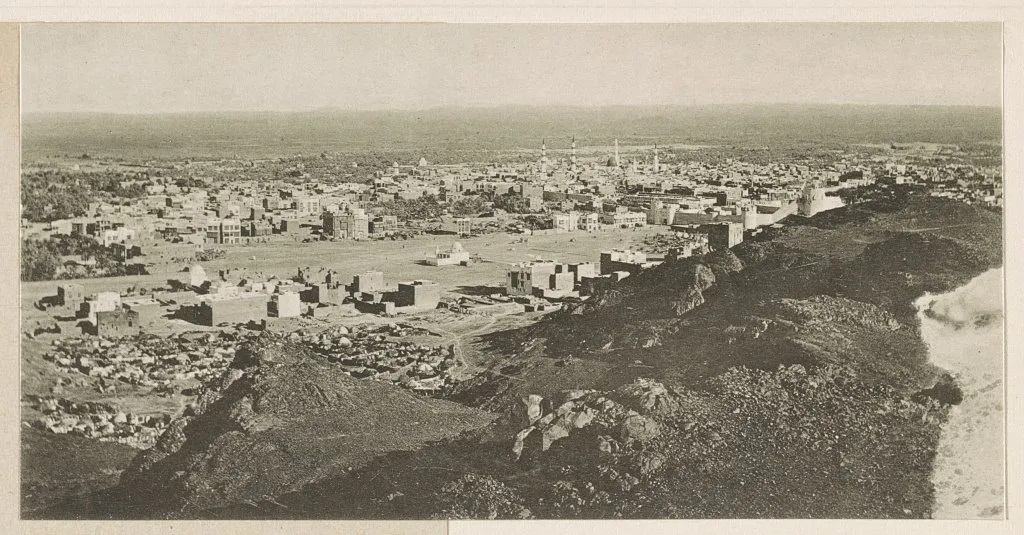
The following book has more information about Madinah and its history:
History of Madinah – Shaikh Safiur-Rahman Mubarakpuri
Here’s what it looks like at the present time:
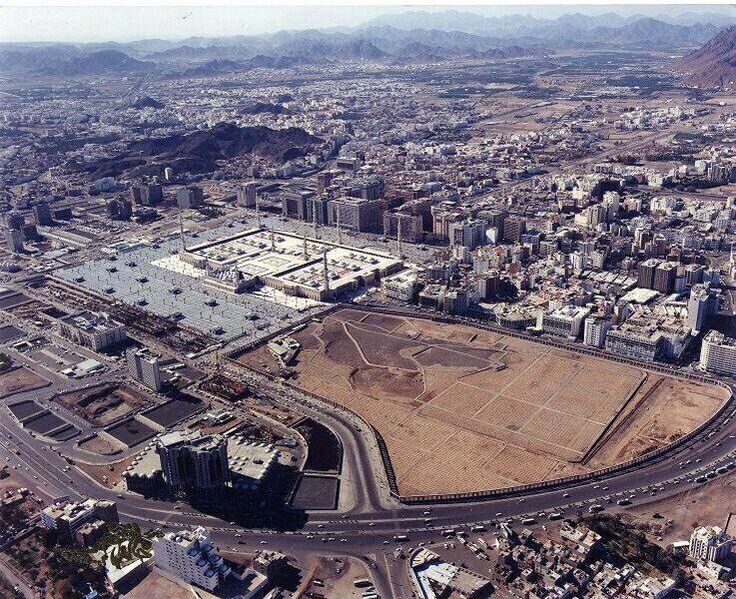
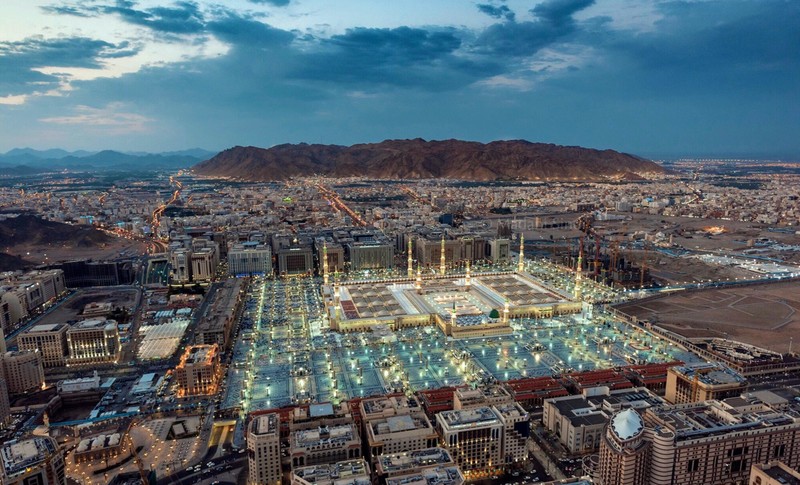 \
\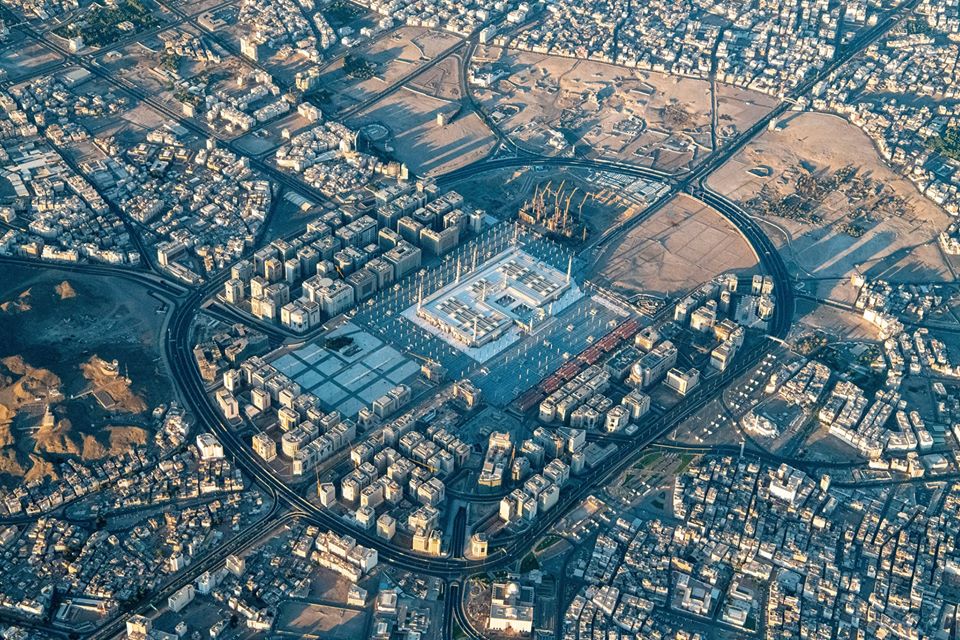
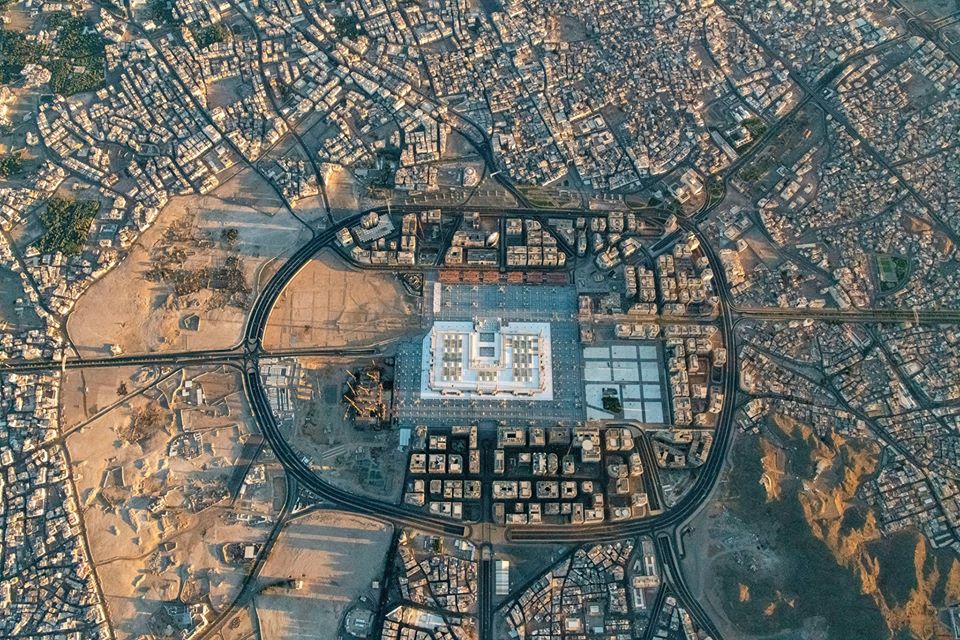
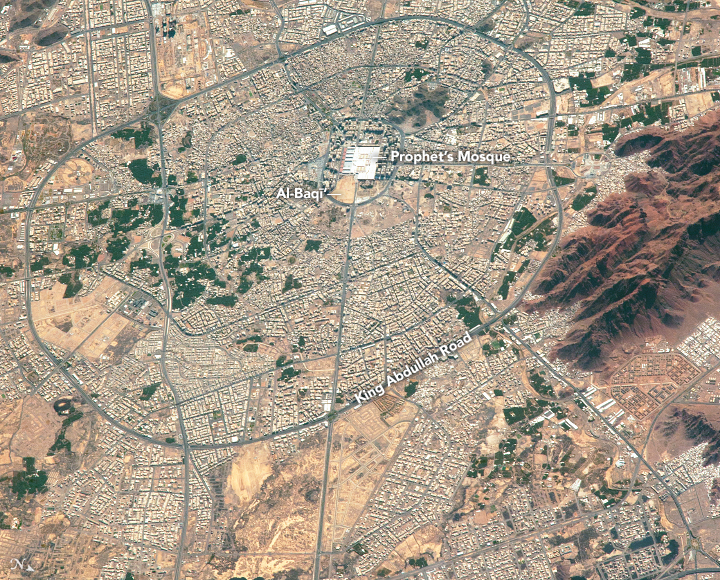
The Boundaries of Madinah
Like Makkah, Madinah is also a sanctuary. However, in the today’s time, the city of Madinah has expanded to include areas outside the Haram as well, so the whole of Madinah city in today’s time is not a sanctuary. The sanctuary is the area designated by the Prophet (sallallahu alaihi wasallam).
عَنْ إِبْرَاهِيمَ التَّيْمِيِّ، عَنْ أَبِيهِ، قَالَ قَالَ عَلِيٌّ ـ رضى الله عنه مَا عِنْدَنَا كِتَابٌ نَقْرَؤُهُ إِلاَّ كِتَابُ اللَّهِ، غَيْرَ هَذِهِ الصَّحِيفَةِ. قَالَ فَأَخْرَجَهَا فَإِذَا فِيهَا أَشْيَاءُ مِنَ الْجِرَاحَاتِ وَأَسْنَانِ الإِبِلِ. قَالَ وَفِيهَا الْمَدِينَةُ حَرَمٌ مَا بَيْنَ عَيْرٍ إِلَى ثَوْرٍ
Narrated Ibrahim At-Taymi from his father that Ali (radiallahu anhu): We have no Book to recite except the Book of Allah (Quran) and this paper. Then Ali took out the paper, and behold ! There was written in it, legal verdicts about the retaliation for wounds, the ages of the camels (to be paid as Zakah or as blood money). In it was also written: Madinah is a sanctuary from Ayr (mountain) to Thawr (mountain). [Sahih Al-Bukhari, Volume 8, Hadeeth No. 747. The full narration can be found here.]
Markers have been set up to show the haram (sanctuary) limits.
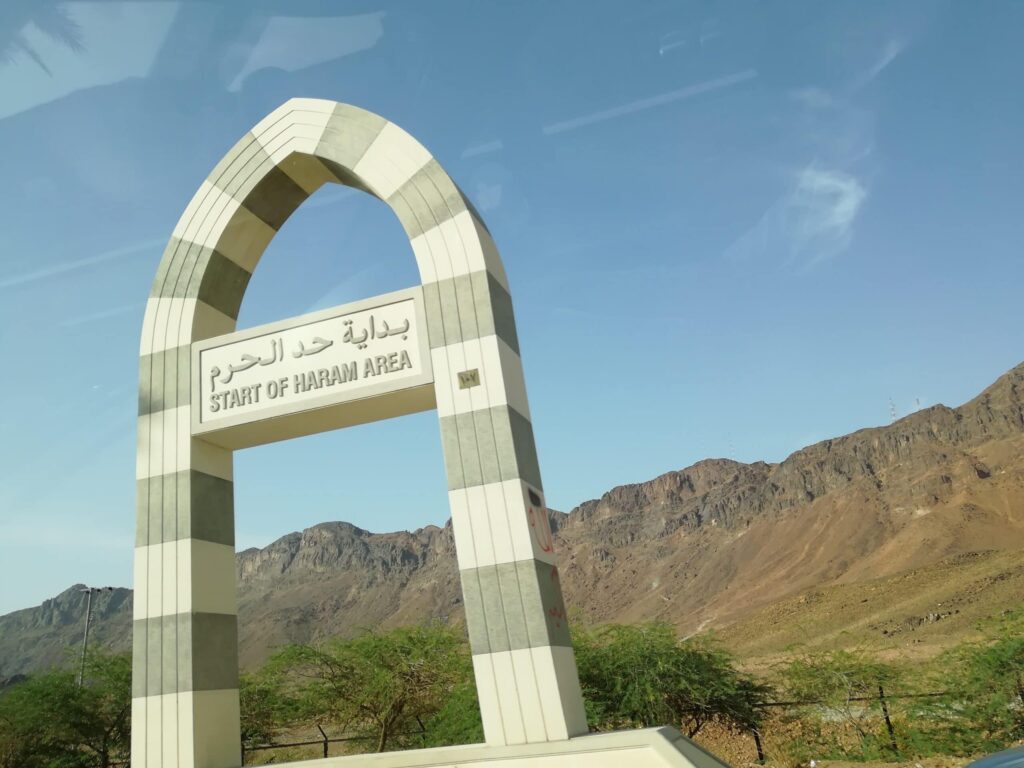
Here’s where all the markers have been set up:
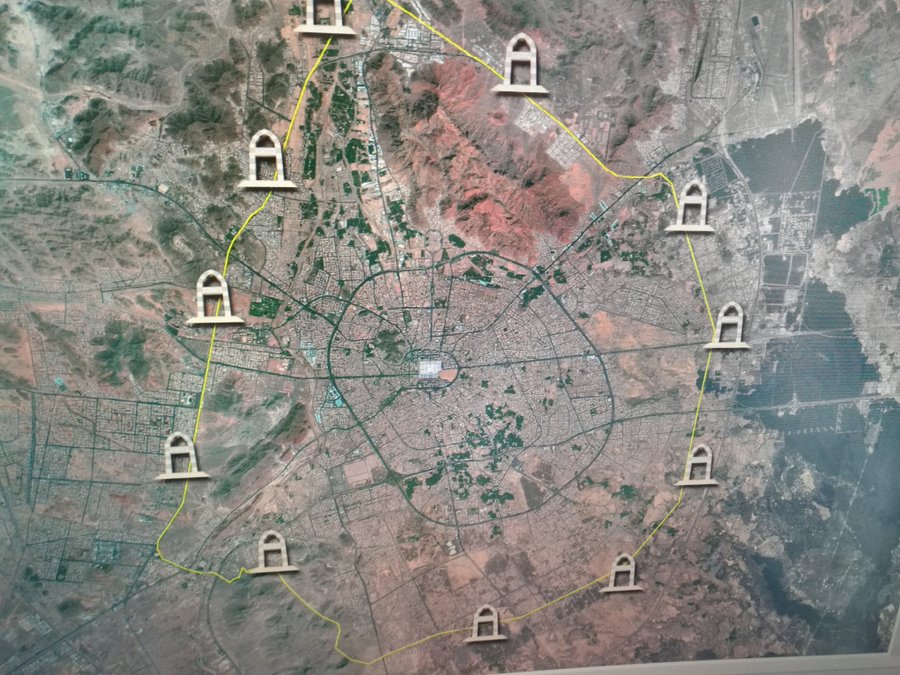
Some of Madinah’s Other Names
Madinah is some other names. Prior to the Prophet’s (sallallahu alaihi wasallam) arrival, it was called Yathrib.
عن هُرَيْرَة ـ رضى الله عنه ـ يَقُولُ قَالَ رَسُولُ اللَّهِ صلى الله عليه وسلم : أُمِرْتُ بِقَرْيَةٍ تَأْكُلُ الْقُرَى يَقُولُونَ يَثْرِبُ. وَهْىَ الْمَدِينَةُ، تَنْفِي النَّاسَ كَمَا يَنْفِي الْكِيرُ خَبَثَ الْحَدِيدِ
Narrated Abu Hurairah (radiallahu anhu): Allah’s Messenger sallallahu alaihi wasallan) said, “I was ordered to migrate to a town which will swallow (conquer) other towns and is called Yathrib and that is Madinah, and it turns out (bad) persons as a furnace removes the impurities of iron. [Sahih Al-Bukhari, Volume 3, Hadeeth No. 95]
However, one should not refer to Madinah as Yathrib anymore. Please refer to this article for more information.
Madinah is also called Taabah and Taibah.
عَنْ أَبِي حُمَيْدٍ ـ رضى الله عنه ـ أَقْبَلْنَا مَعَ النَّبِيِّ صلى الله عليه وسلم مِنْ تَبُوكَ حَتَّى أَشْرَفْنَا عَلَى الْمَدِينَةِ فَقَالَ : هَذِهِ طَابَةُ
Narrated Abu Humaid (radiallahu anhu): We came with the Prophet (sallallahu alaihi wasallam) from Tabuk, and when we reached near Madinah, the Prophet (sallallahu alaihi wasallam) said, “This is Taabah.” [Sahih Al-Nukhari, Volume 3, Hadeeth No. 96]
عَنْ زَيْدِ بْنِ ثَابِتٍ، عَنِ النَّبِيِّ صلى الله عليه وسلم قَالَ : إِنَّهَا طَيْبَةُ – يَعْنِي الْمَدِينَةَ – وَإِنَّهَا تَنْفِي الْخَبَثَ كَمَا تَنْفِي النَّارُ خَبَثَ الْفِضَّةِ
Please note that Madina’s name is actually Al-Madinah An-Nabaweeyah (the Prophet’s City), not Al-Madinah Al-Munawarah.
Virtues of Madinah
As it is in the Arabian Peninsula, Madinah shares the virtues of this region along with Makkah. You can read about the virtues of the Peninsula in Part 6 of this series.
Madinah also has virtues of its own, some of which it shares with Makkah.
1.It is a sanctuary
عَنْ عَبْدِ اللَّهِ بْنِ زَيْدٍ ـ رضى الله عنه ـ عَنِ النَّبِيِّ صلى الله عليه وسلم : أَنَّ إِبْرَاهِيمَ حَرَّمَ مَكَّةَ، وَدَعَا لَهَا، وَحَرَّمْتُ الْمَدِينَةَ كَمَا حَرَّمَ إِبْرَاهِيمُ مَكَّةَ، وَدَعَوْتُ لَهَا فِي مُدِّهَا وَصَاعِهَا، مِثْلَ مَا دَعَا إِبْرَاهِيمُ ـ عَلَيْهِ السَّلاَمُ ـ لِمَكَّةَ
Narrated Abdullah ibn Zaid (radiallahu anhu): The Prophet (sallallahu alaihi wasallam) said, “Ibrahim made Makkah a sanctuary, and asked for Allah’s blessing in it. I made Madinah a sanctuary as Ibrahim made Makkah a sanctuary and I asked for Allah’s Blessing in its measures the Mudd and the Saa (two standards of weight and measurement) as Ibrahim (alaihissalaam) did for Makkah. [Sahih Al-Bukhari, Volume 3, Hadeeth No. 339]
عَنْ عَمِّهِ عَبْدِ اللَّهِ بْنِ زَيْدِ بْنِ عَاصِمٍ، أَنَّ رَسُولَ اللَّهِ صلى الله عليه وسلم قَالَ : إِنَّ إِبْرَاهِيمَ حَرَّمَ مَكَّةَ وَدَعَا لأَهْلِهَا وَإِنِّي حَرَّمْتُ الْمَدِينَةَ كَمَا حَرَّمَ إِبْرَاهِيمُ مَكَّةَ وَإِنِّي دَعَوْتُ فِي صَاعِهَا وَمُدِّهَا بِمِثْلَىْ مَا دَعَا بِهِ إِبْرَاهِيمُ لأَهْلِ مَكَّةَ
Abdullah ibn Zaid ibn Asim (radiallahu anhu) reported Allah’s Messenger (sallallahu alaihi wasallam) as saying: Verily Ibrahim declared Makkah sacred and supplicated (for blessings to be showered) upon its inhabitants, and I declare Madinah to be sacred as lbrahim had declared Makkah to be sacred. I have supplicated (Allah for His blessings to be showered) in its saa and its mudd (two standards of weight and measurement) twice as did Ibrahim for the inhabitants of Makkah. [Sahih Muslim, Hadeeth No. 3150]
عَنْ أَنَسٍ ـ رضى الله عنه ـ عَنِ النَّبِيِّ صلى الله عليه وسلم قَالَ : الْمَدِينَةُ حَرَمٌ، مِنْ كَذَا إِلَى كَذَا، لاَ يُقْطَعُ شَجَرُهَا، وَلاَ يُحْدَثُ فِيهَا حَدَثٌ، مَنْ أَحْدَثَ حَدَثًا فَعَلَيْهِ لَعْنَةُ اللَّهِ وَالْمَلاَئِكَةِ وَالنَّاسِ أَجْمَعِينَ
Narrated Anas (radiallahu anhu): The Prophet (sallallahu alaihi wasallam) said, “Madinah is a sanctuary from that place to that. Its trees should not be cut and no heresy should be innovated nor any sin should be committed in it, and whoever innovates in it an heresy or commits sins (bad deeds), then he will incur the curse of Allah, the angels, and all the people.” [Sahih Al-Bukhari, Volume 3, Hadeeth No. 91]
عن عَاصِم، قَالَ قُلْتُ لأَنَسٍ أَحَرَّمَ رَسُولُ اللَّهِ صلى الله عليه وسلم الْمَدِينَةَ. قَالَ نَعَمْ مَا بَيْنَ كَذَا إِلَى كَذَا، لاَ يُقْطَعُ شَجَرُهَا، مَنْ أَحْدَثَ فِيهَا حَدَثًا فَعَلَيْهِ لَعْنَةُ اللَّهِ وَالْمَلاَئِكَةِ وَالنَّاسِ أَجْمَعِينَ. قَالَ عَاصِمٌ فَأَخْبَرَنِي مُوسَى بْنُ أَنَسٍ أَنَّهُ قَالَ أَوْ آوَى مُحْدِثًا.
Narrated Asim: I said to Anas, “Did Allah’s Messenger (sallallahu alaihi wasallam) make Madinah a sanctuary?” He replied, “Yes, (Madinah is a sanctuary) from such-and-such place to such-and-such place. It is forbidden to cut its trees, and whoever innovates an heresy in it or commits a sin therein, will incur the curse of Allah, the angels, and all the people.” Then Musa bin Anas told me that Anas added, “….. or gives refuge to such an heretic or a sinner…” [Sahih Al-Bukhari, Volume 9, Hadeeth No. 409]
2. The Prophet (sallallahu alaihi wasallam) supplicated for it to be blessed
عَنْ أَبِي هُرَيْرَةَ، أَنَّهُ قَالَ كَانَ النَّاسُ إِذَا رَأَوْا أَوَّلَ الثَّمَرِ جَاءُوا بِهِ إِلَى النَّبِيِّ صلى الله عليه وسلم فَإِذَا أَخَذَهُ رَسُولُ اللَّهِ صلى الله عليه وسلم قَالَ : اللَّهُمَّ بَارِكْ لَنَا فِي ثَمَرِنَا وَبَارِكْ لَنَا فِي مَدِينَتِنَا وَبَارِكْ لَنَا فِي صَاعِنَا وَبَارِكْ لَنَا فِي مُدِّنَا اللَّهُمَّ إِنَّ إِبْرَاهِيمَ عَبْدُكَ وَخَلِيلُكَ وَنَبِيُّكَ وَإِنِّي عَبْدُكَ وَنَبِيُّكَ وَإِنَّهُ دَعَاكَ لِمَكَّةَ وَإِنِّي أَدْعُوكَ لِلْمَدِينَةِ بِمِثْلِ مَا دَعَاكَ لِمَكَّةَ وَمِثْلِهِ مَعَهُ . قَالَ ثُمَّ يَدْعُو أَصْغَرَ وَلِيدٍ لَهُ فَيُعْطِيهِ ذَلِكَ الثَّمَرَ
Abu Hurairah (radiallahu anhu) reported that when the people saw the first fruit (of the season or of plantation) they brought it to Allah’s Messenger (sallallahu alaihi wasallam). When he received it he said: “O Allah, bless us in our fruits; and bless us in our city; and bless us in our saa and bless us in our mudd. O Allah, Ibrahim was Your servant, Your close friend, and Your Prophet; and I am Your servant and Your Prophet. He (Ibrahim) made supplication to You for (the showering of blessings upon) Makkah, and I am making supplication to You for Madinah just as he made supplication to You for Makkah and the like of it in addition.”
He would then call to him the youngest child and give him these fruits. [Sahih Muslim, Hadeeth No. 3170]
عَنْ أَنَسٍ ـ رضى الله عنه ـ عَنِ النَّبِيِّ صلى الله عليه وسلم قَالَ : اللَّهُمَّ اجْعَلْ بِالْمَدِينَةِ ضِعْفَىْ مَا جَعَلْتَ بِمَكَّةَ مِنَ الْبَرَكَةِ
Narrated Anas (radiallahu anhu): The Prophet (sallallahu alaihi wasallam) said, “O Allah! Bestow on Madinah twice the blessings You bestowed on Makkah.” [Sahih Al-Bukhari, Volume 3, Hadeeth No. 109]
عَنْ عَمِّهِ عَبْدِ اللَّهِ بْنِ زَيْدِ بْنِ عَاصِمٍ، أَنَّ رَسُولَ اللَّهِ صلى الله عليه وسلم قَالَ : إِنَّ إِبْرَاهِيمَ حَرَّمَ مَكَّةَ وَدَعَا لأَهْلِهَا وَإِنِّي حَرَّمْتُ الْمَدِينَةَ كَمَا حَرَّمَ إِبْرَاهِيمُ مَكَّةَ وَإِنِّي دَعَوْتُ فِي صَاعِهَا وَمُدِّهَا بِمِثْلَىْ مَا دَعَا بِهِ إِبْرَاهِيمُ لأَهْلِ مَكَّةَ
Abdullah ibn Zaid ibn Asim (radiallahu anhu) reported Allah’s Messenger (sallallahu alaihi wasallam) as saying: Verily Ibrahim declared Makkah sacred and supplicated (for blessings to be showered) upon its inhabitants, and I declare Madinah to be sacred as lbrahim had declared Makkah to be sacred. I have supplicated (Allah for His blessings to be showered) in its saa and its mudd (two standards of weight and measurement) twice as did Ibrahim for the inhabitants of Makkah. [Sahih Muslim, Hadeeth No. 3150]
عَنْ أَنَسِ بْنِ مَالِكٍ، أَنَّ رَسُولَ اللَّهِ صلى الله عليه وسلم قَالَ : اللَّهُمَّ بَارِكْ لَهُمْ فِي مِكْيَالِهِمْ وَبَارِكْ لَهُمْ فِي صَاعِهِمْ وَبَارِكْ لَهُمْ فِي مُدِّهِمْ
Anas ibn Malik (radiallahu anhu) reported that Allah’s Messenger (sallallahu alaihi wasallam) said: Allah bless them in their measurements, bless them in their saa and bless them in their mudd. [Sahih Muslim, Hadeeth No. 3161]
عَنْ أَبِي سَعِيدٍ الْخُدْرِيِّ، أَنَّ رَسُولَ اللَّهِ صلى الله عليه وسلم قَالَ : اللَّهُمَّ بَارِكْ لَنَا فِي صَاعِنَا وَمُدِّنَا وَاجْعَلْ مَعَ الْبَرَكَةِ بَرَكَتَيْنِ
Abu Saeed Al-Khudri (radiallahu anhu) reported that Allah’s Messenger (sallallahu alaihi wasallam) said: O Allah, bless us in our saa and mud and shower with its blessings two other blessings (multiply blessings showered upon it).” [Sahih Muslim, Hadeeth No. 3173]
3. It is a place of safety
عَنْ سَهْلِ بْنِ حُنَيْفٍ، قَالَ أَهْوَى رَسُولُ اللَّهِ صلى الله عليه وسلم بِيَدِهِ إِلَى الْمَدِينَةِ فَقَالَ : إِنَّهَا حَرَمٌ آمِنٌ
Sahl ibn Hunaif (radiallahu anhu) reported that Allah’s Messenger (sallallahu alaihi wasallam) pointed with his hands towards Madinah and said: That is a sacred territory and a place of safety. [Sahih Muslim, Hadeeth No. 3177]
4. The Prophet (sallallahu alaihi wasallam) loved Madinah and prayed that others would love Madinah
عَنْ أَنَسٍ ـ رضى الله عنه ـ أَنَّ النَّبِيَّ صلى الله عليه وسلم كَانَ إِذَا قَدِمَ مِنْ سَفَرٍ، فَنَظَرَ إِلَى جُدُرَاتِ الْمَدِينَةِ أَوْضَعَ رَاحِلَتَهُ، وَإِنْ كَانَ عَلَى دَابَّةٍ، حَرَّكَهَا مِنْ حُبِّهَا
Narrated Anas (radiallahu anhu): Whenever the Prophet (sallallahu alaihi wasallam) returned from a journey and observed the walls of Madinah, he would make his Mount go fast, and if he was on an animal (i.e. a horse), he would make it gallop because of his love for Madinah. [Sahih Al-Bukhari, Volume 3, Hadeeth No. 110]
عَنْ عَائِشَةَ ـ رضى الله عنها ـ قَالَتْ لَمَّا قَدِمَ رَسُولُ اللَّهِ صلى الله عليه وسلم الْمَدِينَةَ وُعِكَ أَبُو بَكْرٍ وَبِلاَلٌ، فَكَانَ أَبُو بَكْرٍ إِذَا أَخَذَتْهُ الْحُمَّى يَقُولُ كُلُّ امْرِئٍ مُصَبَّحٌ فِي أَهْلِهِ وَالْمَوْتُ أَدْنَى مِنْ شِرَاكِ نَعْلِهِ وَكَانَ بِلاَلٌ إِذَا أُقْلِعَ عَنْهُ الْحُمَّى يَرْفَعُ عَقِيرَتَهُ يَقُولُ أَلاَ لَيْتَ شِعْرِي هَلْ أَبِيتَنَّ لَيْلَةً بِوَادٍ وَحَوْلِي إِذْخِرٌ وَجَلِيلُ وَهَلْ أَرِدَنْ يَوْمًا مِيَاهَ مَجَنَّةٍ وَهَلْ يَبْدُوَنْ لِي شَامَةٌ وَطَفِيلُ قَالَ اللَّهُمَّ الْعَنْ شَيْبَةَ بْنَ رَبِيعَةَ، وَعُتْبَةَ بْنَ رَبِيعَةَ، وَأُمَيَّةَ بْنَ خَلَفٍ، كَمَا أَخْرَجُونَا مِنْ أَرْضِنَا إِلَى أَرْضِ الْوَبَاءِ ثُمَّ قَالَ رَسُولُ اللَّهِ صلى الله عليه وسلم : اللَّهُمَّ حَبِّبْ إِلَيْنَا الْمَدِينَةَ كَحُبِّنَا مَكَّةَ أَوْ أَشَدَّ، اللَّهُمَّ بَارِكْ لَنَا فِي صَاعِنَا، وَفِي مُدِّنَا، وَصَحِّحْهَا لَنَا وَانْقُلْ حُمَّاهَا إِلَى الْجُحْفَةِ . قَالَتْ وَقَدِمْنَا الْمَدِينَةَ، وَهْىَ أَوْبَأُ أَرْضِ اللَّهِ. قَالَتْ فَكَانَ بُطْحَانُ يَجْرِي نَجْلاً. تَعْنِي مَاءً آجِنًا
Narrated Aishah (radiallahu anha): When Allah’s Messenger (sallallahu alaihi wasallam) reached Madinah, Abu Bakr and Bilal became ill. When Abu Bakr’s fever got worse, he would recite (this poetic verse): “Everybody is staying alive with his people, yet death is nearer to him than his shoe laces.” And Bilal, when his fever deserted him, would recite: “Would that I could stay overnight in s valley wherein I would be surrounded by idhkhir and Jalil (kinds of good smelling grass). Would that one day I could drink the water of the Majanna, and would that (the two mountains) Shama and Tafil would appear to me!” The Prophet (sallallahu alaihi wasallam) said, “O Allah! Curse Shaiba bin Rabiah and Utbah bin Rabiah and Umaiyah bin Khalaf as they turned us out of our land to the land of epidemics.” Allah’s Messenger (sallallahu alaihi wasallam) then said, “O Allah! Make us love Madinah as we love Makkah or even more than that. O Allah! Give blessings in our Sa and our Mudd (measures symbolizing food) and make the climate of Madinah suitable for us, and divert its fever towards Al Juhfah.” Aishah added: When we reached Madinah, it was the most unhealthy of Allah’s lands, and the valley of Bathan (the valley of Madinah) used to flow with impure colored water. [Sahih Al-Bukhari, Volume 3, Hadeeth No. 113]
Many people seem to love Madinah more than Makkah, even though Makkah is greater than Madinah. Shaikh Saleh As-Suhaymee explains this issue using the above mentioned hadeeth.
5. Dajjal will not be able to enter it
عَنْ أَبِي بَكْرَةَ ـ رضى الله عنه ـ عَنِ النَّبِيِّ صلى الله عليه وسلم قَالَ : لاَ يَدْخُلُ الْمَدِينَةَ رُعْبُ الْمَسِيحِ الدَّجَّالِ، لَهَا يَوْمَئِذٍ سَبْعَةُ أَبْوَابٍ، عَلَى كُلِّ باب مَلَكَانِ
عن أَنَسُ بْنُ مَالِكٍ ـ رضى الله عنه ـ عَنِ النَّبِيِّ صلى الله عليه وسلم قَالَ : لَيْسَ مِنْ بَلَدٍ إِلاَّ سَيَطَؤُهُ الدَّجَّالُ، إِلاَّ مَكَّةَ وَالْمَدِينَةَ، لَيْسَ لَهُ مِنْ نِقَابِهَا نَقْبٌ إِلاَّ عَلَيْهِ الْمَلاَئِكَةُ صَافِّينَ، يَحْرُسُونَهَا، ثُمَّ تَرْجُفُ الْمَدِينَةُ بِأَهْلِهَا ثَلاَثَ رَجَفَاتٍ، فَيُخْرِجُ اللَّهُ كُلَّ كَافِرٍ وَمُنَافِقٍ
Narrated Anas ibn Malik (radiallahu anhu): The Prophet (sallallahu alaihi wasallam) said, “There will be no town which Ad-Dajjal will not enter except Makkah and Madinah, and there will be no entrance (road) (of both Makkah and Madinah) but the angels will be standing in rows guarding it against him, and then Madinah will shake with its inhabitants thrice (i.e. three earthquakes will take place) and Allah will expel all the non-believers and the hypocrites from it.” [Sahih Al-Bukhari, Volume 3, Hadeeth No. 105]
عن أَبي سَعِيد الْخُدْرِيَّ ـ رضى الله عنه ـ قَالَ حَدَّثَنَا رَسُولُ اللَّهِ صلى الله عليه وسلم حَدِيثًا طَوِيلاً عَنِ الدَّجَّالِ، فَكَانَ فِيمَا حَدَّثَنَا بِهِ أَنْ قَالَ : يَأْتِي الدَّجَّالُ ـ وَهُوَ مُحَرَّمٌ عَلَيْهِ أَنْ يَدْخُلَ نِقَابَ الْمَدِينَةِ ـ بَعْضَ السِّبَاخِ الَّتِي بِالْمَدِينَةِ، فَيَخْرُجُ إِلَيْهِ يَوْمَئِذٍ رَجُلٌ، هُوَ خَيْرُ النَّاسِ ـ أَوْ مِنْ خَيْرِ النَّاسِ ـ فَيَقُولُ أَشْهَدُ أَنَّكَ الدَّجَّالُ، الَّذِي حَدَّثَنَا عَنْكَ رَسُولُ اللَّهِ صلى الله عليه وسلم حَدِيثَهُ، فَيَقُولُ الدَّجَّالُ أَرَأَيْتَ إِنْ قَتَلْتُ هَذَا ثُمَّ أَحْيَيْتُهُ، هَلْ تَشُكُّونَ فِي الأَمْرِ فَيَقُولُونَ لاَ. فَيَقْتُلُهُ، ثُمَّ يُحْيِيهِ فَيَقُولُ حِينَ يُحْيِيهِ وَاللَّهِ مَا كُنْتُ قَطُّ أَشَدَّ بَصِيرَةً مِنِّي الْيَوْمَ، فَيَقُولُ الدَّجَّالُ أَقْتُلُهُ فَلاَ أُسَلَّطُ عَلَيْهِ
Narrated Abu Saeed Al-Khudri (radiallahu anhu): Allah’s Messenger (sallallahu alaihi wasallam) told us a long narrative about Ad-Dajjal, and among the many things he mentioned, was his saying, “Ad-Dajjal will come and it will be forbidden for him to pass through the entrances of Madinah. He will land in some of the salty barren areas (outside) Madinah; on that day the best man or one of the best men will come up to him and say, ‘I testify that you are the same Dajjal whose description was given to us by Allah’s Messenger (sallallahu alaihi wasallam) .’ Ad-Dajjal will say to the people, ‘If I kill this man and bring him back to life again, will you doubt my claim?’ They will say, ‘No.’ Then Ad-Dajjal will kill that man and bring him back to life. That man will say, ‘Now I know your reality better than before.’ Ad-Dajjal will say, ‘I want to kill him but I cannot.’ “ [Sahih Al-Bukhari, Volume 3, Hadeeth No. 106]
عَنْ أَبِي هُرَيْرَةَ، أَنَّ رَسُولَ اللَّهِ صلى الله عليه وسلم قَالَ : يَأْتِي الْمَسِيحُ مِنْ قِبَلِ الْمَشْرِقِ هِمَّتُهُ الْمَدِينَةُ حَتَّى يَنْزِلَ دُبُرَ أُحُدٍ ثُمَّ تَصْرِفُ الْمَلاَئِكَةُ وَجْهَهُ قِبَلَ الشَّامِ وَهُنَالِكَ يَهْلِكُ
Abu Hurairah (radiallahu anhu) reported Allah’s Messenger (sallallahu alaihi wasallam) as saying: Dajjal will come from the eastern side with the intention of attacking Madinah until he will get down behind Uhud. Then the angels will turn his face towards Syria and there he will perish. [Sahih Muslim, Hadeeth No. 3187]
6. The Plague will not be able to enter Madinah
عَنْ أَبِي هُرَيْرَةَ ـ رضى الله عنه ـ قَالَ قَالَ رَسُولُ اللَّهِ صلى الله عليه وسلم. : عَلَى أَنْقَابِ الْمَدِينَةِ مَلاَئِكَةٌ، لاَ يَدْخُلُهَا الطَّاعُونُ وَلاَ الدَّجَّالُ
Narrated Abu Hurairah (radiallahu anhu): Allah’s Messenger (sallallahu alaihi wasallam) said, “There are angels guarding the entrances (or roads) of Madinah, neither plague nor Ad-Dajjal will be able to enter it.” [Sahih Al-Bukhari, Volume 3, Hadeeth No. 104]
The plague (Taoon) referred to in this hadeeth might be referring to the bubonic plague (Black Death) and those caused by the same strain of bacteria. This bacteria caused multiple pandemics throughout history, it seems.
Prior to Covid, I (and many others) were under the impression that plague was a general term only to discover that the general term was epidemic. The Plague is a type of epidemic.
Here are two articles that explain this issue in more detail:
Are Makkah and Madinah protected from the plague and pandemics such as swine flu? – Islam QA
Can COVID-19 enter Makkah and Madinah? – Brother Farhan Ali Khan
And here are two diagrams from this article (please be wary regarding the shirk) that discuss all the major epidemics in history along with their death tolls. The article mentions the virus or bacteria that caused each pandemic.
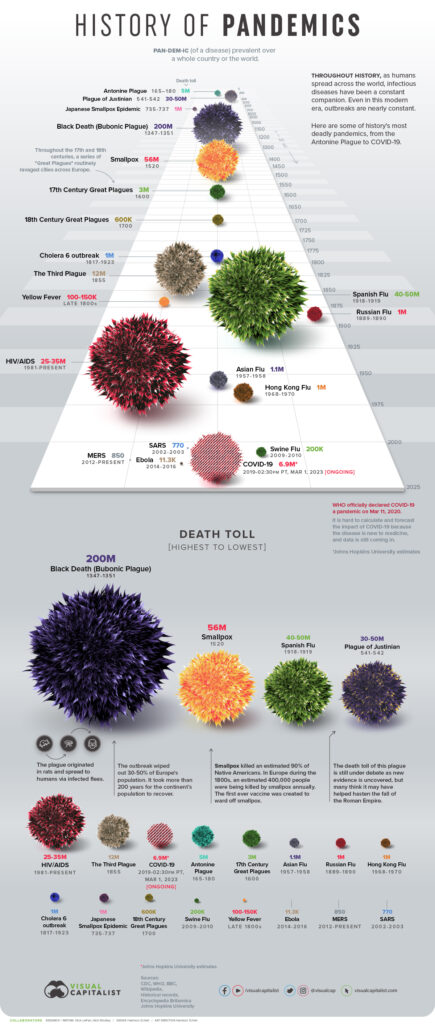
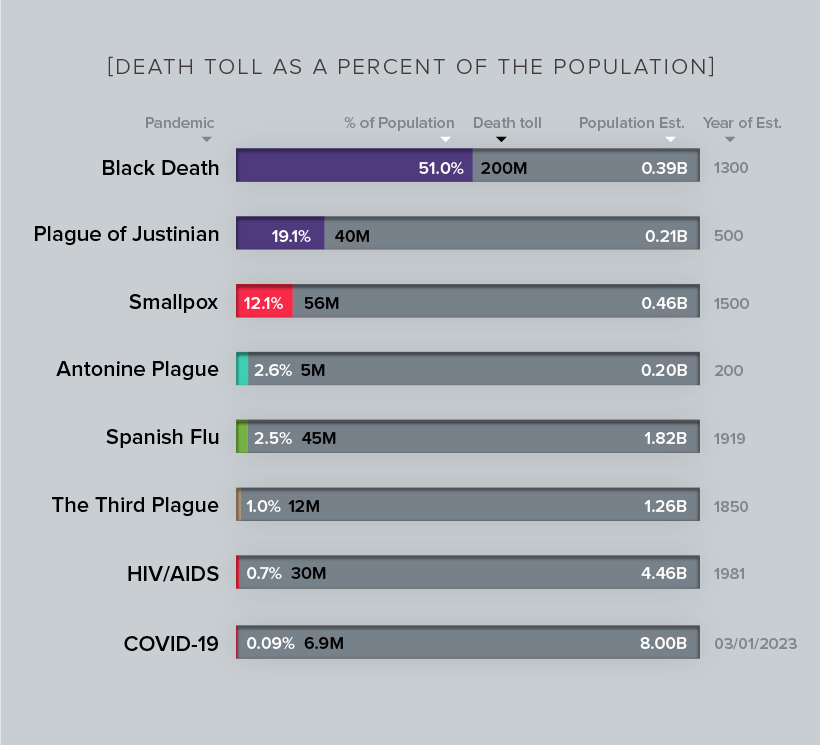
Truly, we should be grateful to Allah that we only saw Covid and not Black Death.
7. Iman (faith) returns back to Madinah
عَنْ أَبِي هُرَيْرَةَ ـ رضى الله عنه ـ أَنَّ رَسُولَ اللَّهِ صلى الله عليه وسلم قَالَ : إِنَّ الإِيمَانَ لَيَأْرِزُ إِلَى الْمَدِينَةِ كَمَا تَأْرِزُ الْحَيَّةُ إِلَى جُحْرِهَا
Here’s a short article on the meaning of this hadeeth.
8. Those who hold ill-will or plot against the people of Madinah will be destroyed
عن عَامِر بْن سَعْدِ بْنِ أَبِي وَقَّاصٍ، عَنْ أَبِيهِ، أَنَّ رَسُولَ اللَّهِ صلى الله عليه وسلم قَالَ . ثُمَّ ذَكَرَ مِثْلَ حَدِيثِ ابْنِ نُمَيْرٍ وَزَادَ فِي الْحَدِيثِ : وَلاَ يُرِيدُ أَحَدٌ أَهْلَ الْمَدِينَةِ بِسُوءٍ إِلاَّ أَذَابَهُ اللَّهُ فِي النَّارِ ذَوْبَ الرَّصَاصِ أَوْ ذَوْبَ الْمِلْحِ فِي الْمَاءِ
Amir bin Saad bin Abee Waqqas reported on the authority of his father that Allah’s Messenger (sallallahu alaihi wasallam) said, and then the (above-mentioned) hadith was narrated with this addition: “None should nurse ill-will towards the people of Madinah, or Allah will melt him in fire like the melting of lead or the dissolution of salt in water. [Sahih Muslim, Hadeeth No. 3155. The other hadeeth being referred to is this one.]
عَنْ سَعْد ـ رضى الله عنه ـ قَالَ سَمِعْتُ النَّبِيَّ صلى الله عليه وسلم يَقُولُ :لاَ يَكِيدُ أَهْلَ الْمَدِينَةِ أَحَدٌ إِلاَّ انْمَاعَ كَمَا يَنْمَاعُ الْمِلْحُ فِي الْمَاءِ
Narrated Saad (radiallahu anhu): I heard the Prophet (sallallahu alaihi wasallam) saying, “None plots against the people of Madinah but that he will be dissolved (destroyed) like the salt is dissolved in water.” [Sahih Al-Bukhari, Volume 3, Hadeeth No. 101]
9. One should try to live in Madinah and not leave it
Those who stay in Madinah despite any hardship will be interceded for by the Prophet (sallallahu alaihi wasallam) on the Last Day.
عن عَامِر بْن سَعْد، عَنْ أَبِيهِ، قَالَ قَالَ رَسُولُ اللَّهِ صلى الله عليه وسلم : إِنِّي أُحَرِّمُ مَا بَيْنَ لاَبَتَىِ الْمَدِينَةِ أَنْ يُقْطَعَ عِضَاهُهَا أَوْ يُقْتَلَ صَيْدُهَا – وَقَالَ – الْمَدِينَةُ خَيْرٌ لَهُمْ لَوْ كَانُوا يَعْلَمُونَ لاَ يَدَعُهَا أَحَدٌ رَغْبَةً عَنْهَا إِلاَّ أَبْدَلَ اللَّهُ فِيهَا مَنْ هُوَ خَيْرٌ مِنْهُ وَلاَ يَثْبُتُ أَحَدٌ عَلَى لأْوَائِهَا وَجَهْدِهَا إِلاَّ كُنْتُ لَهُ شَفِيعًا أَوْ شَهِيدًا يَوْمَ الْقِيَامَةِ
Amir bin Saad reported on the authority of his father that Allah’s Messenger (sallallahu alaihi wasallam) said: I have declared sacred the territory between the two lava plains of Madinah, so its trees should not be cut down, or its game killed; and he also said: Madinah is best for them if they knew. No one leaves it through dislike of it without Allah putting in it someone better than he in place of him; and no one will stay there in spite of its hardships and distress without my being an intercessor or witness on behalf of him on the Day of Resurrection. [Sahih Muslim, Hadeeth No. 3154]
عَنْ أَبِي سَعِيدٍ، مَوْلَى الْمَهْرِيِّ أَنَّهُ جَاءَ أَبَا سَعِيدٍ الْخُدْرِيَّ لَيَالِيَ الْحَرَّةِ فَاسْتَشَارَهُ فِي الْجَلاَءِ مِنَ الْمَدِينَةِ وَشَكَا إِلَيْهِ أَسْعَارَهَا وَكَثْرَةَ عِيَالِهِ وَأَخْبَرَهُ أَنْ لاَ صَبْرَ لَهُ عَلَى جَهْدِ الْمَدِينَةِ وَلأْوَائِهَا . فَقَالَ لَهُ وَيْحَكَ لاَ آمُرُكَ بِذَلِكَ إِنِّي سَمِعْتُ رَسُولَ اللَّهِ صلى الله عليه وسلم يَقُولُ : لاَ يَصْبِرُ أَحَدٌ عَلَى لأْوَائِهَا فَيَمُوتَ إِلاَّ كُنْتُ لَهُ شَفِيعًا أَوْ شَهِيدًا يَوْمَ الْقِيَامَةِ إِذَا كَانَ مُسْلِمًا
The Prophet (sallallahu alaihi wasallam) did not like to see Madinah vacated.
عَنْ أَنَسٍ ـ رضى الله عنه ـ قَالَ أَرَادَ بَنُو سَلِمَةَ أَنْ يَتَحَوَّلُوا، إِلَى قُرْبِ الْمَسْجِدِ، فَكَرِهَ رَسُولُ اللَّهِ صلى الله عليه وسلم أَنْ تُعْرَى الْمَدِينَةُ، وَقَالَ : يَا بَنِي سَلِمَةَ. أَلاَ تَحْتَسِبُونَ آثَارَكُمْ . فَأَقَامُوا.
Narrated Anas (radiallahu anhu): (The people of) Bani Salama intended to shift near the mosque (of the Prophet) but Allah’s Messenger (sallallahu alaihi wasallam) disliked to see Madinah vacated and said, “O the people of Bani Salama! Don’t you think that you will be rewarded for your footsteps which you take towards the mosque?” So, they stayed at their old places. [Sahih Al-Bukhari, Volume 3, Hadeeth No. 111]
عَنْ سُفْيَانَ بْنِ أَبِي زُهَيْرٍ ـ رضى الله عنه ـ أَنَّهُ قَالَ سَمِعْتُ رَسُولَ اللَّهِ صلى الله عليه وسلم يَقُولُ : تُفْتَحُ الْيَمَنُ فَيَأْتِي قَوْمٌ يُبِسُّونَ، فَيَتَحَمَّلُونَ بِأَهْلِيهِمْ وَمَنْ أَطَاعَهُمْ، وَالْمَدِينَةُ خَيْرٌ لَهُمْ لَوْ كَانُوا يَعْلَمُونَ، وَتُفْتَحُ الشَّأْمُ، فَيَأْتِي قَوْمٌ يُبِسُّونَ فَيَتَحَمَّلُونَ بِأَهْلِيهِمْ وَمَنْ أَطَاعَهُمْ، وَالْمَدِينَةُ خَيْرٌ لَهُمْ لَوْ كَانُوا يَعْلَمُونَ، وَتُفْتَحُ الْعِرَاقُ، فَيَأْتِي قَوْمٌ يُبِسُّونَ فَيَتَحَمَّلُونَ بِأَهْلِيهِمْ وَمَنْ أَطَاعَهُمْ. وَالْمَدِينَةُ خَيْرٌ لَهُمْ لَوْ كَانُوا يَعْلَمُونَ
Narrated Sufyan ibn Abee Zuhair (radiallahu anhu): I heard Allah’s Messenger (sallallahu alaihi wasallam) saying, “Yemen will be conquered and some people will migrate (from Madinah) and will urge their families, and those who will obey them to migrate (to Yemen) although Madinah will be better for them; if they but knew. Sham will also be conquered and some people will migrate (from Madinah) and will urge their families and those who will obey them, to migrate (to Sham) although Madinah will be better for them; if they but knew. Iraq will be conquered and some people will migrate (from Madinah) and will urge their families and those who will obey them to migrate (to Iraq) although Madinah will be better for them; if they but knew.” [Sahih Al-Bukhari, Volume 3, Hadeeth No. 99]
عَنْ أَبِي هُرَيْرَةَ، أَنَّ رَسُولَ اللَّهِ صلى الله عليه وسلم قَالَ : يَأْتِي عَلَى النَّاسِ زَمَانٌ يَدْعُو الرَّجُلُ ابْنَ عَمِّهِ وَقَرِيبَهُ هَلُمَّ إِلَى الرَّخَاءِ هَلُمَّ إِلَى الرَّخَاءِ وَالْمَدِينَةُ خَيْرٌ لَهُمْ لَوْ كَانُوا يَعْلَمُونَ وَالَّذِي نَفْسِي بِيَدِهِ لاَ يَخْرُجُ مِنْهُمْ أَحَدٌ رَغْبَةً عَنْهَا إِلاَّ أَخْلَفَ اللَّهُ فِيهَا خَيْرًا مِنْهُ أَلاَ إِنَّ الْمَدِينَةَ كَالْكِيرِ تُخْرِجُ الْخَبِيثَ . لاَ تَقُومُ السَّاعَةُ حَتَّى تَنْفِيَ الْمَدِينَةُ شِرَارَهَا كَمَا يَنْفِي الْكِيرُ خَبَثَ الْحَدِيدِ
Abu Hurairah (radiallahu anhu) reported Allah’s Messenger (sallallahu alaihi wasallam) as saying: A time will come for the people (of Madinah) when a man will invite his cousin and any other near relation: Come (and settle) at (a place) where living is cheap, come to where there is plenty, but Madinah will be better for them; would they know it! By Him in Whose Hand is my life, none amongst them would go out (of the city) with a dislike for it, but Allah would make his successor in it someone better than be. Behold. Madinah is like furnace which eliminates from it the impurities. And the Last Hour will not come until Madinah banishes its evils just as a furnace eliminates the impurities of iron. [Sahih Muslim, Hadeeth No. 3188]
Sadly, Madinah will be completely abandoned at the end.
عن أَبي هُرَيْرَة ـ رضى الله عنه ـ قَالَ سَمِعْتُ رَسُولَ اللَّهِ صلى الله عليه وسلم يَقُولُ : يَتْرُكُونَ الْمَدِينَةَ عَلَى خَيْرِ مَا كَانَتْ، لاَ يَغْشَاهَا إِلاَّ الْعَوَافِ ـ يُرِيدُ عَوَافِيَ السِّبَاعِ وَالطَّيْرِ ـ وَآخِرُ مَنْ يُحْشَرُ رَاعِيَانِ مِنْ مُزَيْنَةَ، يُرِيدَانِ الْمَدِينَةَ يَنْعِقَانِ بِغَنَمِهِمَا، فَيَجِدَانِهَا وَحْشًا، حَتَّى إِذَا بَلَغَا ثَنِيَّةَ الْوَدَاعِ خَرَّا عَلَى وُجُوهِهِمَا
Narrated Abu Hurairah (radiallahu anhu): I heard Allah’s Messenger (sallallahu alaihi wasallam) saying, “The people will leave Madinah in spite of the best state it will have, and none except the wild birds and the beasts of prey will live in it, and the last persons who will die will be two shepherds from the tribe of Muzainah, who will be driving their sheep towards Madinah, but will find nobody in it, and when they reach the valley of Thaniyat-al-Wada, they will fall down on their faces (dead).” [Sahih Al-Bukhari, Volume 3, Hadeeth No. 98]
10. Madinah removes the evil people from within in and purifies the good
عن هُرَيْرَة ـ رضى الله عنه ـ يَقُولُ قَالَ رَسُولُ اللَّهِ صلى الله عليه وسلم : أُمِرْتُ بِقَرْيَةٍ تَأْكُلُ الْقُرَى يَقُولُونَ يَثْرِبُ. وَهْىَ الْمَدِينَةُ، تَنْفِي النَّاسَ كَمَا يَنْفِي الْكِيرُ خَبَثَ الْحَدِيدِ
Narrated Abu Hurairah (radiallahu anhu): Allah’s Messenger sallallahu alaihi wasallan) said, “I was ordered to migrate to a town which will swallow (conquer) other towns and is called Yathrib and that is Madinah, and it turns out (bad) persons as a furnace removes the impurities of iron. [Sahih Al-Bukhari, Volume 3, Hadeeth No. 95]
عَنْ جَابِرِ بْنِ عَبْدِ اللَّهِ السَّلَمِيِّ، أَنَّ أَعْرَابِيًّا، بَايَعَ رَسُولَ اللَّهِ صلى الله عليه وسلم عَلَى الإِسْلاَمِ، فَأَصَابَ الأَعْرَابِيَّ وَعْكٌ بِالْمَدِينَةِ، فَجَاءَ الأَعْرَابِيُّ إِلَى رَسُولِ اللَّهِ صلى الله عليه وسلم فَقَالَ يَا رَسُولَ اللَّهِ أَقِلْنِي بَيْعَتِي. فَأَبَى رَسُولُ اللَّهِ صلى الله عليه وسلم ثُمَّ جَاءَهُ فَقَالَ أَقِلْنِي بَيْعَتِي. فَأَبَى ثُمَّ جَاءَهُ فَقَالَ أَقِلْنِي بَيْعَتِي. فَأَبَى فَخَرَجَ الأَعْرَابِيُّ فَقَالَ رَسُولُ اللَّهِ صلى الله عليه وسلم : إِنَّمَا الْمَدِينَةُ كَالْكِيرِ، تَنْفِي خَبَثَهَا، وَيَنْصَعُ طِيبُهَا
Narrated Jaabir bin Abdullah As-Salami (radiallahu anhu): A bedouin gave the pledge of allegiance for embracing Islam to Allah’s Messenger (sallallahu alaihi wasallam), and then he got an attack of fever in Madinah and came to Allah’s Messenger (sallallahu alaihi wasallam): and said, “O Allah’s Messenger! Cancel my pledge.” Allah’s Messenger (sallallahu alaihi wasallam) refused to do so. The bedouin came to him again and said, “Cancel my pledge,” but he refused, and then again, the bedouin came to him and said, “Cancel my pledge,” but he refused. The bedouin finally went away, and Allah’s Messenger (sallallahu alaihi wasallam) said, “Madinah is like a pair of bellows (furnace), it expels its impurities and purifies what is good.’ [Sahih Al-Bukhari, Volume 9, Hadeeth No. 424]
عَنْ عَبْدِ اللَّهِ بْنِ يَزِيدَ، قَالَ سَمِعْتُ زَيْدَ بْنَ ثَابِتٍ ـ رضى الله عنه ـ يَقُولُ لَمَّا خَرَجَ النَّبِيُّ صلى الله عليه وسلم إِلَى أُحُدٍ رَجَعَ نَاسٌ مِنْ أَصْحَابِهِ فَقَالَتْ فِرْقَةٌ نَقْتُلُهُمْ. وَقَالَتْ فِرْقَةٌ لاَ نَقْتُلُهُمْ. فَنَزَلَتْ {فَمَا لَكُمْ فِي الْمُنَافِقِينِ فِئَتَيْنِ} وَقَالَ النَّبِيُّ صلى الله عليه وسلم : إِنَّهَا تَنْفِي الرِّجَالَ كَمَا تَنْفِي النَّارُ خَبَثَ الْحَدِيدِ
Abdullah bin Yazeed narrated: I heard Zaid bin Thabit (radiallahu anhu) saying: When the Prophet (sallallahu alaihi wasallam) went out for (the battle of) Uhud, some of his companions (hypocrites) returned (home). A party of the believers remarked that they would kill those (hypocrites) who had returned, but another party said that they would not kill them. So, (the following) was revealed:
فَمَا لَكُمْ فِي الْمُنَافِقِينَ فِئَتَيْنِ
Then what is the matter with you that you are divided into two parties about the hypocrites? [Surah An-Nisaa (4) : 88]
The Prophet (sallallahu alaihi wasallan) said, “Madinah expels the bad persons from it, as fire expels the impurities of iron.” [Sahih Al-Bukhari, Volume 3, Hadeeth No. 108]
عَنْ زَيْدِ بْنِ ثَابِتٍ، عَنِ النَّبِيِّ صلى الله عليه وسلم قَالَ : إِنَّهَا طَيْبَةُ – يَعْنِي الْمَدِينَةَ – وَإِنَّهَا تَنْفِي الْخَبَثَ كَمَا تَنْفِي النَّارُ خَبَثَ الْفِضَّةِ
عن أَنَسُ بْنُ مَالِكٍ ـ رضى الله عنه ـ عَنِ النَّبِيِّ صلى الله عليه وسلم قَالَ : لَيْسَ مِنْ بَلَدٍ إِلاَّ سَيَطَؤُهُ الدَّجَّالُ، إِلاَّ مَكَّةَ وَالْمَدِينَةَ، لَيْسَ لَهُ مِنْ نِقَابِهَا نَقْبٌ إِلاَّ عَلَيْهِ الْمَلاَئِكَةُ صَافِّينَ، يَحْرُسُونَهَا، ثُمَّ تَرْجُفُ الْمَدِينَةُ بِأَهْلِهَا ثَلاَثَ رَجَفَاتٍ، فَيُخْرِجُ اللَّهُ كُلَّ كَافِرٍ وَمُنَافِقٍ
Narrated Anas ibn Malik (radiallahu anhu): The Prophet (sallallahu alaihi wasallam) said, “There will be no town which Ad-Dajjal will not enter except Makkah and Madinah, and there will be no entrance (road) (of both Makkah and Madinah) but the angels will be standing in rows guarding it against him, and then Madinah will shake with its inhabitants thrice (i.e. three earthquakes will take place) and Allah will expel all the non-believers and the hypocrites from it.” [Sahih Al-Bukhari, Volume 3, Hadeeth No. 105]
عَنْ أَبِي هُرَيْرَةَ، أَنَّ رَسُولَ اللَّهِ صلى الله عليه وسلم قَالَ : يَأْتِي عَلَى النَّاسِ زَمَانٌ يَدْعُو الرَّجُلُ ابْنَ عَمِّهِ وَقَرِيبَهُ هَلُمَّ إِلَى الرَّخَاءِ هَلُمَّ إِلَى الرَّخَاءِ وَالْمَدِينَةُ خَيْرٌ لَهُمْ لَوْ كَانُوا يَعْلَمُونَ وَالَّذِي نَفْسِي بِيَدِهِ لاَ يَخْرُجُ مِنْهُمْ أَحَدٌ رَغْبَةً عَنْهَا إِلاَّ أَخْلَفَ اللَّهُ فِيهَا خَيْرًا مِنْهُ أَلاَ إِنَّ الْمَدِينَةَ كَالْكِيرِ تُخْرِجُ الْخَبِيثَ . لاَ تَقُومُ السَّاعَةُ حَتَّى تَنْفِيَ الْمَدِينَةُ شِرَارَهَا كَمَا يَنْفِي الْكِيرُ خَبَثَ الْحَدِيدِ
Abu Hurairah (radiallahu anhu) reported Allah’s Messenger (sallallahu alaihi wasallam) as saying: A time will come for the people (of Madinah) when a man will invite his cousin and any other near relation: Come (and settle) at (a place) where living is cheap, come to where there is plenty, but Madinah will be better for them; would they know it! By Him in Whose Hand is my life, none amongst them would go out (of the city) with a dislike for it, but Allah would make his successor in it someone better than be. Behold. Madinah is like furnace which eliminates from it the impurities. And the Last Hour will not come until Madinah banishes its evils just as a furnace eliminates the impurities of iron. [Sahih Muslim, Hadeeth No. 3188]
11. Innovating in Madinah or accommodating an innovator in it results in the curse of Allah, the angels and all of mankind
Innovating in the religion of Allah and harbouring innovators is a grave thing no matter where it is done but if done in Madinah, it becomes a graver issue.
عَنْ أَبِي هُرَيْرَةَ، عَنِ النَّبِيِّ صلى الله عليه وسلم قَالَ : الْمَدِينَةُ حَرَمٌ فَمَنْ أَحْدَثَ فِيهَا حَدَثًا أَوْ آوَى مُحْدِثًا فَعَلَيْهِ لَعْنَةُ اللَّهِ وَالْمَلاَئِكَةِ وَالنَّاسِ أَجْمَعِينَ لاَ يُقْبَلُ مِنْهُ يَوْمَ الْقِيَامَةِ عَدْلٌ وَلاَ صَرْفٌ
Abu Hurairah (radiallahu anhu) reported Allah’s Messenger (sallallahu alaihi wasallam) as saying: Madinah is a sacred territory, so he who made any innovation in it. or gave protection to an innovator, there is upon him the curse of Allah, that of the angels and that of all the people. There would not be accepted on the Day of Resurrection either obligatory acts or supererogatory acts from him. [Sahih Muslim, Hadeeth No. 3166]
عَنْ إِبْرَاهِيمَ التَّيْمِيِّ، عَنْ أَبِيهِ، قَالَ خَطَبَنَا عَلِيُّ بْنُ أَبِي طَالِبٍ فَقَالَ مَنْ زَعَمَ أَنَّ عِنْدَنَا، شَيْئًا نَقْرَأُهُ إِلاَّ كِتَابَ اللَّهِ وَهَذِهِ الصَّحِيفَةَ – قَالَ وَصَحِيفَةٌ مُعَلَّقَةٌ فِي قِرَابِ سَيْفِهِ – فَقَدْ كَذَبَ . فِيهَا أَسْنَانُ الإِبِلِ وَأَشْيَاءُ مِنَ الْجِرَاحَاتِ وَفِيهَا قَالَ النَّبِيُّ صلى الله عليه وسلم : الْمَدِينَةُ حَرَمٌ مَا بَيْنَ عَيْرٍ إِلَى ثَوْرٍ فَمَنْ أَحْدَثَ فِيهَا حَدَثًا أَوْ آوَى مُحْدِثًا فَعَلَيْهِ لَعْنَةُ اللَّهِ وَالْمَلاَئِكَةِ وَالنَّاسِ أَجْمَعِينَ لاَ يَقْبَلُ اللَّهُ مِنْهُ يَوْمَ الْقِيَامَةِ صَرْفًا وَلاَ عَدْلاً وَذِمَّةُ الْمُسْلِمِينَ وَاحِدَةٌ يَسْعَى بِهَا أَدْنَاهُمْ وَمَنِ ادَّعَى إِلَى غَيْرِ أَبِيهِ أَوِ انْتَمَى إِلَى غَيْرِ مَوَالِيهِ فَعَلَيْهِ لَعْنَةُ اللَّهِ وَالْمَلاَئِكَةِ وَالنَّاسِ أَجْمَعِينَ لاَ يَقْبَلُ اللَّهُ مِنْهُ يَوْمَ الْقِيَامَةِ صَرْفًا وَلاَ عَدْلاً
Ibrahim al-Taimi reported on the authority of his father: Ali ibn Abee Talib (radiallahu anhu) addressed us and said: He who thinks that we (the members of the Prophet’s (sallallahu alaihi wasallam) family) read anything else besides the Book of Allah and this document – and he (the narrator) said that the document was tied to the scabbard of the sword – tells a lie. (This document) contains (problems) pertaining to the ages of the camels and (the recompense) of the injuries, and it also records the words of the Prophet (sallallahu alaihi wasallam): Madinah is a sacred territory from Ayr to Thawr. He who innovates in it or gives protection to an innovator, there is a curse of Allah and that of His angels and that of the whole humanity upon him. Allah will not accept from him (as a recompense) any obligatory act or supererogatory act, and the responsibility of the Muslims is a joint responsibility; even the lowest in rank can undertake the responsibility (on behalf of others), and he who claims anyone else as his father besides his own father or makes one his ally other than the one (who freed him), there is a curse of Allah. that of His angels and that of the whole of mankind upon him. Allah will not accept the obligatory act of the supererogatory act (as a recompense) from him. [Sahih Muslim, Hadeeth No. 3601]
12. Whoever is able to die in Madinah, should do so
عَنِ ابْنِ عُمَرَ، قَالَ قَالَ رَسُولُ اللَّهِ ـ صلى الله عليه وسلم ـ مَنِ اسْتَطَاعَ مِنْكُمْ أَنْ يَمُوتَ بِالْمَدِينَةِ فَلْيَفْعَلْ فَإِنِّي أَشْهَدُ لِمَنْ مَاتَ بِهَا
عَنِ ابْنِ عُمَرَ، قَالَ قَالَ رَسُولُ اللَّهِ صلى الله عليه وسلم : مَنِ اسْتَطَاعَ أَنْ يَمُوتَ بِالْمَدِينَةِ فَلْيَمُتْ بِهَا فَإِنِّي أَشْفَعُ لِمَنْ يَمُوتُ بِهَا
عَنْ عُمَرَ ـ رضى الله عنه ـ قَالَ اللَّهُمَّ ارْزُقْنِي شَهَادَةً فِي سَبِيلِكَ، وَاجْعَلْ مَوْتِي فِي بَلَدِ رَسُولِكَ صلى الله عليه وسلم.
Narrated Zaid bin Aslam from his father: Umar said, O Allah! Grant me martyrdom in Your cause, and let my death be in the city of Your Messenger (sallallahu alaihi wasallam).” [Sahih Al-Bukhari, Volume 3, Hadeeth No. 114]
And this is exactly what happened. When he was the Caliph (i.e. the leader of the Muslims), he was stabbed by a Magian and then died from those wounds as a result.
Here are some article about Madinah and its virtues:
The Virtues of Al-Madeenah and Manners of Residence and Visiting – Shaikh Abdul Muhsin Al-Abbad
If you want to listen to the above book, you can find the audio files here.
The Virtues of Makkah and Madinah – Islam QA
Rules associated with Madinah
As Madinah is a sanctuary, there are certain rules associated with it. Some of these can be found in the following ahadeeth.
عَنْ أَبِي هُرَيْرَةَ ـ رضى الله عنه ـ أَنَّهُ كَانَ يَقُولُ لَوْ رَأَيْتُ الظِّبَاءَ بِالْمَدِينَةِ تَرْتَعُ مَا ذَعَرْتُهَا، قَالَ رَسُولُ اللَّهِ صلى الله عليه وسلم : مَا بَيْنَ لاَبَتَيْهَا حَرَامٌ
Narrated Abu Hurairah (radiallahu anhu): If I saw deers grazing in Madinah, I would not chase them, for Allah’s Messenger (sallallahu alaihi wasallam) said, “(Madinah) is a sanctuary between its two mountains.” [Sahih Al-Bukhari, Volume 3, Hadeeth No. 97]
عنه ـ عَنِ النَّبِيِّ صلى الله عليه وسلم قَالَ : الْمَدِينَةُ حَرَمٌ، مِنْ كَذَا إِلَى كَذَا، لاَ يُقْطَعُ شَجَرُهَا، وَلاَ يُحْدَثُ فِيهَا حَدَثٌ، مَنْ أَحْدَثَ حَدَثًا فَعَلَيْهِ لَعْنَةُ اللَّهِ وَالْمَلاَئِكَةِ وَالنَّاسِ أَجْمَعِينَ
Narrated Anas (radiallahu anhu): The Prophet (sallallahu alaihi wasallam) said, “Madinah is a sanctuary from that place to that. Its trees should not be cut and no heresy should be innovated nor any sin should be committed in it, and whoever innovates in it an heresy or commits sins (bad deeds), then he will incur the curse of Allah, the angels, and all the people.” [Sahih Al-Bukhari, Volume 3, Hadeeth No. 91]
عن عَامِر بْن سَعْد، عَنْ أَبِيهِ، قَالَ قَالَ رَسُولُ اللَّهِ صلى الله عليه وسلم : إِنِّي أُحَرِّمُ مَا بَيْنَ لاَبَتَىِ الْمَدِينَةِ أَنْ يُقْطَعَ عِضَاهُهَا أَوْ يُقْتَلَ صَيْدُهَا – وَقَالَ – الْمَدِينَةُ خَيْرٌ لَهُمْ لَوْ كَانُوا يَعْلَمُونَ لاَ يَدَعُهَا أَحَدٌ رَغْبَةً عَنْهَا إِلاَّ أَبْدَلَ اللَّهُ فِيهَا مَنْ هُوَ خَيْرٌ مِنْهُ وَلاَ يَثْبُتُ أَحَدٌ عَلَى لأْوَائِهَا وَجَهْدِهَا إِلاَّ كُنْتُ لَهُ شَفِيعًا أَوْ شَهِيدًا يَوْمَ الْقِيَامَةِ
Amir bin Saad reported on the authority of his father that Allah’s Messenger (sallallahu alaihi wasallam) said: I have declared sacred the territory between the two lava plains of Madinah, so its trees should not be cut down, or its game killed; and he also said: Madinah is best for them if they knew. No one leaves it through dislike of it without Allah putting in it someone better than he in place of him; and no one will stay there in spite of its hardships and distress without my being an intercessor or witness on behalf of him on the Day of Resurrection. [Sahih Muslim, Hadeeth No. 3154]
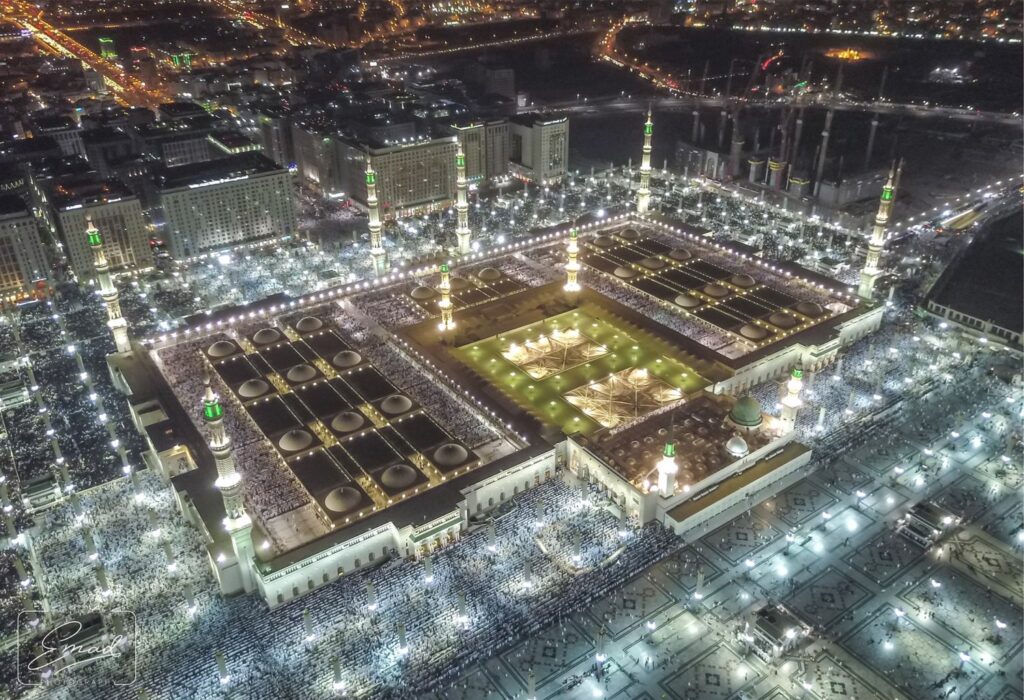
AL-MASJID AN-NABAWI (THE PROPHET’S MASJID)
The Prophet’s (sallallahu alaihi wasallam) masjid, Al-Masjid An-Nabawi, is the greatest masjid after Masjid Al-Haram in Makkah.
Here’s what it looked like in the past.
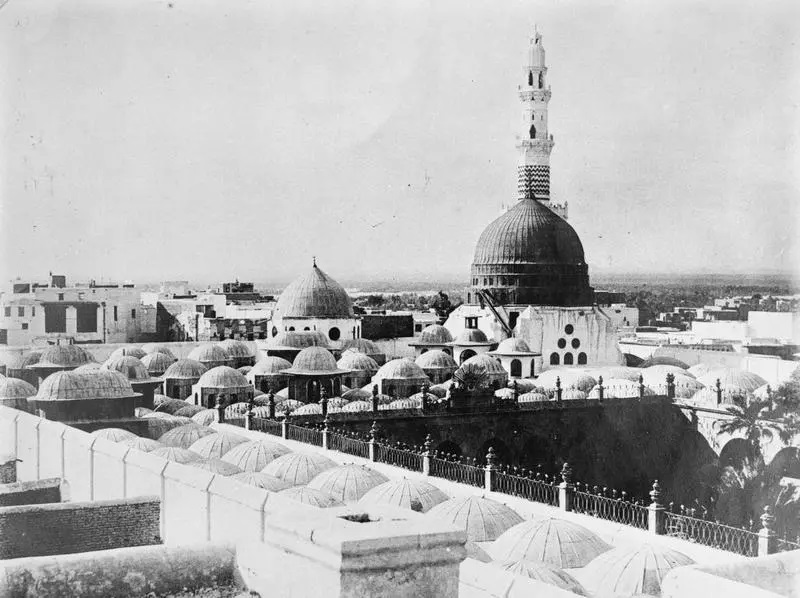
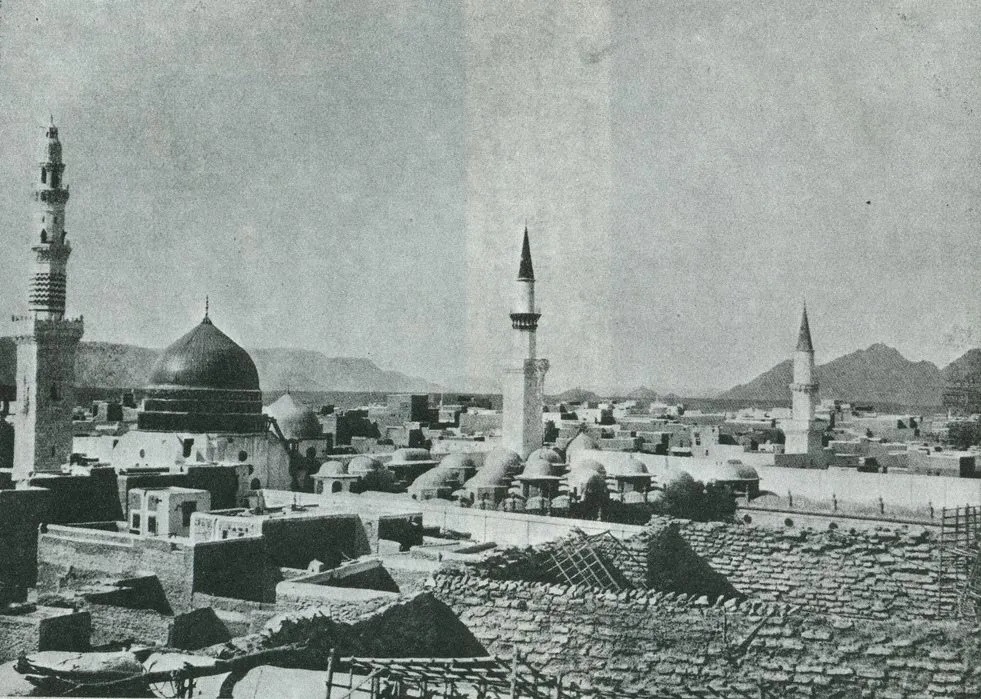
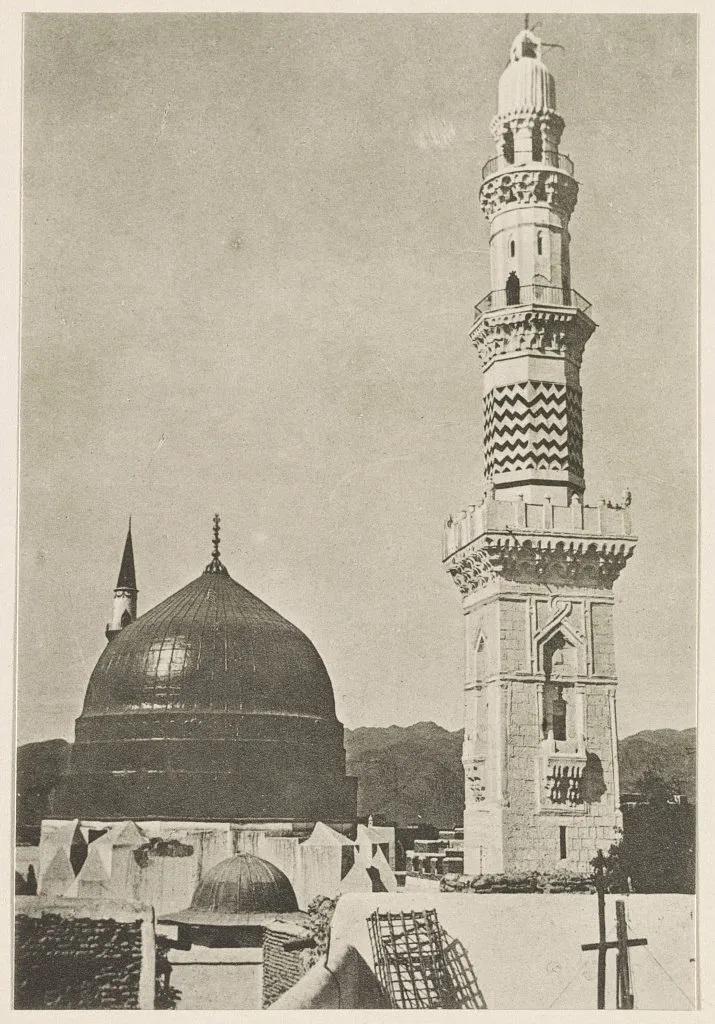
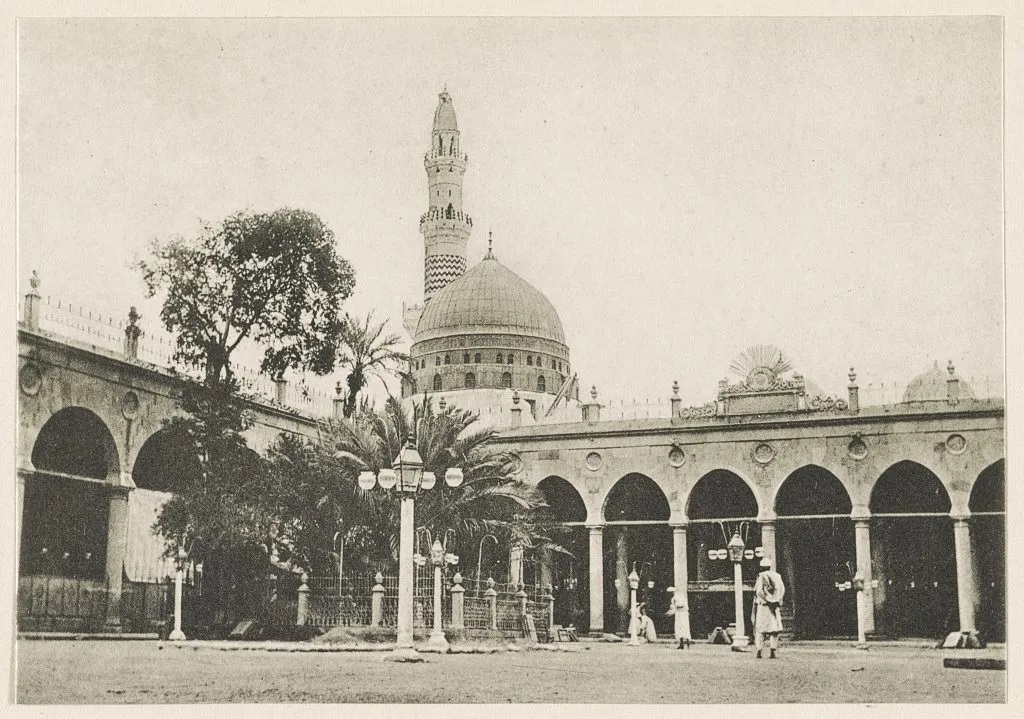
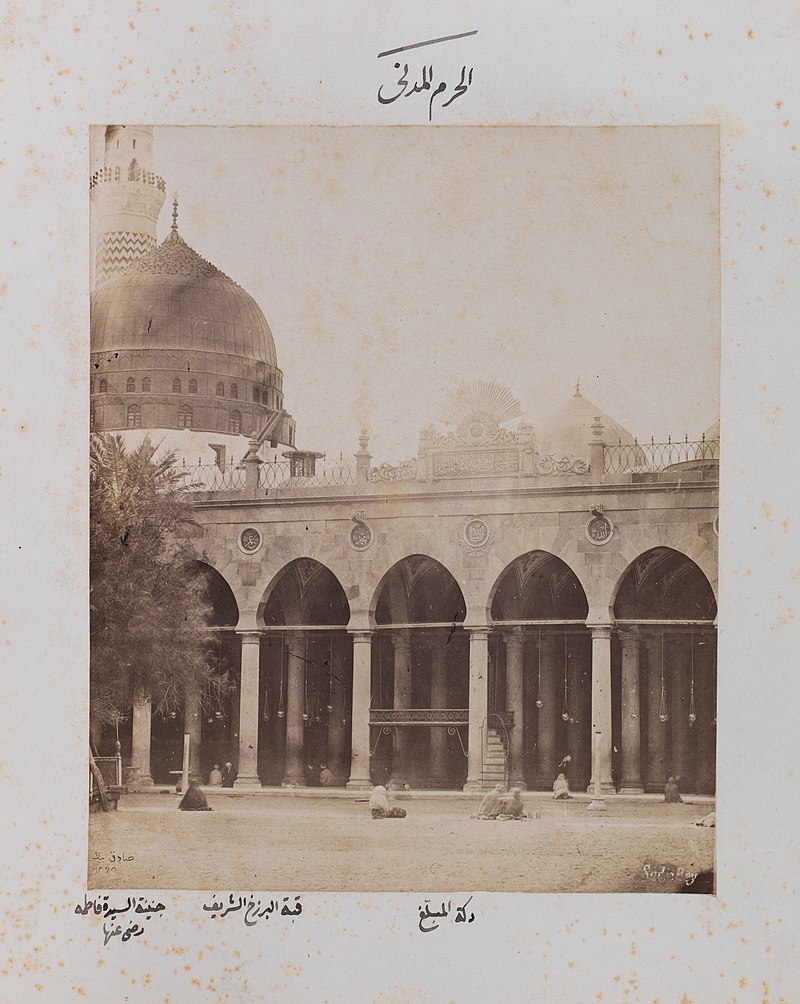
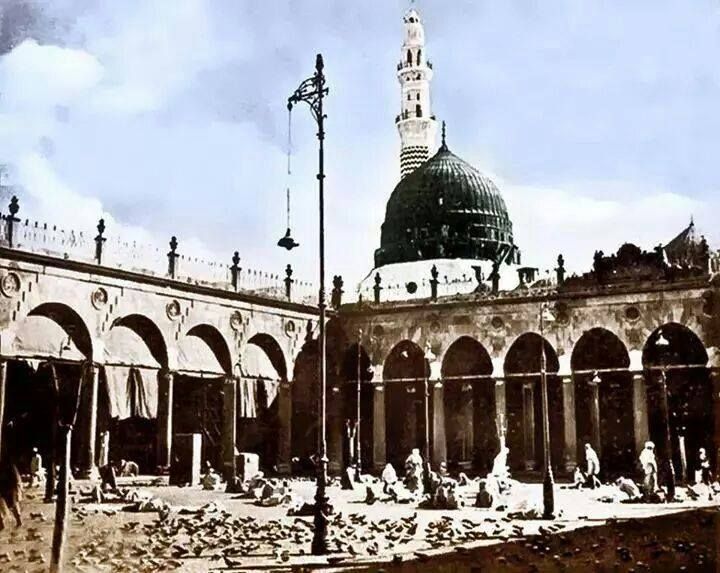
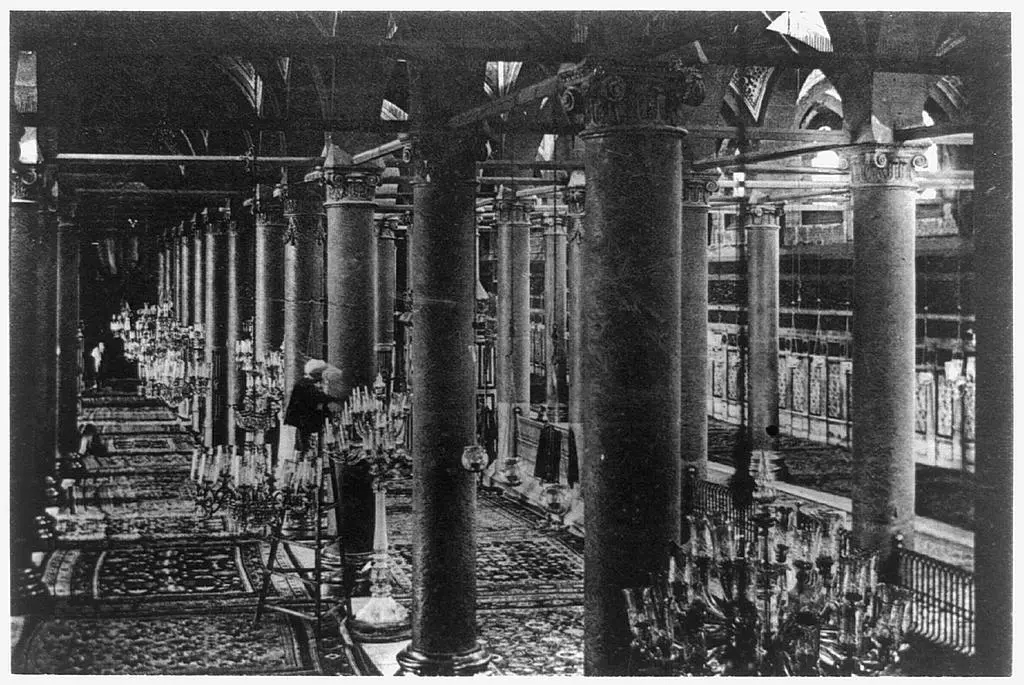
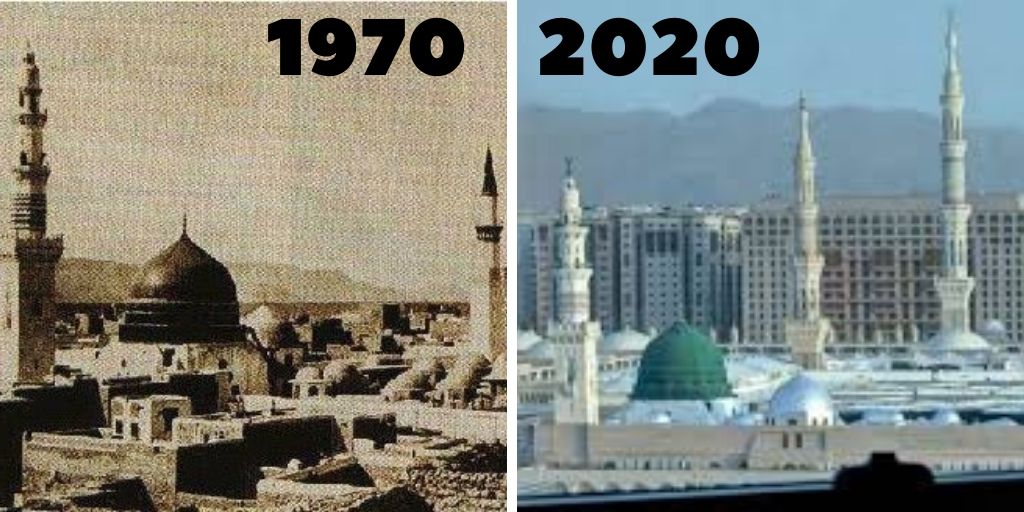
Here’s what it looks like at the present time:
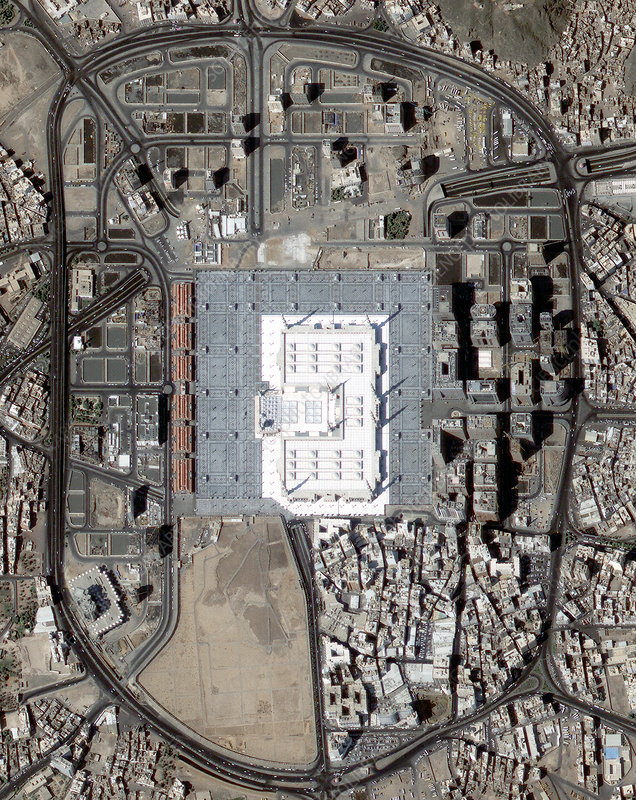
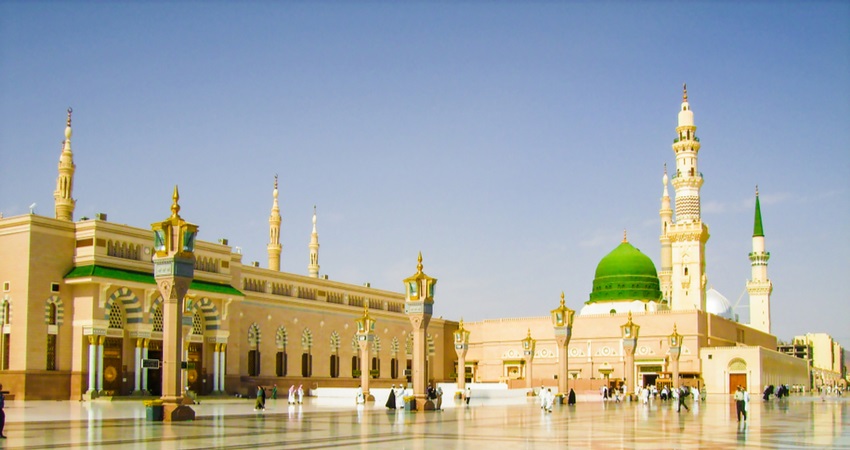
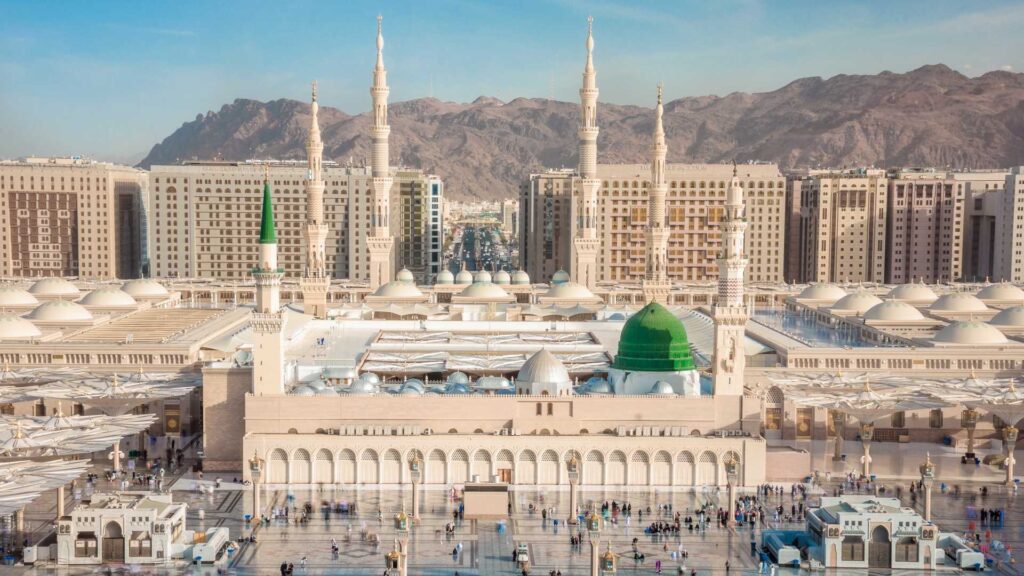
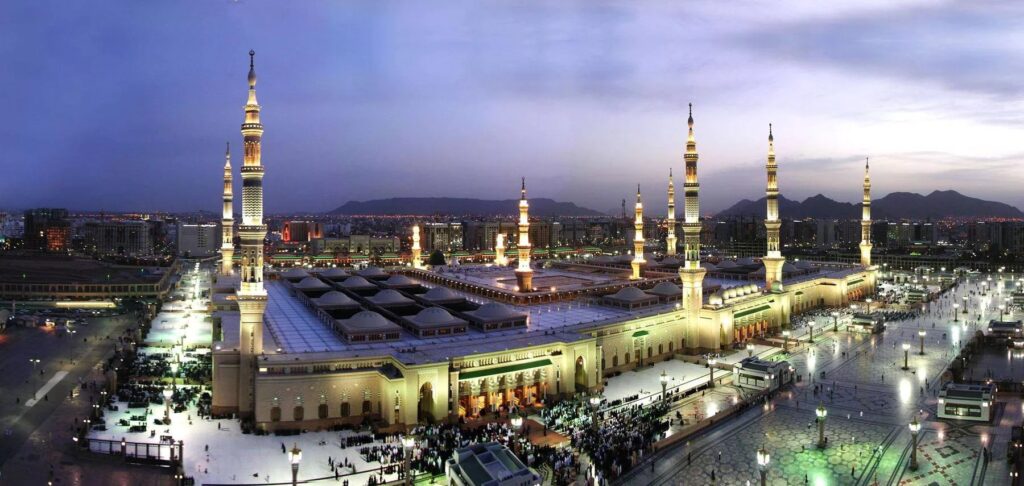
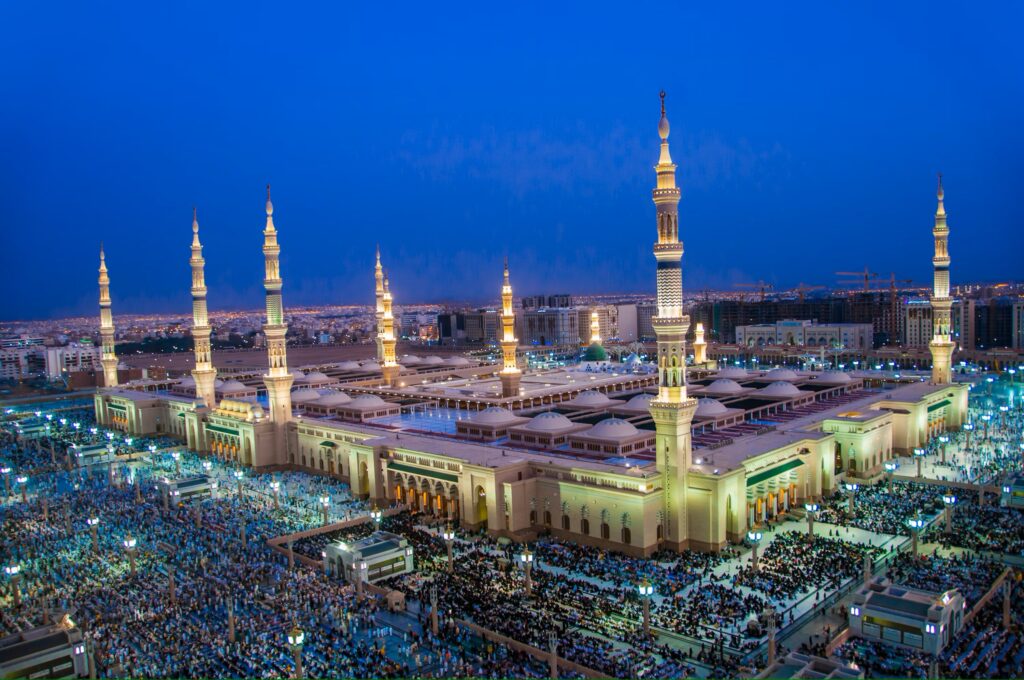
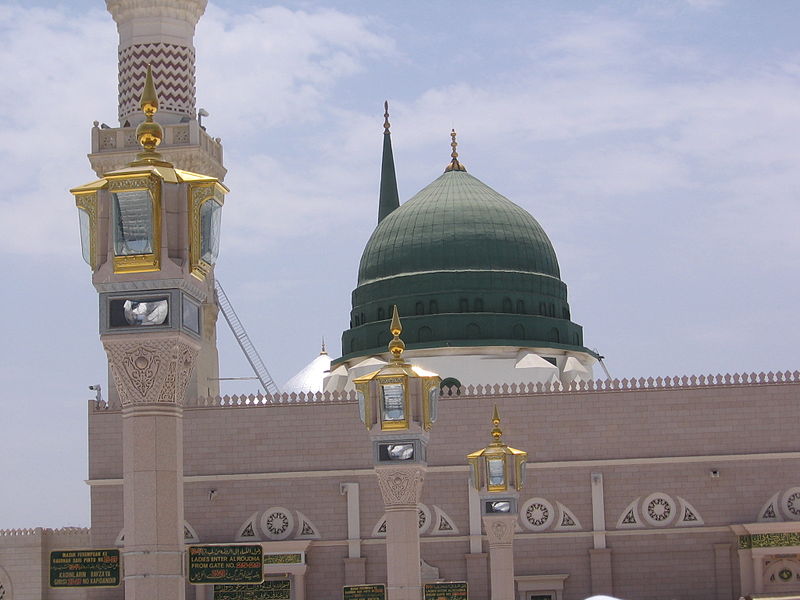
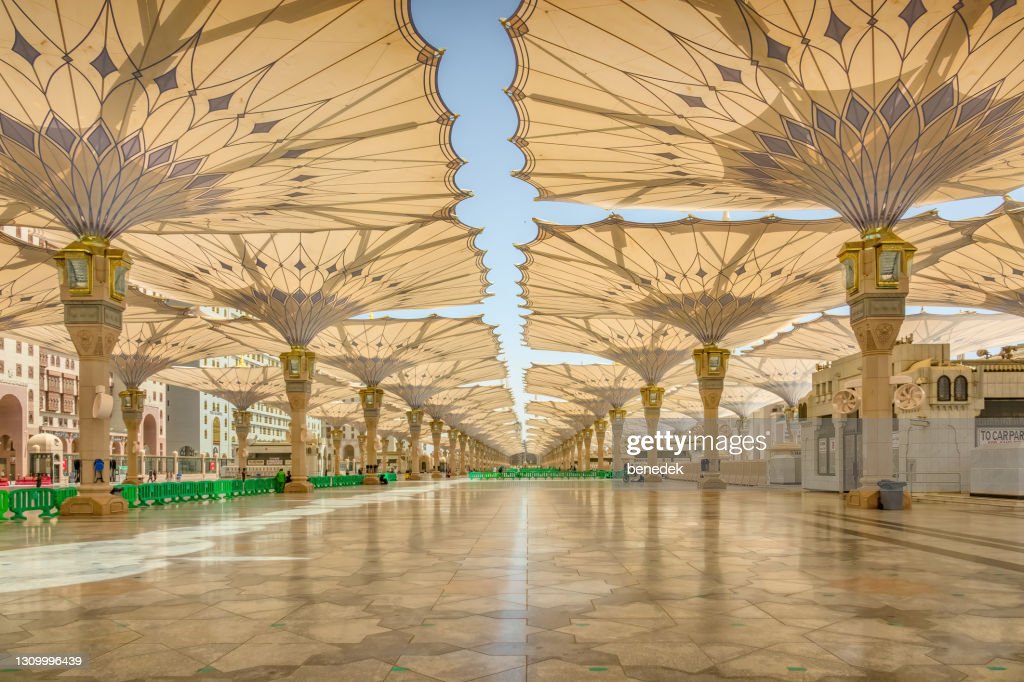
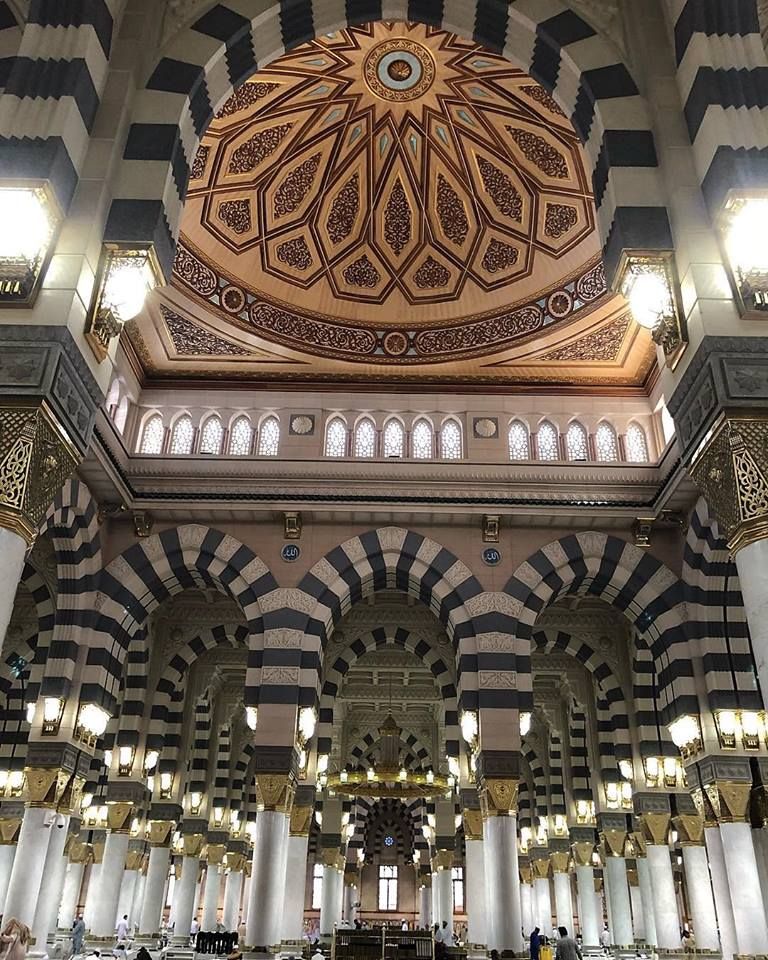
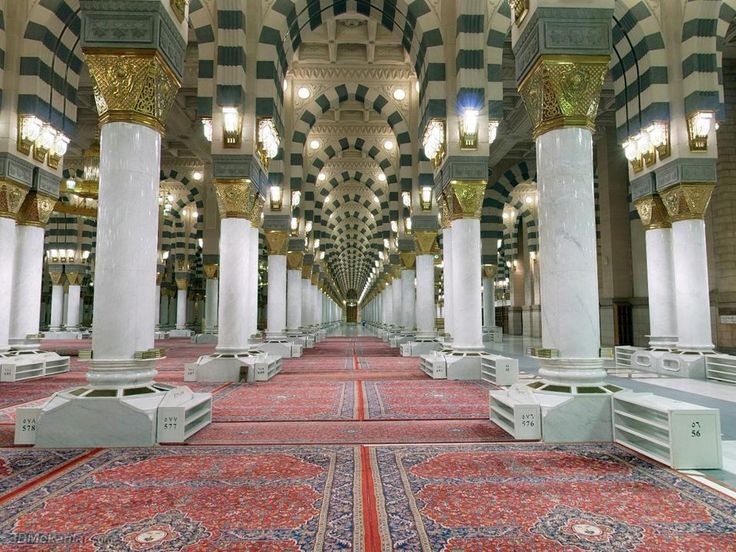
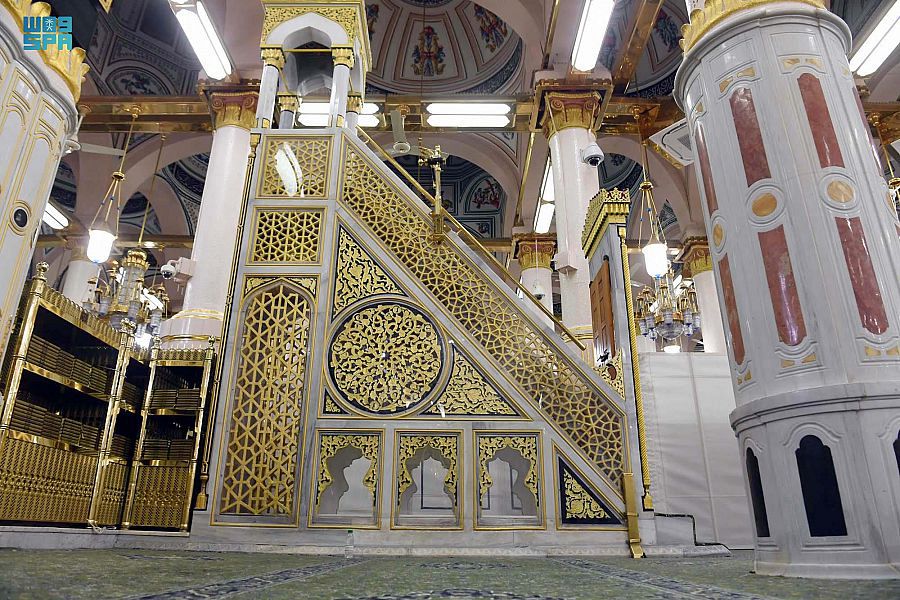
This masjid, being the second greatest one, also has some virtues:
1.Prayer in it has more reward
Some people think that praying 40 prayers in it has a special reward but that is not true. What is true is that the reward of praying in this masjid is 1000 times more than in any other masjid, except for Masjid Al-Haram.
عَنْ أَبِي هُرَيْرَةَ ، قَالَ: قَالَ رَسُولُ اللّهِ صلى الله عليه وسلم: صَلاَةٌ فِي مَسْجِدِي هَـذَا، خَيْرٌ مِنْ أَلْفِ صَلاَةٍ فِي غَيْرِهِ مِنَ الْمَسَاجِدِ، إِلاَّ الْمَسْجِدِ الْحَرَامَ
Abu Hurairah (radiallahu anhu) reported Allah’s Messenger (sallallahu alaihi wasallam) as saying: Prayer in my masjid is more excellent than a thousand prayers observed in other masjids except the Masjid al- Haram. [Sahih Muslim, Hadeeth No. 3210]
عَنْ جَابِرٍ، أَنَّ رَسُولَ اللَّهِ ـ صلى الله عليه وسلم ـ قَالَ : صَلاَةٌ فِي مَسْجِدِي أَفْضَلُ مِنْ أَلْفِ صَلاَةٍ فِيمَا سِوَاهُ إِلاَّ الْمَسْجِدَ الْحَرَامَ وَصَلاَةٌ فِي الْمَسْجِدِ الْحَرَامِ أَفْضَلُ مِنْ مِائَةِ أَلْفِ صَلاَةٍ فِيمَا سِوَاهُ
It was narrated from Jabir (radiallahu anhu) that the Messenger of Allah (sallallahu alaihi wasallam) said: “One prayer in my masjid is better than one thousand prayers elsewhere, except Masjid Al-Haram, and one prayer in Masjid Al-Haram is better than one hundred thousand prayers elsewhere.” [Sunan Ibn Majah, Hadeeth No. 1406. Graded “sahih” (authentic) by Al-Albani.]
عَنِ ابْنِ عَبَّاسٍ، أَنَّهُ قَالَ إِنَّ امْرَأَةً اشْتَكَتْ شَكْوَى فَقَالَتْ إِنْ شَفَانِي اللَّهُ لأَخْرُجَنَّ فَلأُصَلِّيَنَّ فِي بَيْتِ الْمَقْدِسِ . فَبَرَأَتْ ثُمَّ تَجَهَّزَتْ تُرِيدُ الْخُرُوجَ فَجَاءَتْ مَيْمُونَةَ زَوْجَ النَّبِيِّ صلى الله عليه وسلم تُسَلِّمُ عَلَيْهَا فَأَخْبَرَتْهَا ذَلِكَ فَقَالَتِ اجْلِسِي فَكُلِي مَا صَنَعْتِ وَصَلِّي فِي مَسْجِدِ الرَّسُولِ صلى الله عليه وسلم فَإِنِّي سَمِعْتُ رَسُولَ اللَّهِ صلى الله عليه وسلم يَقُولُ : صَلاَةٌ فِيهِ أَفْضَلُ مِنْ أَلْفِ صَلاَةٍ فِيمَا سِوَاهُ مِنَ الْمَسَاجِدِ إِلاَّ مَسْجِدَ الْكَعْبَةِ
It is obvious from the above ahadeeth that Al-Masjid An-Nabawi is the second greatest masjid, right after Masjid Al-Haram, and ahead of Masjid Al-Aqsa. Interestingly enough, it was the last of the three to be built, which makes sense given that it was built by the last of the Prophets (alaihimissalaam).
فَقَالَ لَنَا عَبْدُ اللَّهِ بْنُ إِبْرَاهِيمَ أَشْهَدُ أَنِّي سَمِعْتُ أَبَا هُرَيْرَةَ يَقُولُ قَالَ رَسُولُ اللَّهِ صلى الله عليه وسلم : فَإِنِّي آخِرُ الأَنْبِيَاءِ وَإِنَّ مَسْجِدِي آخِرُ الْمَسَاجِدِ
Thereupon Abdullah bin Ibrahim said to us (Abu Salama and Abu Abdullah) : I bear witness to the fact that I heard Abu Hurairah (radiallahu anhu) say that Allah’s Messenger (sallallahu alaihi wasallam) said: I am the last of the Prophets and my mosque is the last of the mosques. [Sahih Muslim, Hadeeth No. 3211. The whole narration can be found here.]
2. It is permitted to set out on a journey to visit it
عن أَبي هُرَيْرَة يُخْبِرُ أَنَّ رَسُولَ اللَّهِ صلى الله عليه وسلم قَالَ : إِنَّمَا يُسَافَرُ إِلَى ثَلاَثَةِ مَسَاجِدَ مَسْجِدِ الْكَعْبَةِ وَمَسْجِدِي وَمَسْجِدِ إِيلِيَاءَ
Abu Hurairah (radiallahu anhu) reported Allah’s Messenger (sallallahu alaihi wasallam) as saying: One should undertake journey to three mosques: the mosque of the Kabah, my mosque, and the mosque of Elia (Bait al-Maqdis). [Sahih Muslim, Hadeeth No. 3220]
3. It is a masjid built on piety
عَنْ أَبي سَلَمَة بْنَ عَبْدِ الرَّحْمَنِ، قَالَ مَرَّ بِي عَبْدُ الرَّحْمَنِ بْنُ أَبِي سَعِيدٍ الْخُدْرِيِّ قَالَ قُلْتُ لَهُ كَيْفَ سَمِعْتَ أَبَاكَ يَذْكُرُ فِي الْمَسْجِدِ الَّذِي أُسِّسَ عَلَى التَّقْوَى قَالَ قَالَ أَبِي دَخَلْتُ عَلَى رَسُولِ اللَّهِ صلى الله عليه وسلم فِي بَيْتِ بَعْضِ نِسَائِهِ فَقُلْتُ يَا رَسُولَ اللَّهِ أَىُّ الْمَسْجِدَيْنِ الَّذِي أُسِّسَ عَلَى التَّقْوَى قَالَ فَأَخَذَ كَفًّا مِنْ حَصْبَاءَ فَضَرَبَ بِهِ الأَرْضَ ثُمَّ قَالَ : هُوَ مَسْجِدُكُمْ هَذَا - لِمَسْجِدِ الْمَدِينَةِ – قَالَ فَقُلْتُ أَشْهَدُ أَنِّي سَمِعْتُ أَبَاكَ هَكَذَا يَذْكُرُهُ
Abu Salamah bin Abdir Rahman reported: Abdur Rahman bin Abee Saeed al-Khudri happened to pass by me and I said to him. How did you hear your father making mention of the mosque founded on Piety? He said: My father said: I went to Allah’s Messenger (sallallahu alaihi wasallam) as he was in the house of one of his wives, and said: Messenger of Allah, which of the two mosques is founded on piety? Thereupon he took a handful of pebbles and threw them on the ground and then said: This is the very mosque of yours – the mosque at Madinah. He (the narrator) said: I bear witness that I heard your father making mention of it. [Sahih Muslim, Hadeeth No. 3221]
In the Quran, Allah mentions a masjid built on piety. Many scholars are of the opinion that it is Masjid Quba (as will be mentioned below). The above hadeeth shows that it might be Al-Masjid An-Nabawi as well, or that it too is a masjid built on piety.
4. In it is a garden from the gardens of Paradise
There is an area referred to as “Ar-Rawdhah” (the garden) in Al-Masjid An-Nabawi.
عَنْ أَبِي هُرَيْرَةَ ـ رضى الله عنه ـ عَنِ النَّبِيِّ صلى الله عليه وسلم قَالَ : مَا بَيْنَ بَيْتِي وَمِنْبَرِي رَوْضَةٌ مِنْ رِيَاضِ الْجَنَّةِ، وَمِنْبَرِي عَلَى حَوْضِي
Narrated Abu Hurairah (radiallahu anhu): The Prophet (sallallahu alaihi wasallam) said, “There is a garden from the gardens of Paradise between my house and my pulpit, and my pulpit is on my Lake Fount (Al-Kauthar). [Sahih Al-Bukhari, Volume 3, Hadeeth No. 112]
Here is a detailed explanation of this hadeeth.
This is what the area looks like. It seems to have green carpets whereas the rest of the masjid seems to have red carpets.
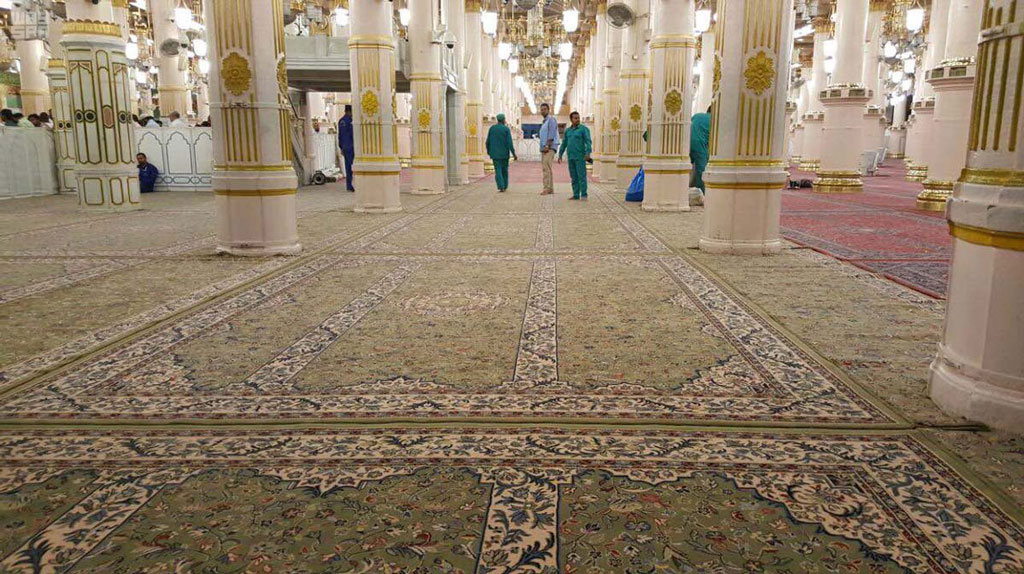
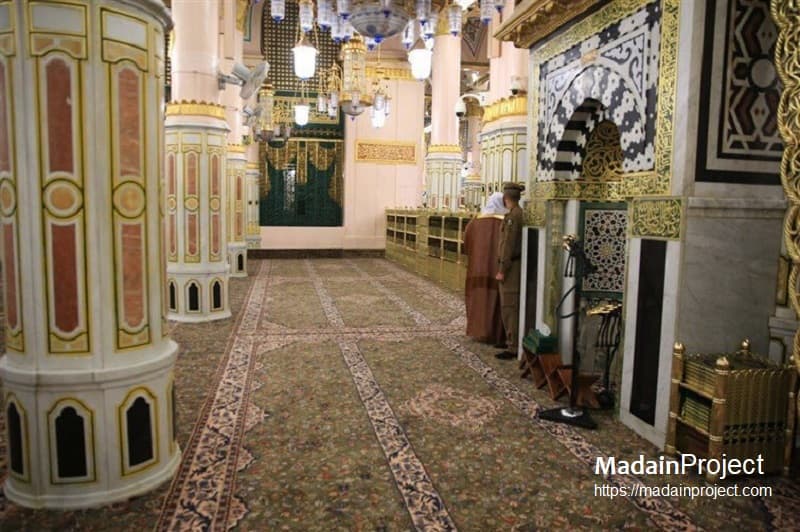
This area is usually difficult to get to but it is possible. There are special timings for women as well.
One can pray there if one wishes or anywhere else in the masjid.
عن يَزِيد بْن أَبِي عُبَيْدٍ، قَالَ كُنْتُ آتِي مَعَ سَلَمَةَ بْنِ الأَكْوَعِ فَيُصَلِّي عِنْدَ الأُسْطُوَانَةِ الَّتِي عِنْدَ الْمُصْحَفِ. فَقُلْتُ يَا أَبَا مُسْلِمٍ أَرَاكَ تَتَحَرَّى الصَّلاَةَ عِنْدَ هَذِهِ الأُسْطُوَانَةِ. قَالَ فَإِنِّي رَأَيْتُ النَّبِيَّ صلى الله عليه وسلم يَتَحَرَّى الصَّلاَةَ عِنْدَهَا
Narrated Yazid bin Al-Ubaid: I used to accompany Salamah bin Al-Akwah and he used to pray behind the pillar which was near the place where the Mushafs (copies of the Quran) were kept. I said, “O Abu Muslim! I see you always seeking to pray behind this pillar.” He replied, “I saw Allah’s Messenger (sallallahu alaihi wasallam) always seeking to pray near that pillar.” [Sahih Al-Bukhari, Volume 1, Hadeeth No. 481]
However, there is no prayer specific to this place nor is there is any proof that supplication is answered here. Do voluntary prayers or other acts of worship have a distinction in this area compared to the rest of the masjid? I came across two opinions on this. One group said yes and another said no. Allah knows bettter.
One may also visit the grave of the Prophet (sallallahu alaihi wasallam) if one wishes but one should not travel to Madinah with that intention. The graves of Abu Bakr (radiallahu anhu) and Umar (radiallahu anhu are also there.
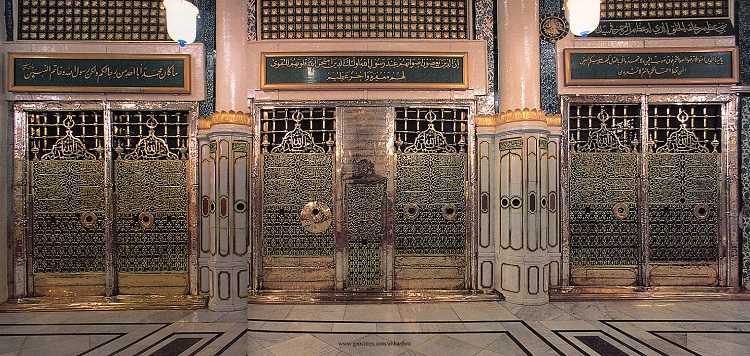
Please do not touch the grave seeking blessings from it as that it a type of shirk (polytheism).
Here’s an article that discusses the etiquettes of visiting the masjid and the grave.
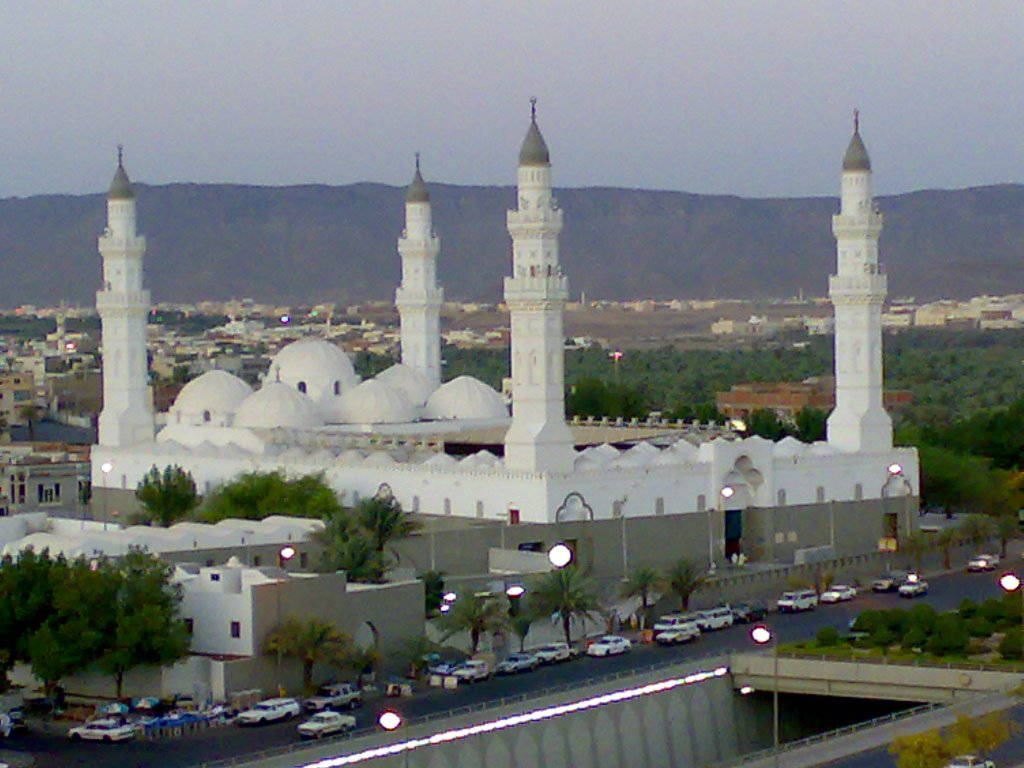
OTHER PLACES TO VISIT IN MADINAH
Another important masjid in Madinah is the first masjid in the Islamic era – Masjid Al-Quba. Here’s what it looked like in the past.
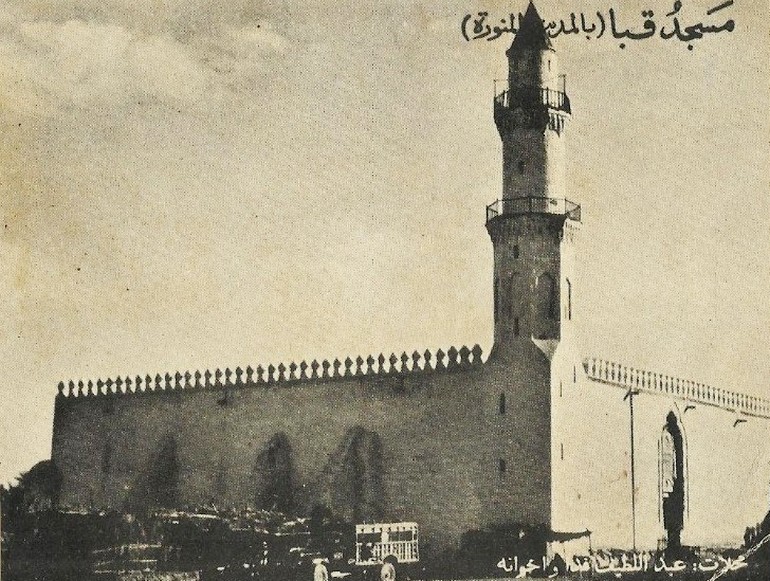
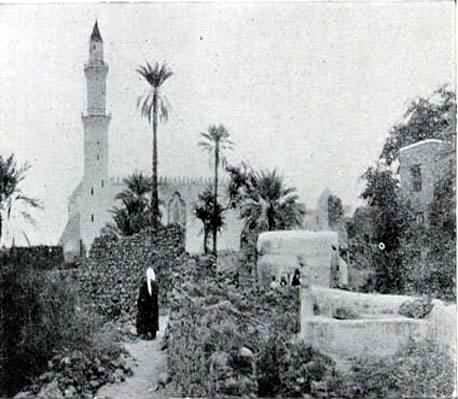
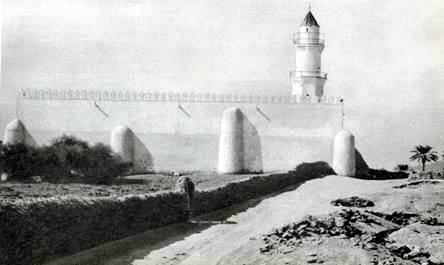
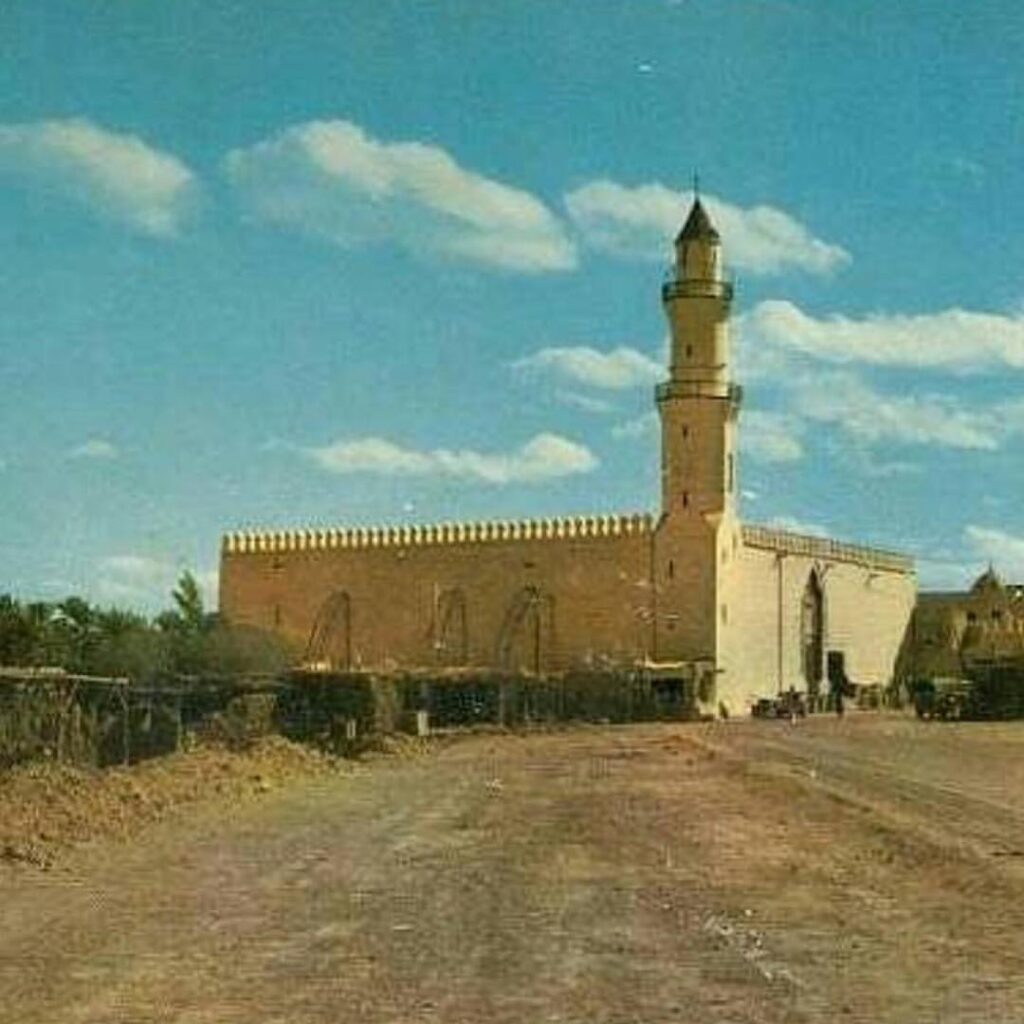
Here’s what it looks like at the present time:
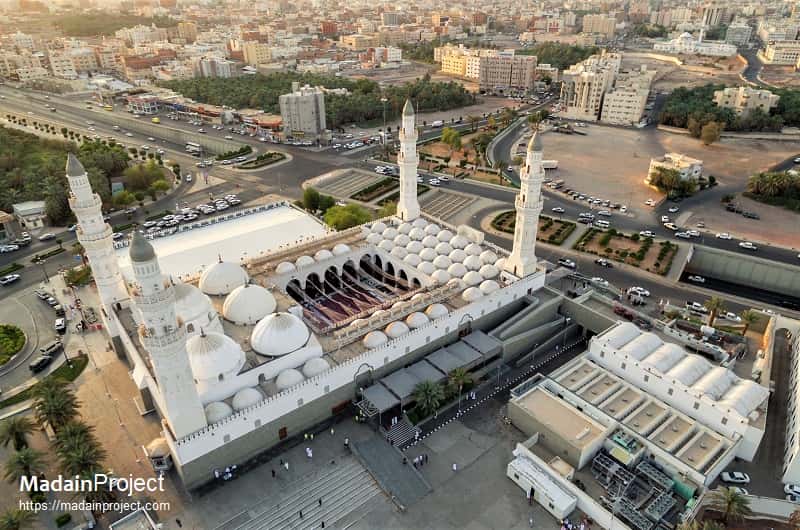
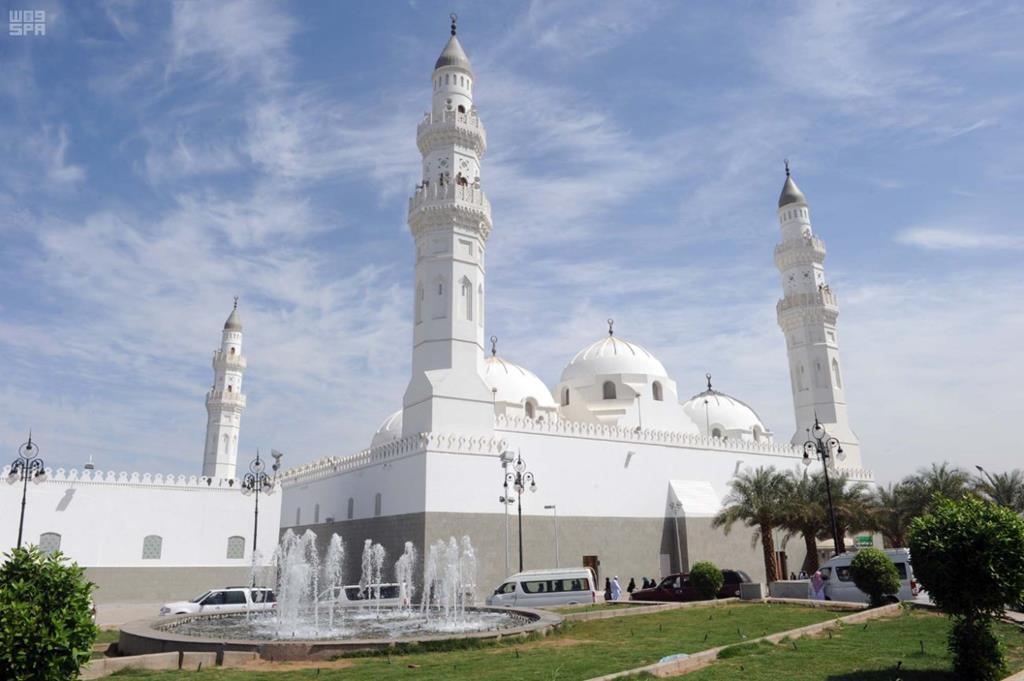
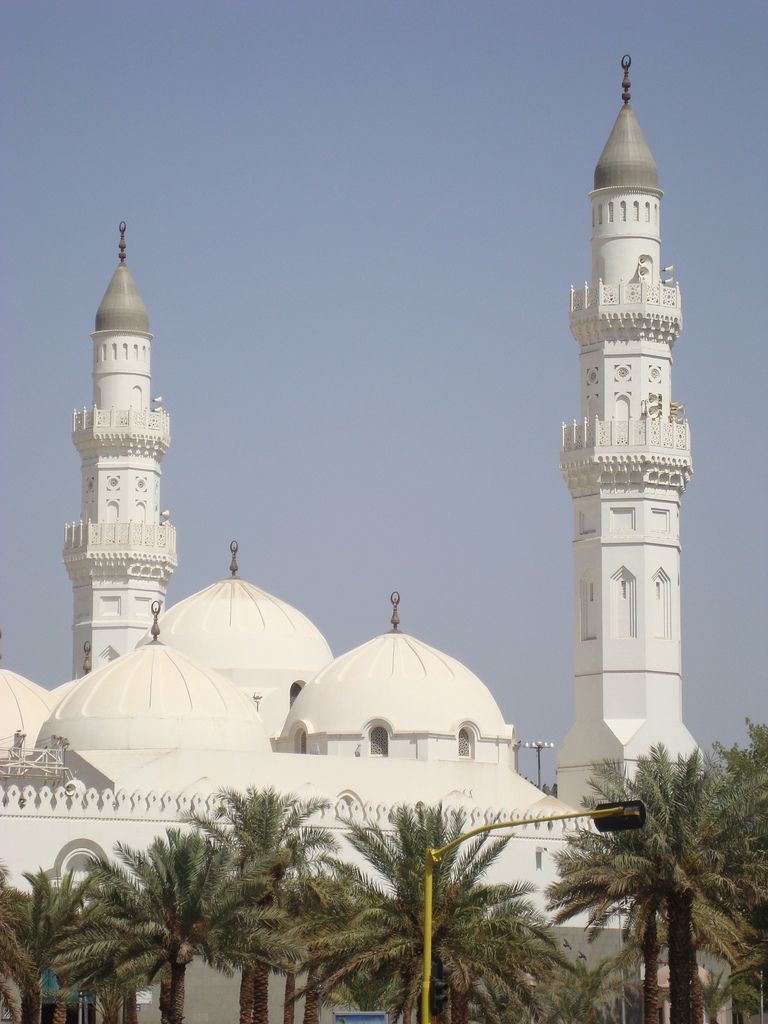
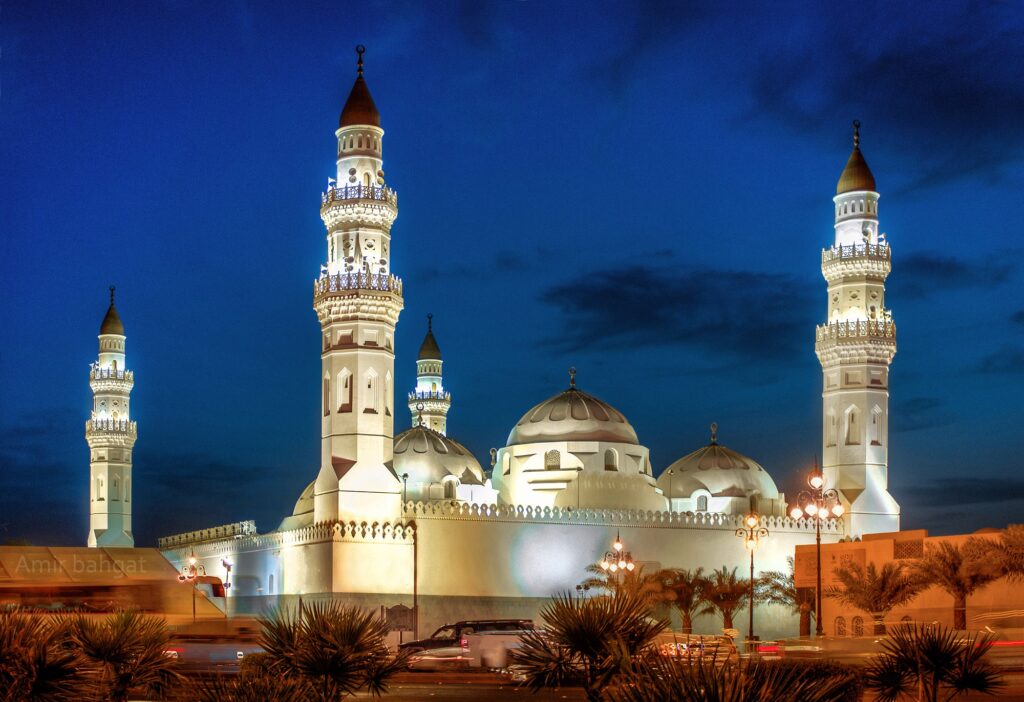
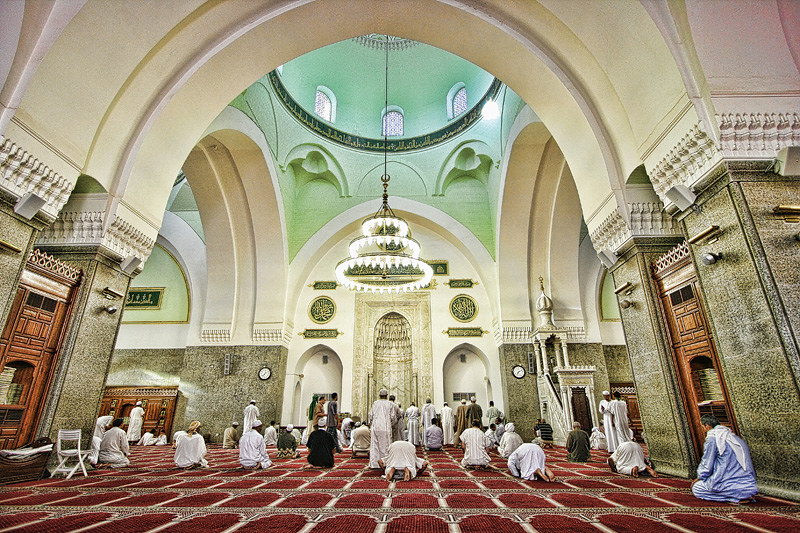
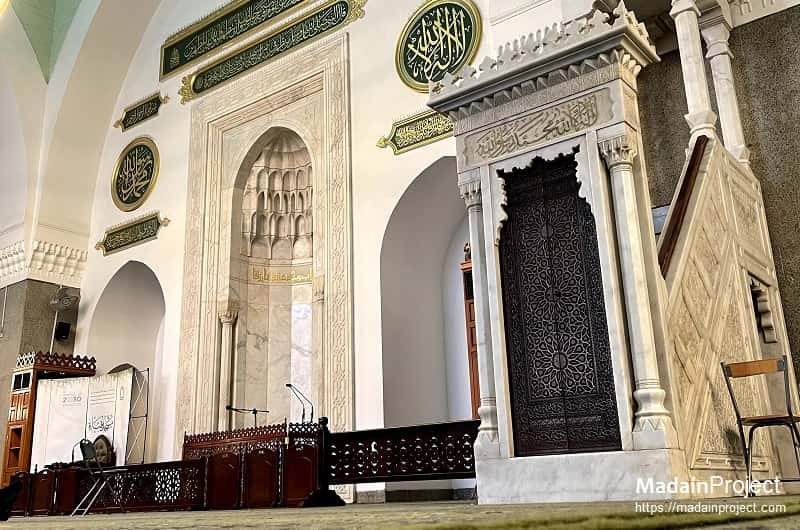
This masjid is mentioned in the Quran as being built on piety.
وَالَّذِينَ اتَّخَذُوا مَسْجِدًا ضِرَارًا وَكُفْرًا وَتَفْرِيقًا بَيْنَ الْمُؤْمِنِينَ وَإِرْصَادًا لِّمَنْ حَارَبَ اللَّهَ وَرَسُولَهُ مِن قَبْلُ ۚ وَلَيَحْلِفُنَّ إِنْ أَرَدْنَا إِلَّا الْحُسْنَىٰ ۖ وَاللَّهُ يَشْهَدُ إِنَّهُمْ لَكَاذِبُونَ
لَا تَقُمْ فِيهِ أَبَدًا ۚ لَّمَسْجِدٌ أُسِّسَ عَلَى التَّقْوَىٰ مِنْ أَوَّلِ يَوْمٍ أَحَقُّ أَن تَقُومَ فِيهِ ۚ فِيهِ رِجَالٌ يُحِبُّونَ أَن يَتَطَهَّرُوا ۚ وَاللَّهُ يُحِبُّ الْمُطَّهِّرِينَ
And as for those who put up a mosque by way of harming and disbelief, and to disunite the believers, and as an outpost for those who warred against Allah and His Messenger (Muhammad) aforetime, they will indeed swear that their intention is nothing but good. Allah bears witness that they are certainly liars.
Never stand you therein. Verily, the mosque whose foundation was laid from the first day on piety is more worthy that you stand therein (to pray). In it are men who love to clean and to purify themselves. And Allah loves those who make themselves clean and pure (i.e. who clean their private parts with dust [i.e. to be considered as soap) and water from urine and stools, after answering the call of nature]. [Surah At-Taubah (9) : 107 – 108]
عَنْ أَبِي هُرَيْرَةَ، عَنِ النَّبِيِّ صلى الله عليه وسلم قَالَ : نَزَلَتْ هَذِهِ الآيَةُ فِي أَهْلِ قُبَاء : (فِيهِ رِجَالٌ يُحِبُّونَ أَنْ يَتَطَهَّرُوا وَاللَّهُ يُحِبُّ الْمُطَّهِّرِينَ ) . قَالَ كَانُوا يَسْتَنْجُونَ بِالْمَاءِ فَنَزَلَتْ هَذِهِ الآيَةُ فِيهِمْ
فِيهِ رِجَالٌ يُحِبُّونَ أَن يَتَطَهَّرُوا ۚ وَاللَّهُ يُحِبُّ الْمُطَّهِّرِينَ
Within it are men who love to purify themselves; and Allah loves those who purify themselves. [Surah At-Taubah (9) : 107 – 108]
Praying in Masjid Al-Quba gives one the reward of Umrah.
عَنْ أَبي الأَبْرَد، مَوْلَى بَنِي خَطْمَةَ أَنَّهُ سَمِعَ أُسَيْدَ بْنَ ظُهَيْرٍ الأَنْصَارِيَّ، وَكَانَ مِنْ أَصْحَابِ النَّبِيِّ ـ صلى الله عليه وسلم ـ يُحَدِّثُ عَنِ النَّبِيِّ ـ صلى الله عليه وسلم ـ أَنَّهُ قَالَ
عن سَهْل بْن حُنَيْفٍ قَالَ رَسُولُ اللَّهِ ـ صلى الله عليه وسلم ـ : مَنْ تَطَهَّرَ فِي بَيْتِهِ، ثُمَّ أَتَى مَسْجِدَ قُبَاءٍ، فَصَلَّى فِيهِ صَلاَةً، كَانَ لَهُ كَأَجْرِ عُمْرَةٍ
عَنِ ابْنِ عُمَرَ ـ رضى الله عنهما ـ قَالَ كَانَ النَّبِيُّ صلى الله عليه وسلم يَأْتِي مَسْجِدَ قُبَاءٍ كُلَّ سَبْتٍ مَاشِيًا وَرَاكِبًا. وَكَانَ عَبْدُ اللَّهِ ـ رضى الله عنهما ـ يَفْعَلُهُ
Narrated Abdullah bin Dinar: Ibn Umar (radiallahu anhuma) said, “The Prophet (sallallahu alaihi wasallam) used to go to the Mosque of Quba every Saturday (sometimes) walking and (sometimes) riding.” Abdullah (Ibn Umar) used to do the same. [Sahih Al-Bukhari, Volume 2, Hadeeth No. 284]
Please note that one should not set out on a journey in order to pray in this masjid as that is not allowed. However, if you are in Madinah, it is recommended to visit it and pray there.
Another place that one may visit is the Baqee cemetry. A lot of Sahabah are buried there.

Before you go, please read the etiquettes of visiting graves. And please remember that there is a difference of opinion with regards to the permissibility of a woman visiting graveyards.
One may also go visit the martyrs of Uhud. These are those that were killed in the Battle of Uhud, which was the second battle in Islam (after the Battle of Badr).
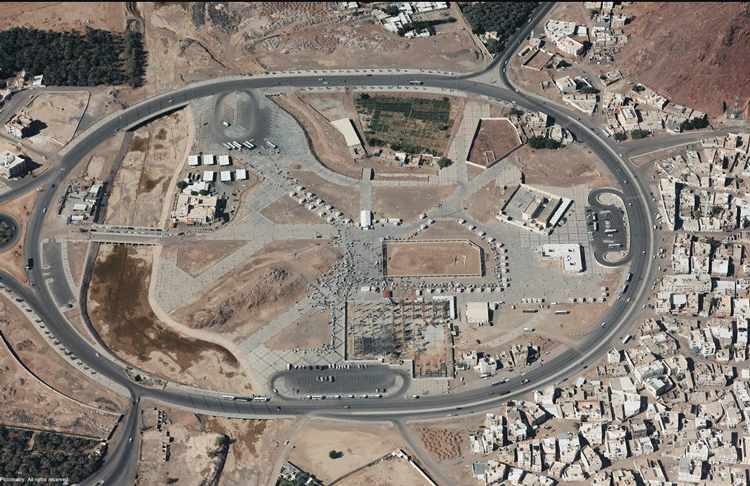
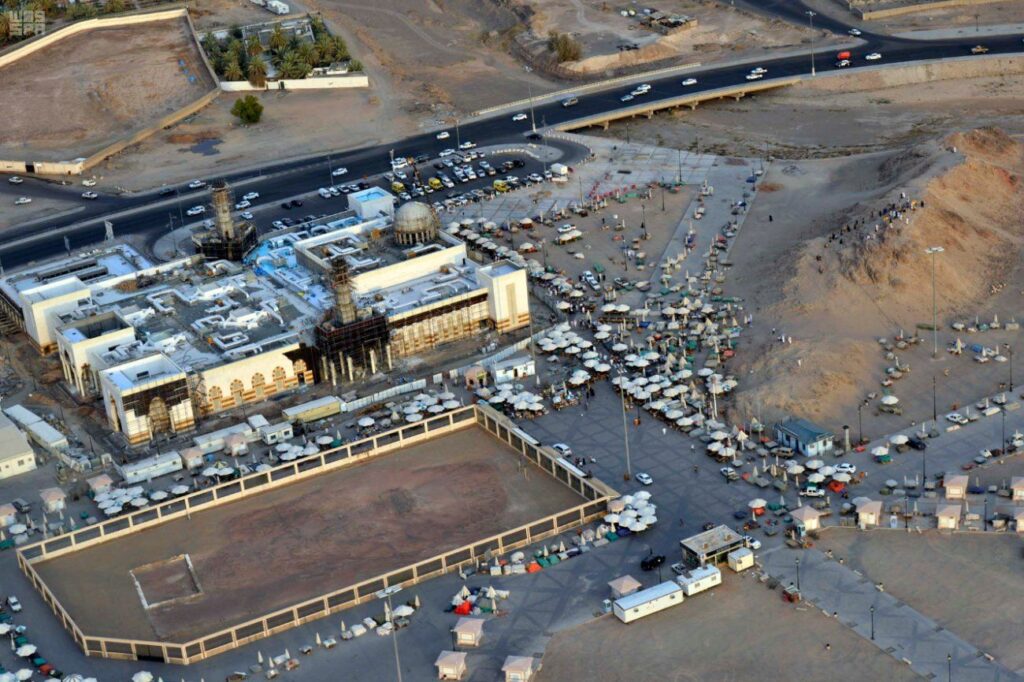
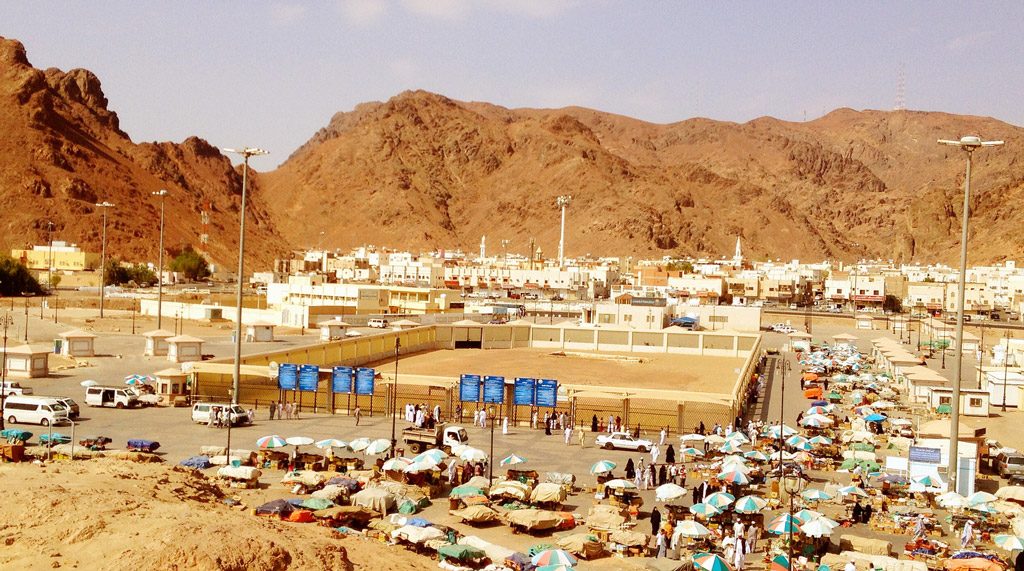
One of the martyrs was discussed in this post of mine.
In the last picture, you can see some mountains in the background. That is Mount Uhud.
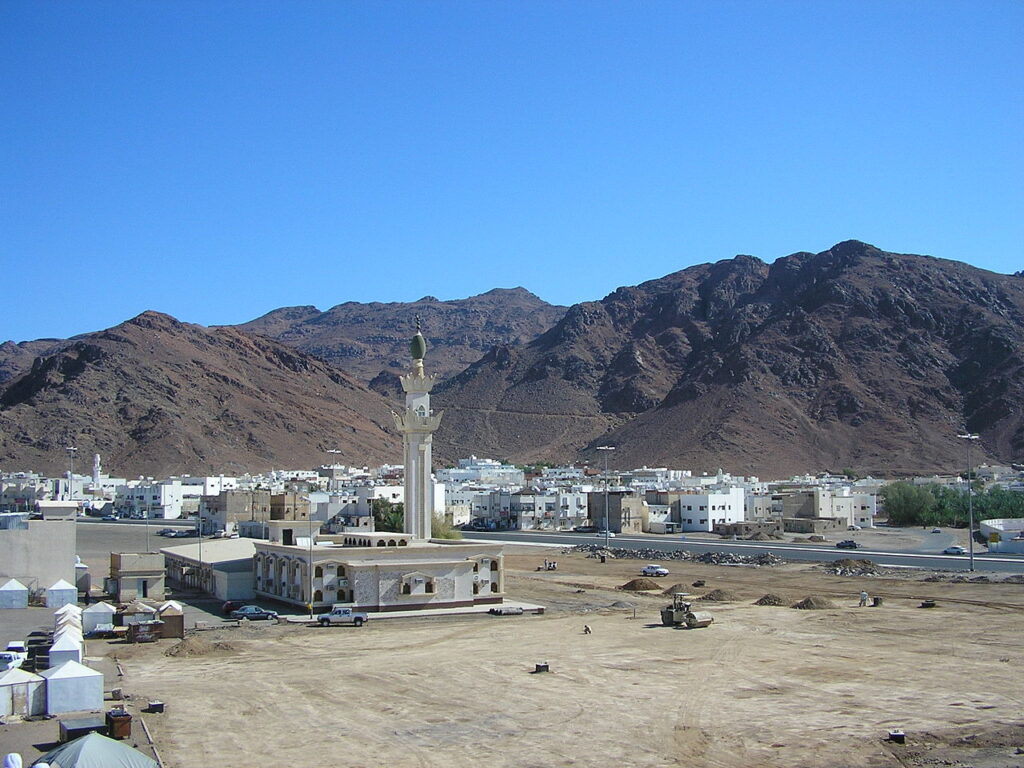

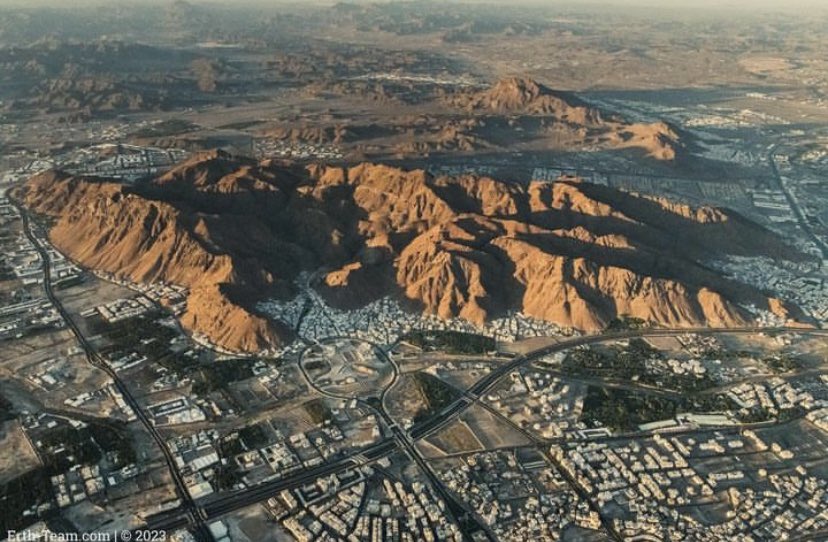
There is something rather lovely about this mountain.
عَنْ قَتَادَةَ، حَدَّثَنَا أَنَسُ، بْنُ مَالِكٍ قَالَ قَالَ رَسُولُ اللَّهِ صلى الله عليه وسلم : إِنَّ أُحُدًا جَبَلٌ يُحِبُّنَا وَنُحِبُّهُ
Anas ibn Malik (radiallahu anhu) reported Allah’s Messenger (sallallahu alaihi wasallam) as saying: Uhud is a mountain which loves us and which we love. [Sahih Muslim, Hadeeth No. 3208]
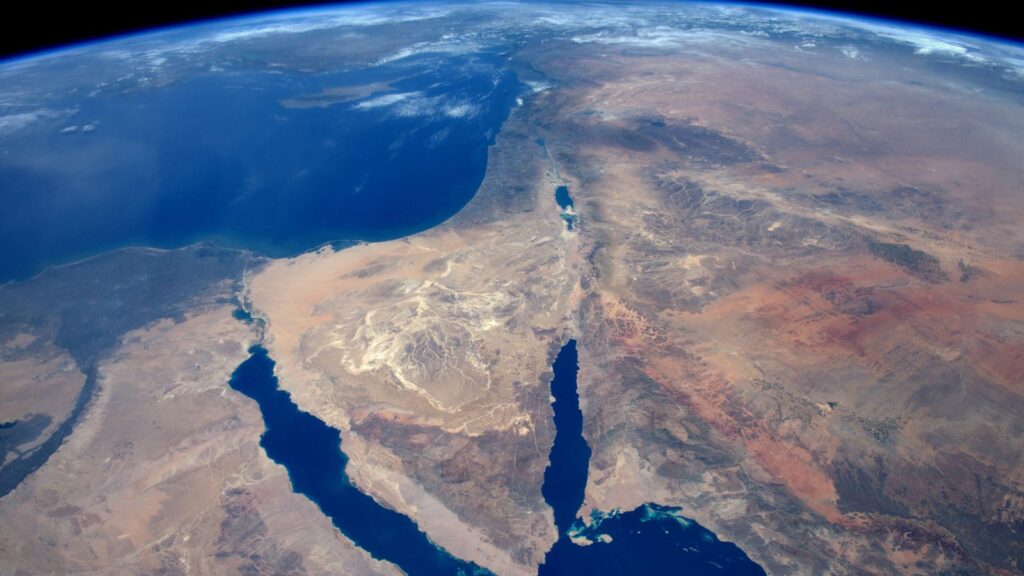
VIRTUES OF ASH-SHAM
Over two decades ago, someone told me that in the past, people would go to Masjid Al-Aqsa after visiting Makkah and Madinah, in order to complete the visit to all the three most important masjids. That’s why I decided to talk about Masjid Al-Aqsa (my favourite masjid) in this series.
Masjid Al-Aqsa is in Palestine, which is part of the region known as “Ash-Sham” ie. the Levant or Greater Syria. Ash-Sham includes Lebanon, Palestine (the West Bank, Gaza and the illegally occupied areas), Jordan and Syria, along with some parts of Egypt, Turkey, Saudi Arabia and Iraq.
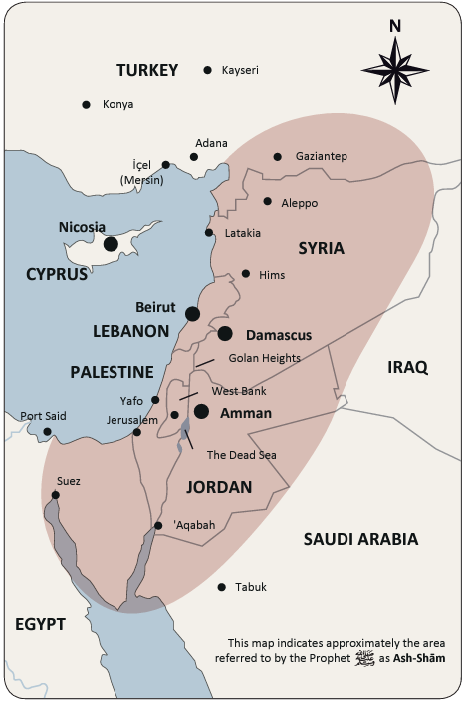
[The above picture was taken from a book that talks about the virtues of Ash-Sham.]
This part of the world, like the Arabian Peninsula, is a special place due to its many virtues. What virtues does it have, one may ask?
Well, to begin with, the area is blessed.
سُبْحَانَ الَّذِي أَسْرَىٰ بِعَبْدِهِ لَيْلًا مِّنَ الْمَسْجِدِ الْحَرَامِ إِلَى الْمَسْجِدِ الْأَقْصَى الَّذِي بَارَكْنَا حَوْلَهُ لِنُرِيَهُ مِنْ آيَاتِنَا ۚ إِنَّهُ هُوَ السَّمِيعُ الْبَصِيرُ
Exalted is He who took His Servant by night from al-Masjid al-Haram to al-Masjid al-Aqsa, whose surroundings We have blessed, to show him of Our signs. Indeed, He is the Hearing, the Seeing. [Surah Al-Israa (17) : 1]
Imam Ibn Kathir (rahimahullah) states in his explanation of this ayah (verse):
“Allah glorifies Himself, for His ability to do that which none but He can do, for there is no God but He and no Lord besides Him.
﴿ ٱلَّذِىٓ أَسۡرَىٰ بِعَبۡدِهِۦ ﴾
(Who took His servant for a Journey) refers to Muhammad
﴿ لَيۡلاً۬ ﴾
(by Night) means, in the depths of the night.
﴿ مِّنَ ٱلۡمَسۡجِدِ ٱلۡحَرَامِ ﴾
(from Al-Masjid Al-Haram) means the Masjid in Makkah.
﴿ إِلَى ٱلۡمَسۡجِدِ ٱلۡأَقۡصَا ﴾
(to Al-Masjid Al-Aqsa,) means the Sacred House which is in Jerusalem, the origin of the Prophets from the time of Ibrahim Al-Khalil. The Prophets all gathered there, and he (Muhammad) led them in prayer in their own homeland. This indicates that he is the greatest leader of all, may the peace and blessings of Allah be upon him and upon them.
﴿ ٱلَّذِى بَـٰرَكۡنَا حَوۡلَهُ ۥ ﴾
(the neighborhood whereof We have blessed) means, its agricultural produce and fruits are blessed
﴿ لِنُرِيَهُ ۥ ﴾
(in order that We might show him), i.e., Muhammad
﴿ مِنۡ ءَايَـٰتِنَآۚ ﴾
(of Our Ayat.) i.e., great signs. As Allah says:
﴿ لَقَدۡ رَأَىٰ مِنۡ ءَايَـٰتِ رَبِّهِ ٱلۡكُبۡرَىٰٓ ﴾
(Indeed he did see of the greatest signs, of his Lord (Allah).) (53:18) We will mention below what was narrated in the Sunnah concerning this.
﴿ إِنَّهُ ۥ هُوَ ٱلسَّمِيعُ ٱلۡبَصِيرُ ﴾
(Verily, He is the All-Hearer, the All-Seer.) means, He hears all the words of His servants, believers and disbelievers, faithful and infidel, and He sees them and gives each of them what he deserves in this world and the Hereafter. “
The blessings of Ash-Sham are also implied in another ayah of the Quran.
وَنَجَّيْنَاهُ وَلُوطًا إِلَى الْأَرْضِ الَّتِي بَارَكْنَا فِيهَا لِلْعَالَمِينَ
And We rescued him (Ibrahim) and Lut to the land which We have blessed for the Alameen (mankind and jinns). [Surah Al-Anbiya (21) : 71]
Imam Ibn Kathir (rahimahullah) states in his explanation of this ayah (verse):
“Allah tells us that He saved Ibrahim from the fire lit by his people, and brought him out from among them, migrating to the land of Ash-Sham, to the sacred regions thereof.”
وَلِسُلَيْمَانَ الرِّيحَ عَاصِفَةً تَجْرِي بِأَمْرِهِ إِلَى الْأَرْضِ الَّتِي بَارَكْنَا فِيهَا ۚ وَكُنَّا بِكُلِّ شَيْءٍ عَالِمِينَ
And to Sulaiman (We subjected) the wind strongly raging, running by his command towards the land which We had blessed. And of everything We are the All-Knower. [Surah Al-Anbiya (21) : 81]
Imam Ibn Kathir (rahimahullah) states in his explanation of this ayah (verse):
”
﴿ وَلِسُلَيۡمَـٰنَ ٱلرِّيحَ عَاصِفَةً۬ ﴾
(And to Sulayman (We subjected) the wind strongly raging,) means, `We subjugated the strong wind to Sulayman.’
﴿ تَجۡرِى بِأَمۡرِهِۦۤ إِلَى ٱلۡأَرۡضِ ٱلَّتِى بَـٰرَكۡنَا فِيہَاۚ ﴾
(running by his command towards the land which We had blessed.) meaning, the land of Ash-Sham (Greater Syria).”
That’s not all. The angels spread their wings over Ash-Sham.
عَنْ زَيْدِ بْنِ ثَابِتٍ، قَالَ كُنَّا عِنْدَ رَسُولِ اللَّهِ صلى الله عليه وسلم نُؤَلِّفُ الْقُرْآنَ مِنَ الرِّقَاعِ فَقَالَ رَسُولُ اللَّهِ صلى الله عليه وسلم : طُوبَى لِلشَّأْمِ . فَقُلْنَا لأَىٍّ ذَلِكَ يَا رَسُولَ اللَّهِ قَالَ : لأَنَّ مَلاَئِكَةَ الرَّحْمَنِ بَاسِطَةٌ أَجْنِحَتَهَا عَلَيْهَا
““Blessed is (Greater) Syria” means: because it and its people have a good life.
“Because the angels of the Most Merciful” this refers to the angels of mercy.
“spread their wings over it” means: over the region of (Greater) Syria and its people, protecting them from kufr. This was stated by al-Qaari. Al-Manaawi said: i.e., surrounding it, sending down blessings and warding off calamity and harm.”
The Prophet (sallallahu alaihi wasallam) also prayed for it to be blessed.
عَنِ ابْنِ عُمَرَ، قَالَ ذَكَرَ النَّبِيُّ صلى الله عليه وسلم : اللَّهُمَّ بَارِكْ لَنَا فِي شَأْمِنَا، اللَّهُمَّ بَارِكْ لَنَا فِي يَمَنِنَا . قَالُوا وَفِي نَجْدِنَا. قَالَ : اللَّهُمَّ بَارِكْ لَنَا فِي شَأْمِنَا، اللَّهُمَّ بَارِكْ لَنَا فِي يَمَنِنَا . قَالُوا يَا رَسُولَ اللَّهِ وَفِي نَجْدِنَا فَأَظُنُّهُ قَالَ فِي الثَّالِثَةَ : هُنَاكَ الزَّلاَزِلُ وَالْفِتَنُ، وَبِهَا يَطْلُعُ قَرْنُ الشَّيْطَانِ
Narrated Ibn Umar (radiallahu anhuma): The Prophet (sallallahu alaihi wasallam) said, “O Allah! Bestow Your blessings on our Sham! O Allah! Bestow Your blessings on our Yemen.” The People said, “And also on our Najd.” He said, “O Allah! Bestow Your blessings on our Sham! O Allah! Bestow Your blessings on our Yemen.” The people said, “O Allah’s Messenger! And also on our Najd.” I think the third time the Prophet (sallallahu alaihi wasallam) said, “There (in Najd) is the place of earthquakes and afflictions and from there comes out the side of the head of Satan (the devil).” [Sahih Al-Bukhari, Volume 9, Hadeeth No. 214]
It is Allah’s chosen land.
عَنِ ابْنِ حَوَالَةَ، قَالَ قَالَ رَسُولُ اللَّهِ صلى الله عليه وسلم : سَيَصِيرُ الأَمْرُ إِلَى أَنْ تَكُونُوا جُنُودًا مُجَنَّدَةً جُنْدٌ بِالشَّامِ وَجُنْدٌ بِالْيَمَنِ وَجُنْدٌ بِالْعِرَاقِ . قَالَ ابْنُ حَوَالَةَ خِرْ لِي يَا رَسُولَ اللَّهِ إِنْ أَدْرَكْتُ ذَلِكَ . فَقَالَ : عَلَيْكَ بِالشَّامِ فَإِنَّهَا خِيَرَةُ اللَّهِ مِنْ أَرْضِهِ يَجْتَبِي إِلَيْهَا خِيَرَتَهُ مِنْ عِبَادِهِ فَأَمَّا إِنْ أَبَيْتُمْ فَعَلَيْكُمْ بِيَمَنِكُمْ وَاسْقُوا مِنْ غُدُرِكُمْ فَإِنَّ اللَّهَ تَوَكَّلَ لِي بِالشَّامِ وَأَهْلِهِ
Narrated Ibn Hawalah (radiallahu anhu): The Prophet (sallallahu alaihi wasallam) said: It will turn out that you will be armed troops, one is Syria, one in the Yemen and one in Iraq. Ibn Hawalah said: Choose for me, Messenger of Allah, if I reach that time. He replied: Go to Syria, for it is Allah’s chosen land, to which his chosen servants will be gathered, but if you are unwilling, go to your Yemen, and draw water from your ponds, for Allah has entrusted Ash-Sham and its people for me. [Sunan Abee Dawood, Hadeeth No. 2483. Graded “sahih” (authentic) by Al-Albani.]
It is a place of safety for the believers.
عَنْ سَلَمَةَ بْنِ نُفَيْلٍ الْكِنْدِيِّ، قَالَ كُنْتُ جَالِسًا عِنْدَ رَسُولِ اللَّهِ صلى الله عليه وسلم فَقَالَ رَجُلٌ يَا رَسُولَ اللَّهِ أَذَالَ النَّاسُ الْخَيْلَ وَوَضَعُوا السِّلاَحَ وَقَالُوا لاَ جِهَادَ قَدْ وَضَعَتِ الْحَرْبُ أَوْزَارَهَا فَأَقْبَلَ رَسُولُ اللَّهِ صلى الله عليه وسلم بِوَجْهِهِ وَقَالَ : كَذَبُوا الآنَ الآنَ جَاءَ الْقِتَالُ وَلاَ يَزَالُ مِنْ أُمَّتِي أُمَّةٌ يُقَاتِلُونَ عَلَى الْحَقِّ وَيُزِيغُ اللَّهُ لَهُمْ قُلُوبَ أَقْوَامٍ وَيَرْزُقُهُمْ مِنْهُمْ حَتَّى تَقُومَ السَّاعَةُ وَحَتَّى يَأْتِيَ وَعْدُ اللَّهِ وَالْخَيْلُ مَعْقُودٌ فِي نَوَاصِيهَا الْخَيْرُ إِلَى يَوْمِ الْقِيَامَةِ وَهُوَ يُوحَى إِلَىَّ أَنِّي مَقْبُوضٌ غَيْرَ مُلَبَّثٍ وَأَنْتُمْ تَتَّبِعُونِي أَفْنَادًا يَضْرِبُ بَعْضُكُمْ رِقَابَ بَعْضٍ وَعُقْرُ دَارِ الْمُؤْمِنِينَ الشَّامُ
ثُمَّ يَدْعُو رَجُلاً مُمْتَلِئًا شَبَابًا فَيَضْرِبُهُ بِالسَّيْفِ فَيَقْطَعُهُ جَزْلَتَيْنِ رَمْيَةَ الْغَرَضِ ثُمَّ يَدْعُوهُ فَيُقْبِلُ وَيَتَهَلَّلُ وَجْهُهُ يَضْحَكُ فَبَيْنَمَا هُوَ كَذَلِكَ إِذْ بَعَثَ اللَّهُ الْمَسِيحَ ابْنَ مَرْيَمَ فَيَنْزِلُ عِنْدَ الْمَنَارَةِ الْبَيْضَاءِ شَرْقِيَّ دِمَشْقَ بَيْنَ مَهْرُودَتَيْنِ وَاضِعًا كَفَّيْهِ عَلَى أَجْنِحَةِ مَلَكَيْنِ إِذَا طَأْطَأَ رَأَسَهُ قَطَرَ وَإِذَا رَفَعَهُ تَحَدَّرَ مِنْهُ جُمَانٌ كَاللُّؤْلُؤِ
It is the land of gathering and resurrection, meaning that people will be resurrected from their graves and then driven to this land.
عن أبي ذر رضي الله عنه قال قال رسول الله صلى الله عليه وسلم: الشَّامُ أرضُ المحشَرِ والمنشَرِ
Abu Dharr (radiallahu anhu) narrated: The Prophet (sallallahu alaihi wasallam) said: “Ash-Sham is the land of the gathering and the resurrection.” [Sahih Al-Jaami, Hadeeth No. 3726]
عَنْ أَبِي الدَّرْدَاءِ، قَالَ: قَالَ رَسُولُ اللهِ صَلَّى اللهُ عَلَيْهِ وَسَلَّمَ: بَيْنَا أَنَا نَائِمٌ إِذْ رَأَيْتُ عَمُودَ الْكِتَابِ احْتُمِلَ مِنْ تَحْتِ رَأْسِي، فَظَنَنْتُ أَنَّهُ مَذْهُوبٌ بِهِ، فَأَتْبَعْتُهُ بَصَرِي، فَعُمِدَ بِهِ إِلَى الشَّامِ، أَلَا وَإِنَّ الْإِيمَانَ ، حِينَ تَقَعُ الْفِتَنُ ، بِالشَّامِ
It was narrated that Abu Dardaa (radiallahu anhu) said: The Messenger of Allah (sallallahu alaihi wasallam) said: “Whilst I was sleeping, I saw the pillar of the Book being taken from beneath my head, and I thought that it was being taken away, so I followed it with my gaze, and it was taken to ash-Shaam. Verily faith, when tribulations come, will be in Ash-Sham.” [Musnad Ahmad, Hadeeth No. 21733. Shuaib Al-Arnaut said that its “isnaad” (chain of narrators) was “sahih” (authentic).]
When the inhabitants of Ash-Sham become corrupt, there will be no good in us.
عَنْ مُعَاوِيَةَ بْنِ قُرَّةَ، عَنْ أَبِيهِ، قَالَ قَالَ رَسُولُ اللَّهِ صلى الله عليه وسلم : إِذَا فَسَدَ أَهْلُ الشَّامِ فَلاَ خَيْرَ فِيكُمْ لاَ تَزَالُ طَائِفَةٌ مِنْ أُمَّتِي مَنْصُورِينَ لاَ يَضُرُّهُمْ مَنْ خَذَلَهُمْ حَتَّى تَقُومَ السَّاعَةُ . قَالَ مُحَمَّدُ بْنُ إِسْمَاعِيلَ قَالَ عَلِيُّ بْنُ الْمَدِينِيِّ هُمْ أَصْحَابُ الْحَدِيثِ
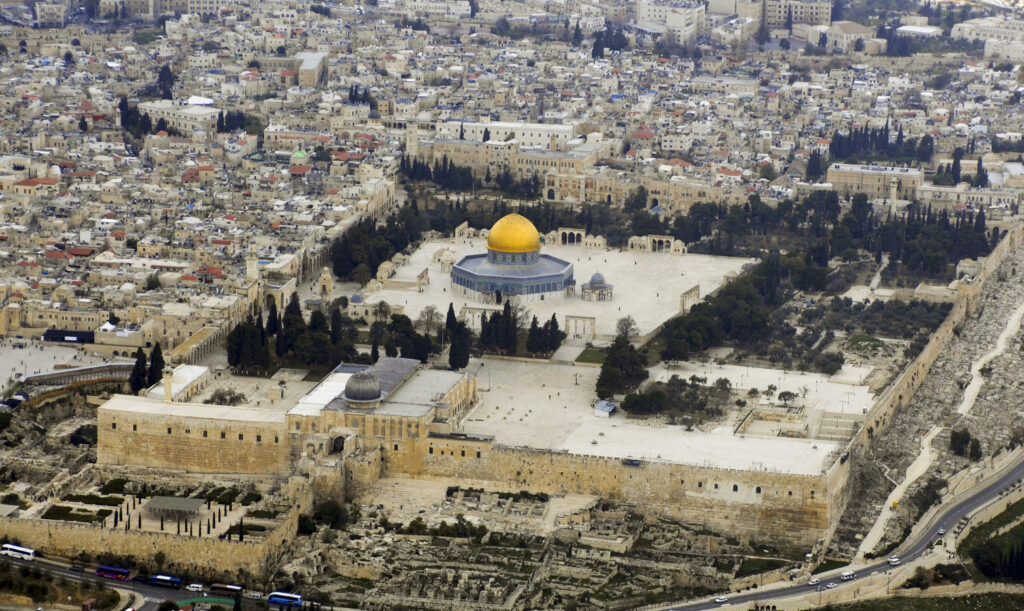
AL-MASJID AL-AQSA (BAIT AL-MAQDIS)
Al-Masjid Al-Aqsa, also referred to as Bait Al-Maqdis (the sacred house), is the third greatest masjid on this planet. However, most people don’t know much about it.
Firstly, what constitutes the masjid exactly? This is really important to know because there is a great reward for praying in Al-Masjid Al-Aqsa so we have to know which areas constitute the masjid.
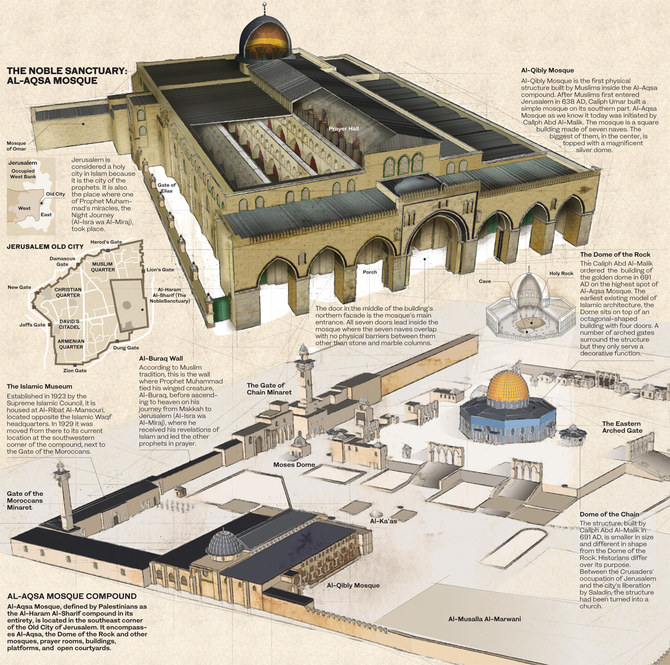
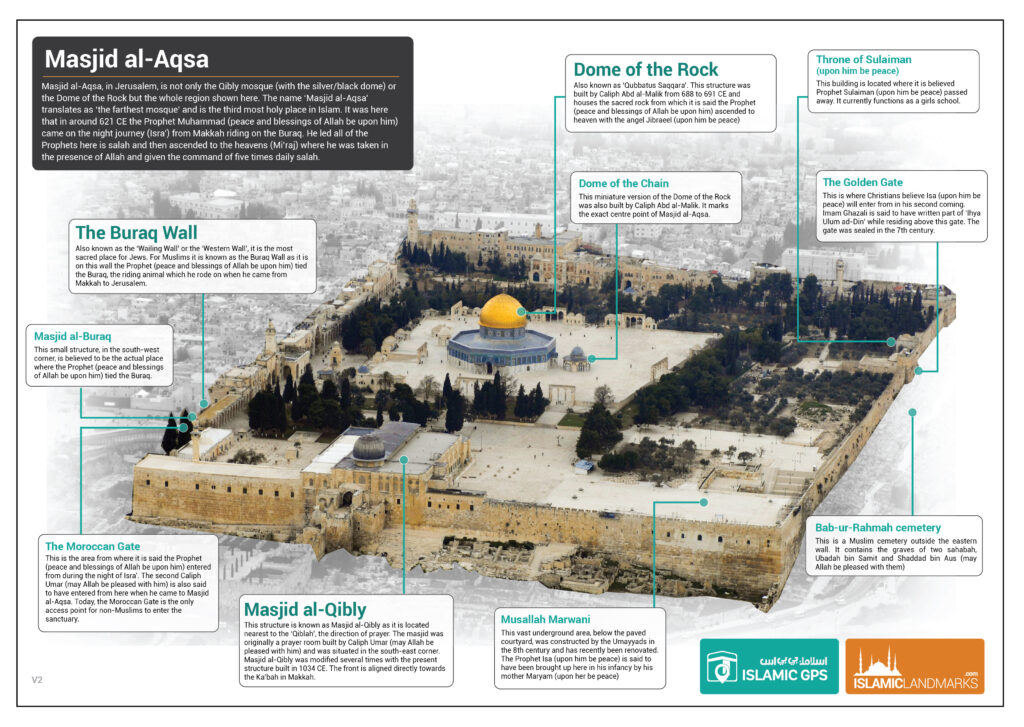
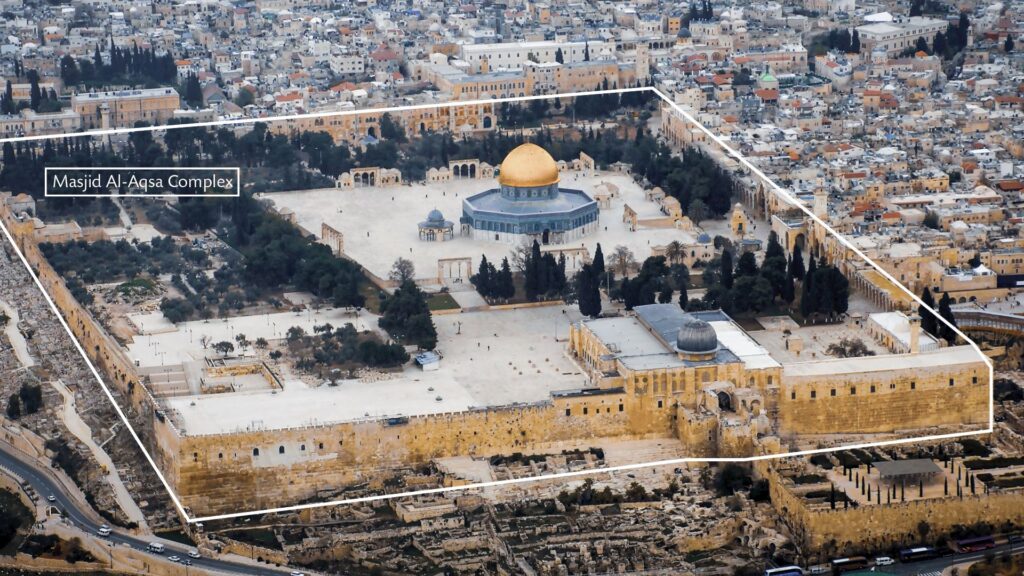
As you can see, the whole area is referred to Al-Masjid Al-Aqsa. The shiny yellow dome is called the Dome of the Rock (Qubbatus-Sakhra) and this is the prayer place for the women in today’s time.
The men pray in Al-Masjid Al-Qibly, which is the masjid with the black dome.
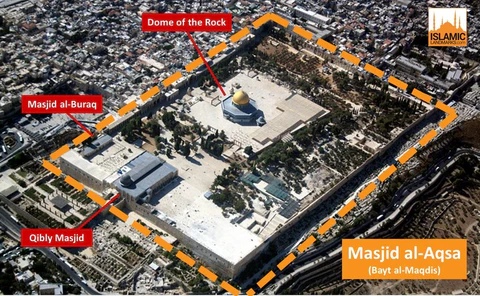
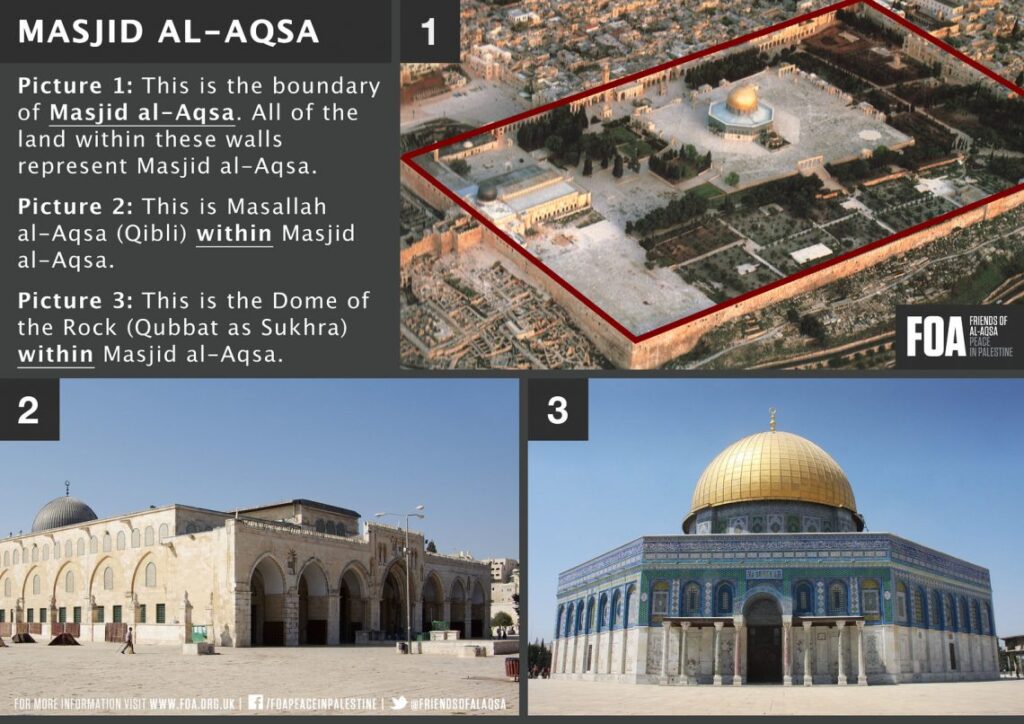
Here’s an important article on this issue.
Now, a lot of people refer to this area as Al-Haram Al-Sharif, implying that this is a sanctuary. However, unlike Makkah and Madinah, this is NOT a sanctuary so its trees can be cut, its game can be chased, etc. Please refer to this article for more information.
Here’s what the Al-Aqsa complex looked like in the past:
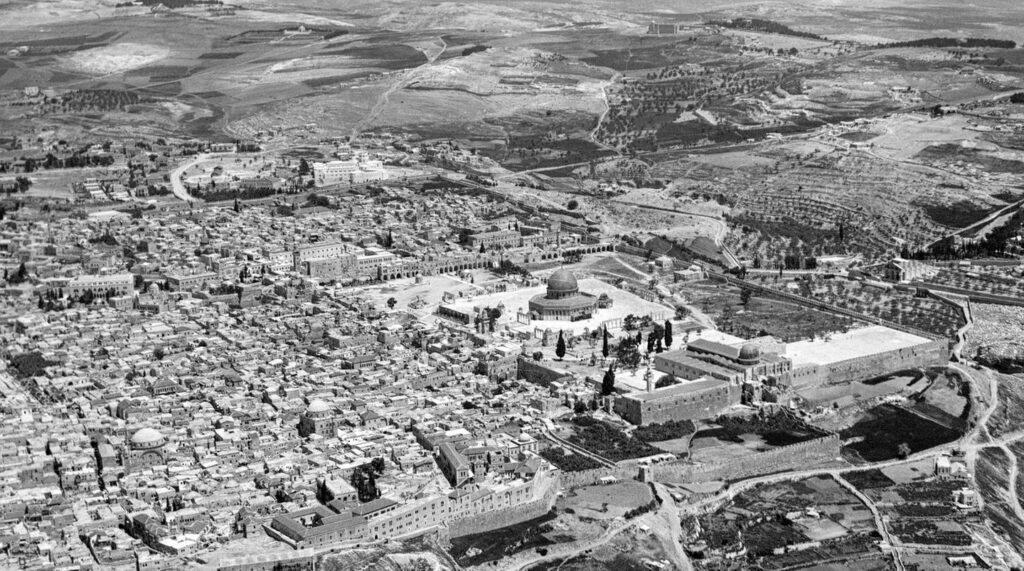
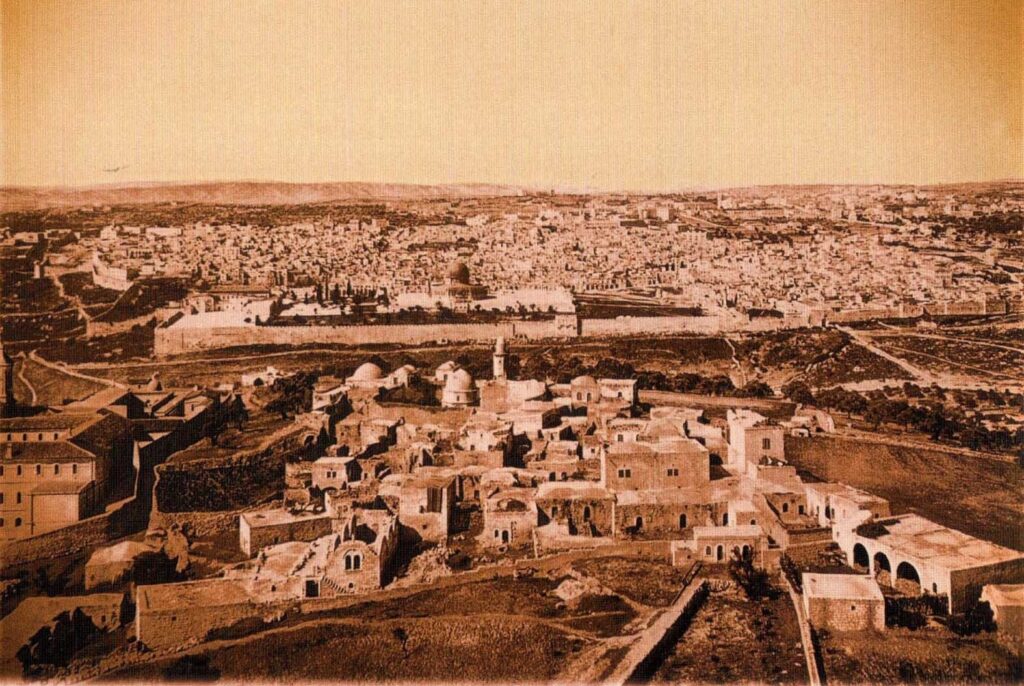
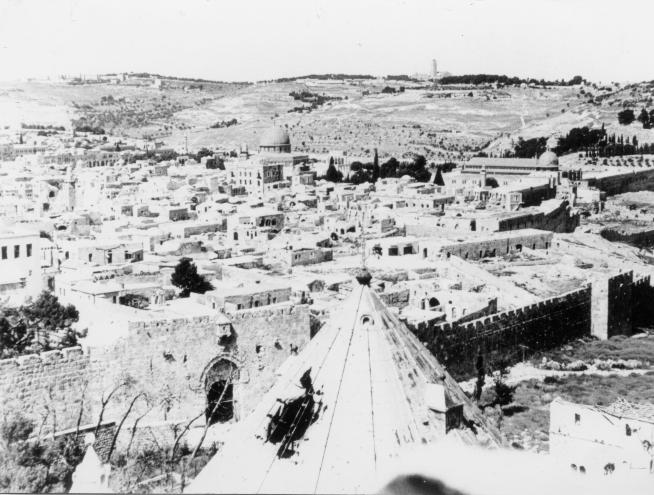
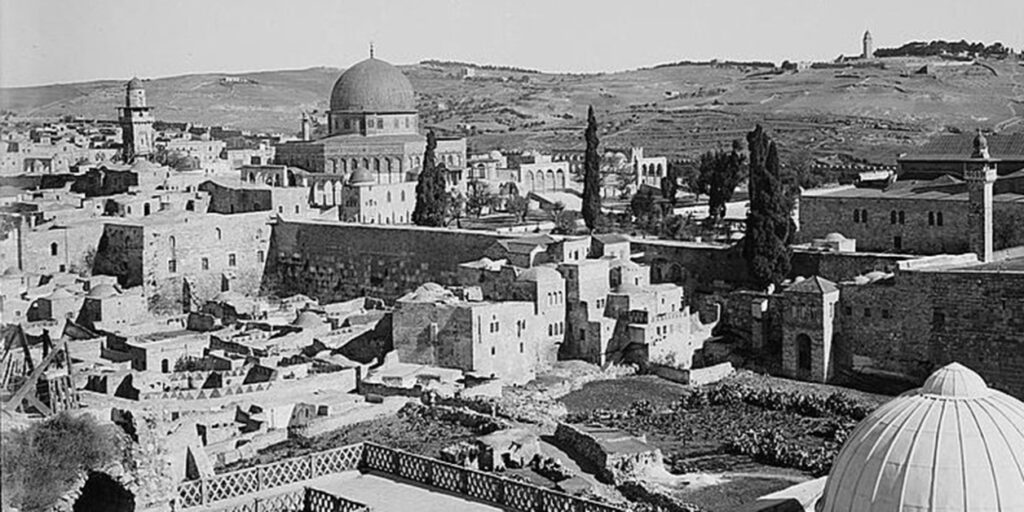
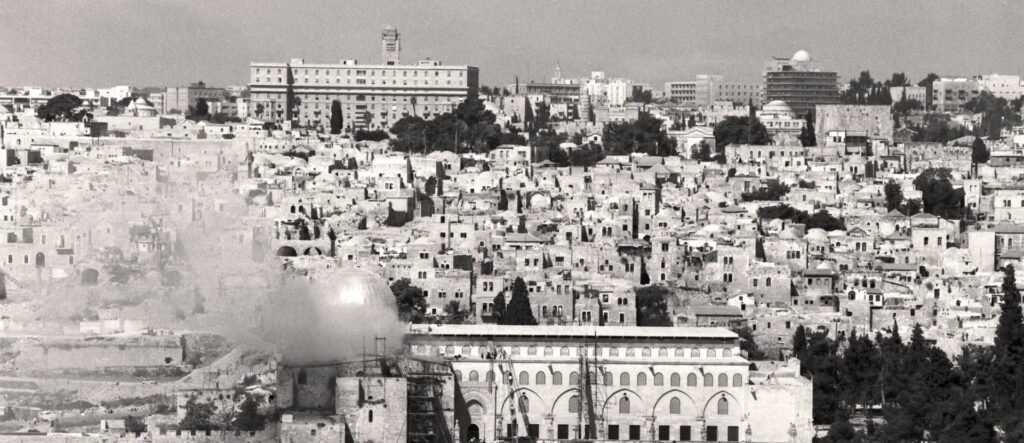
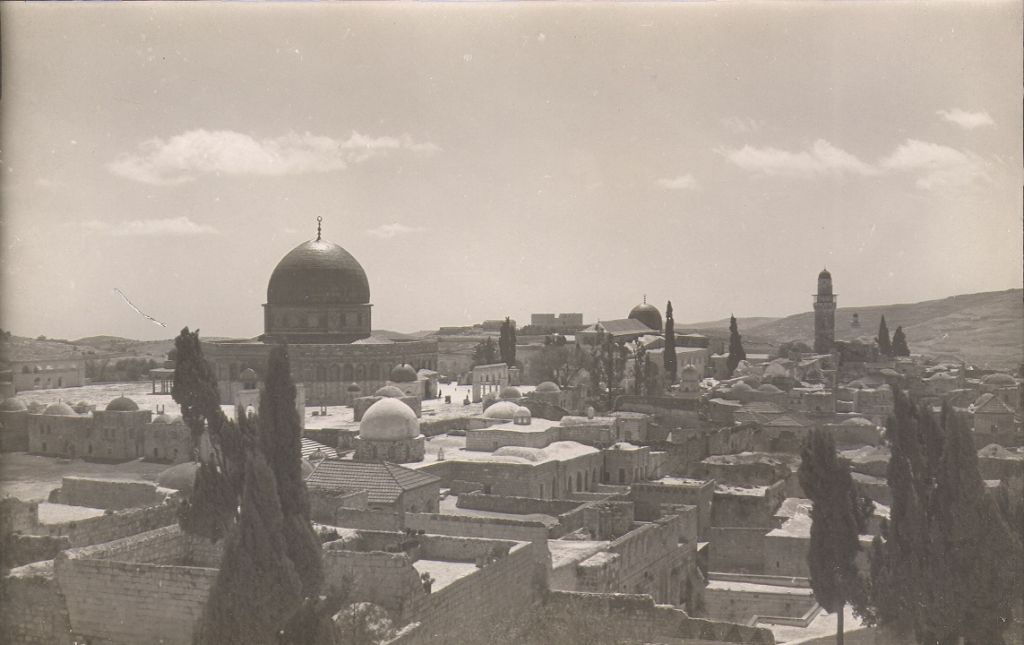
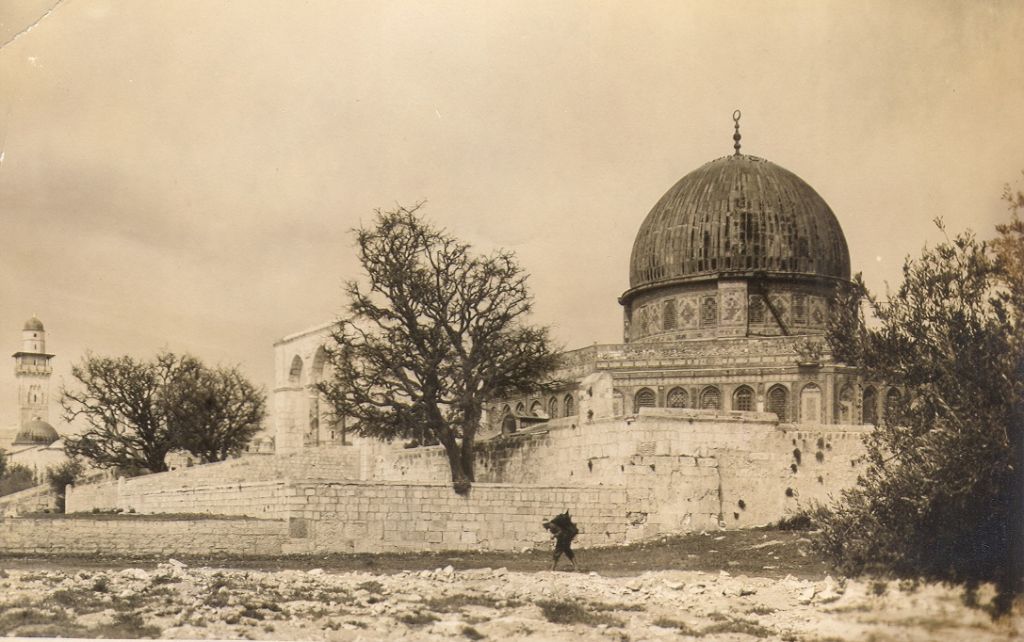
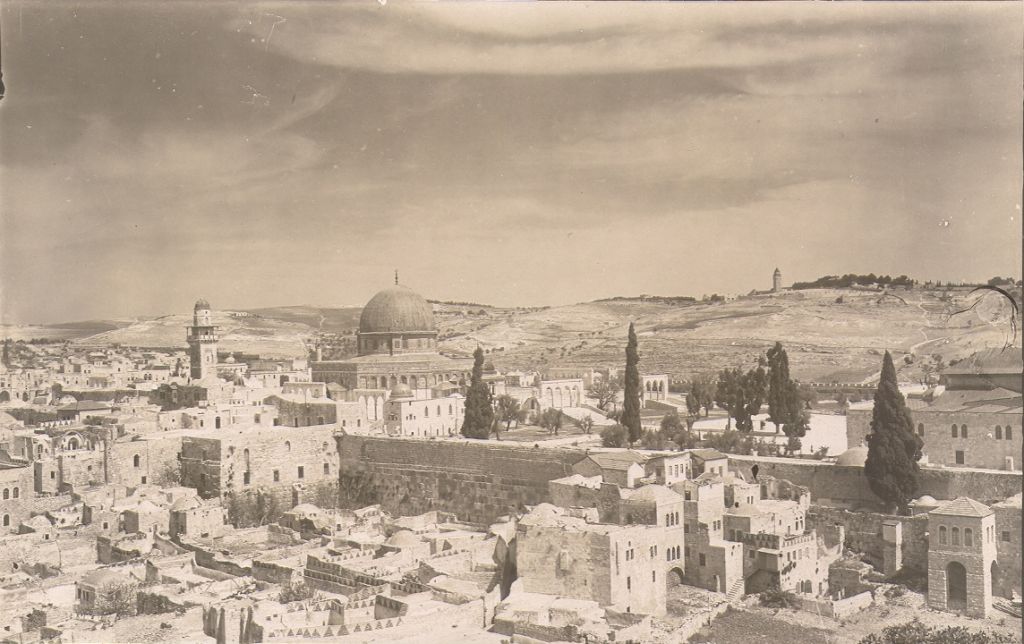
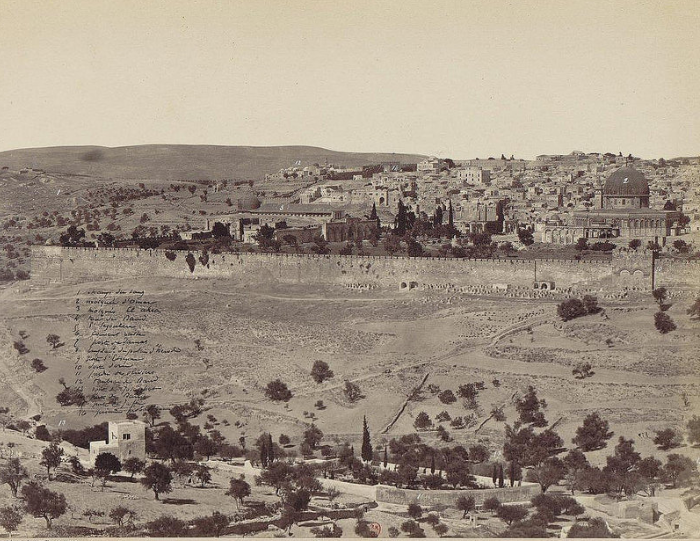

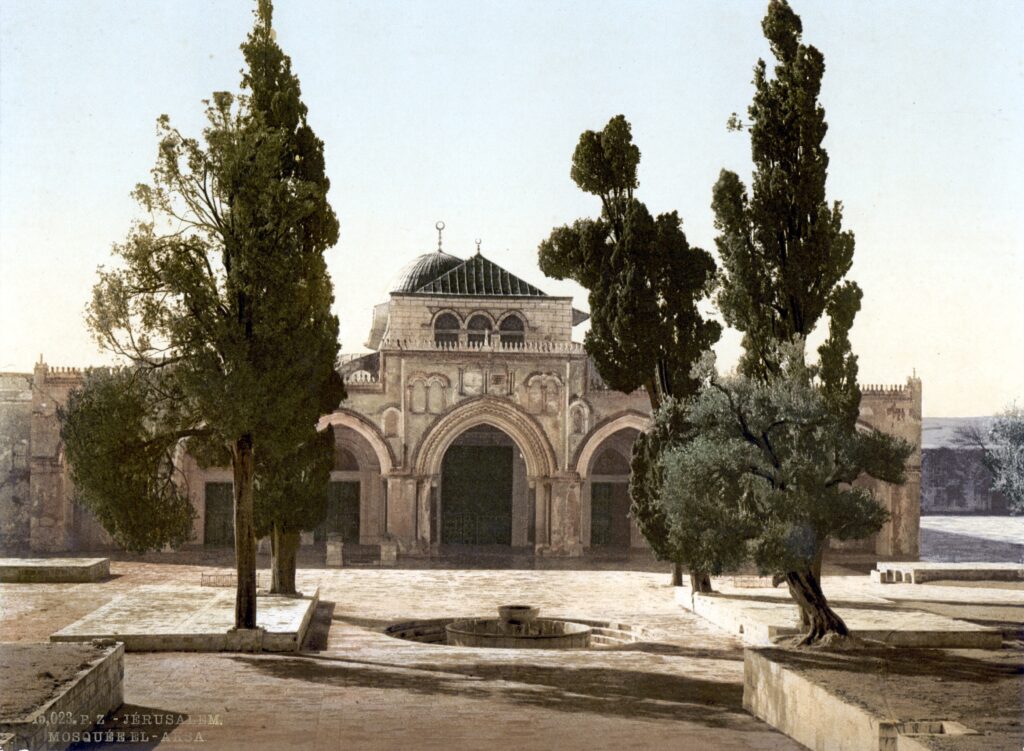
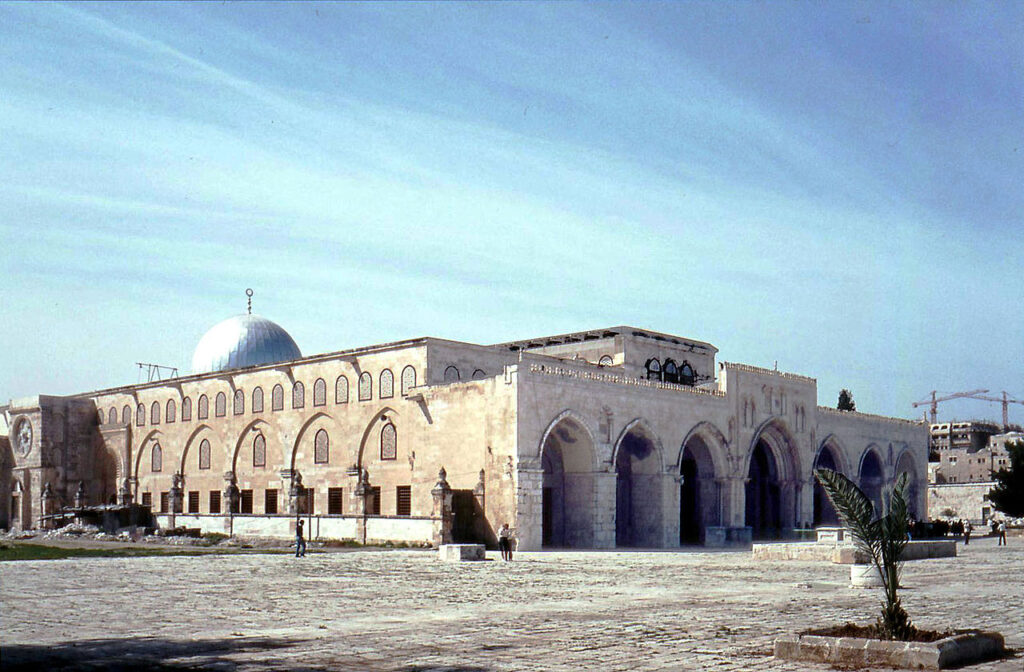
In most of these photos, Al-Masjid Qibly is hard to spot whilst the Dome of the Rock stands out.
Here’s what the whole complex looks like in today’s time:
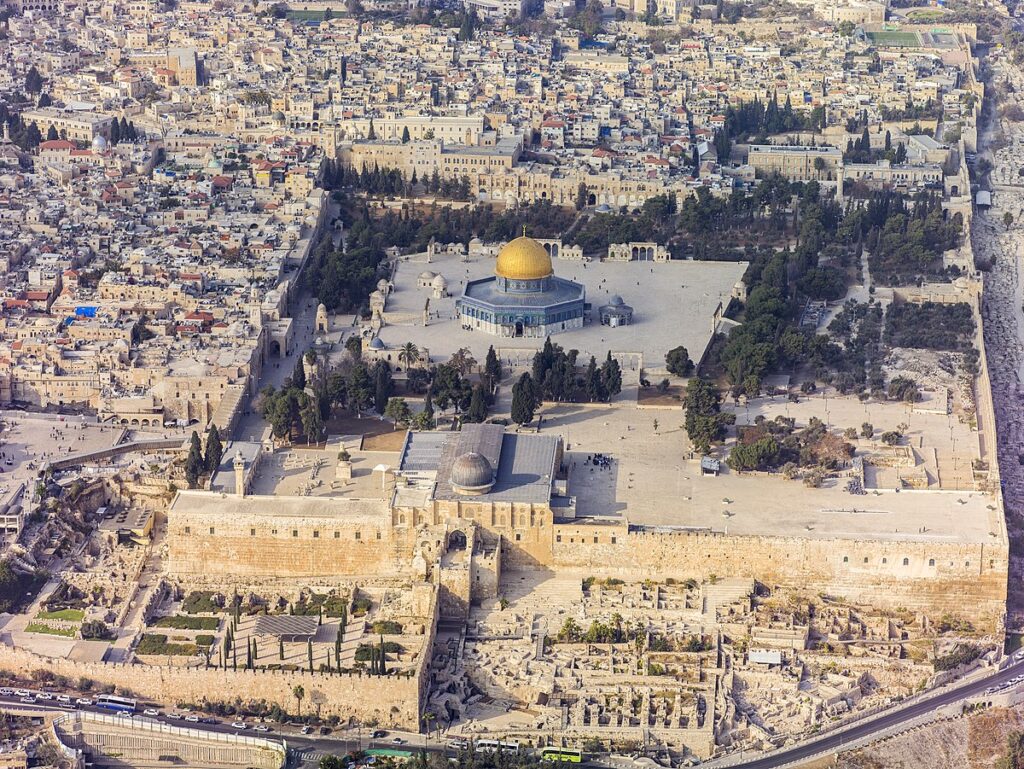
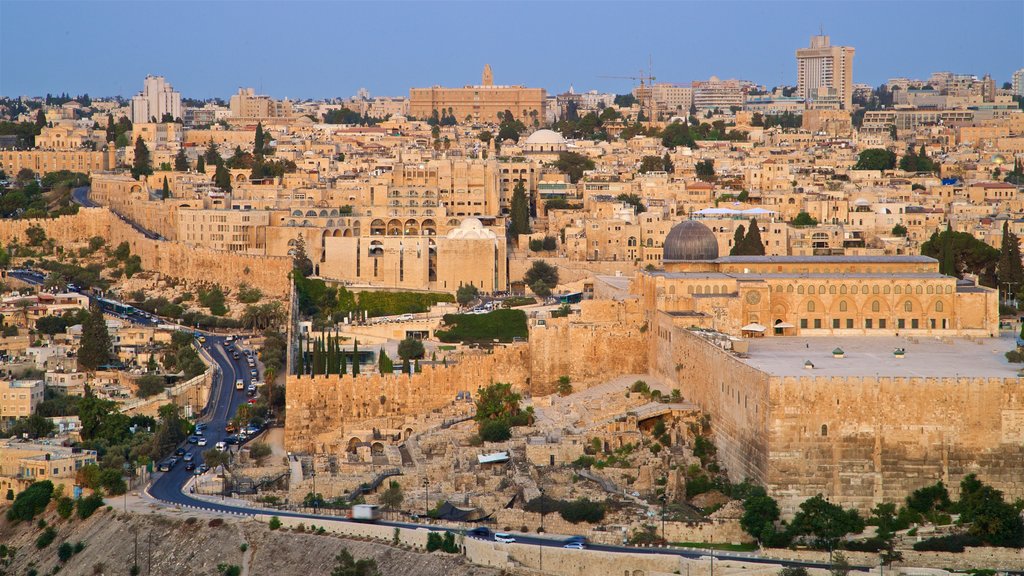
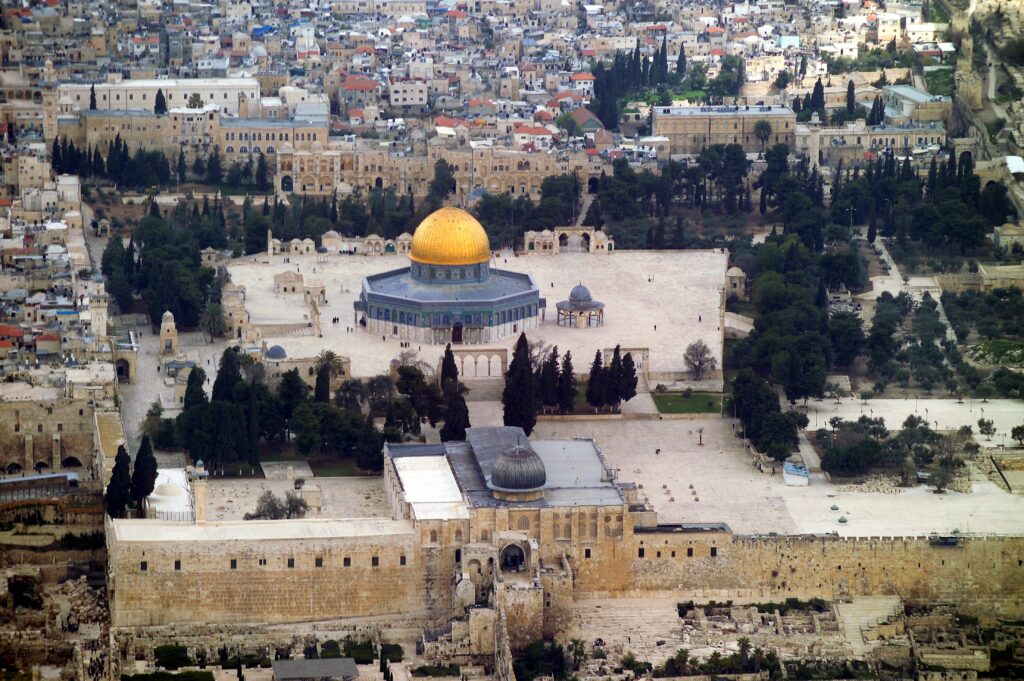
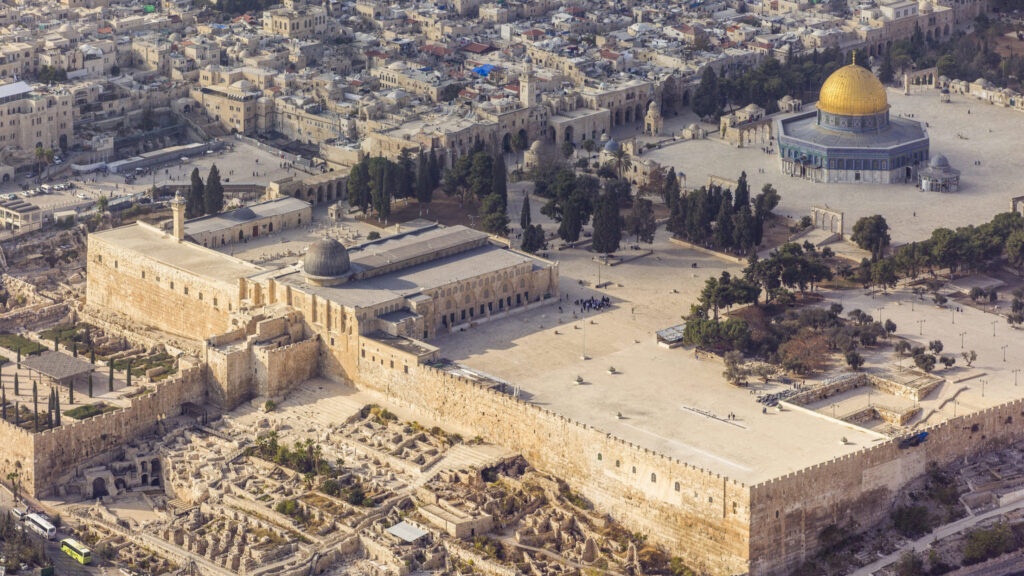
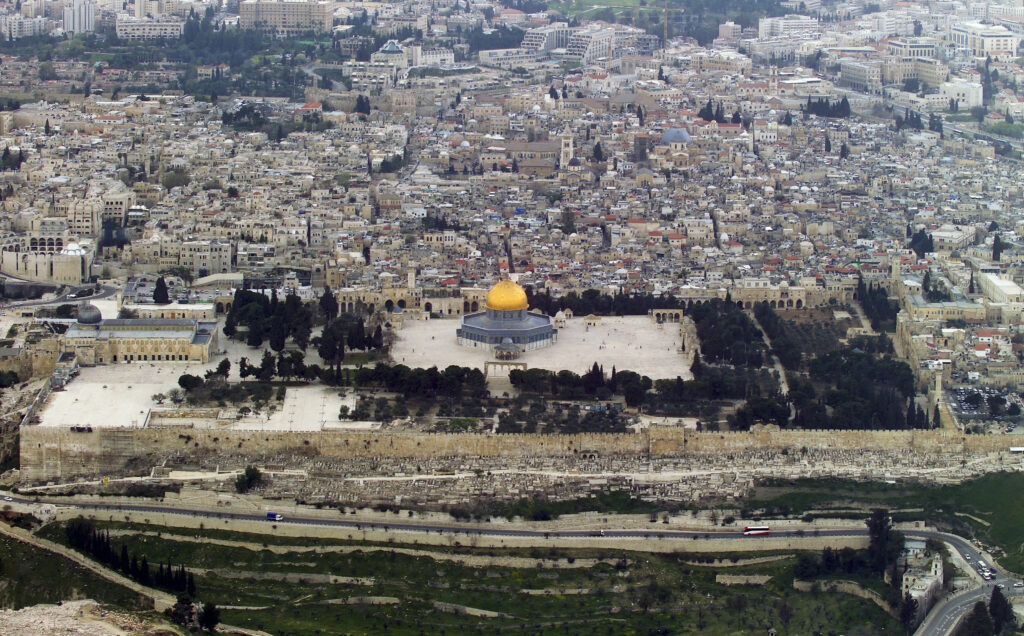
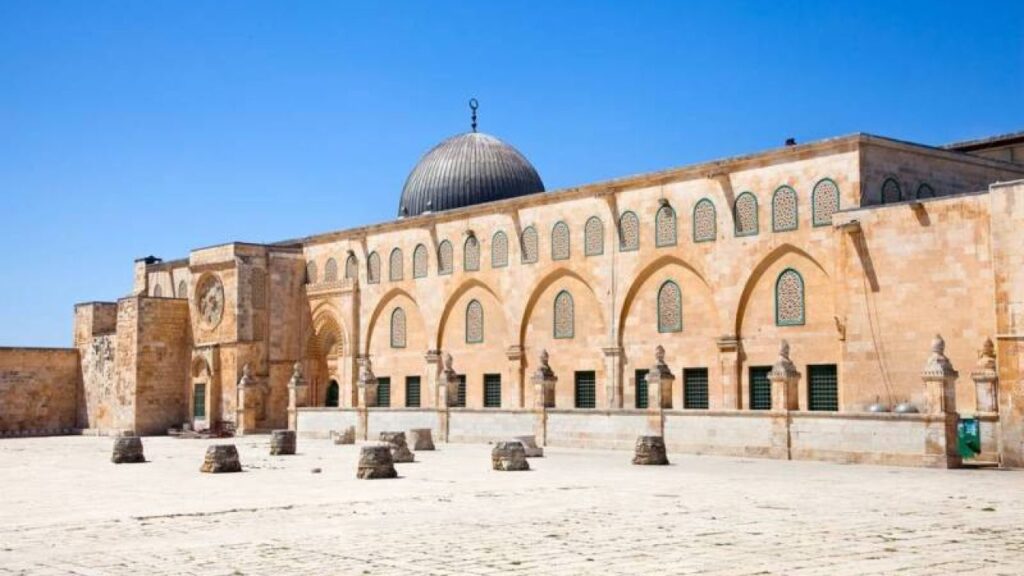
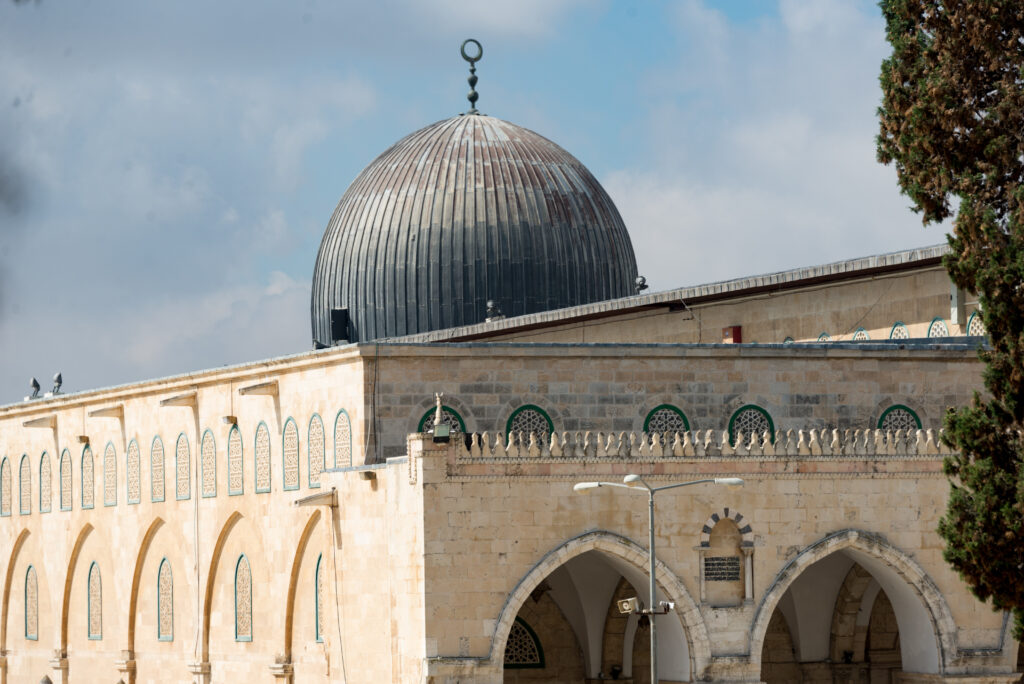
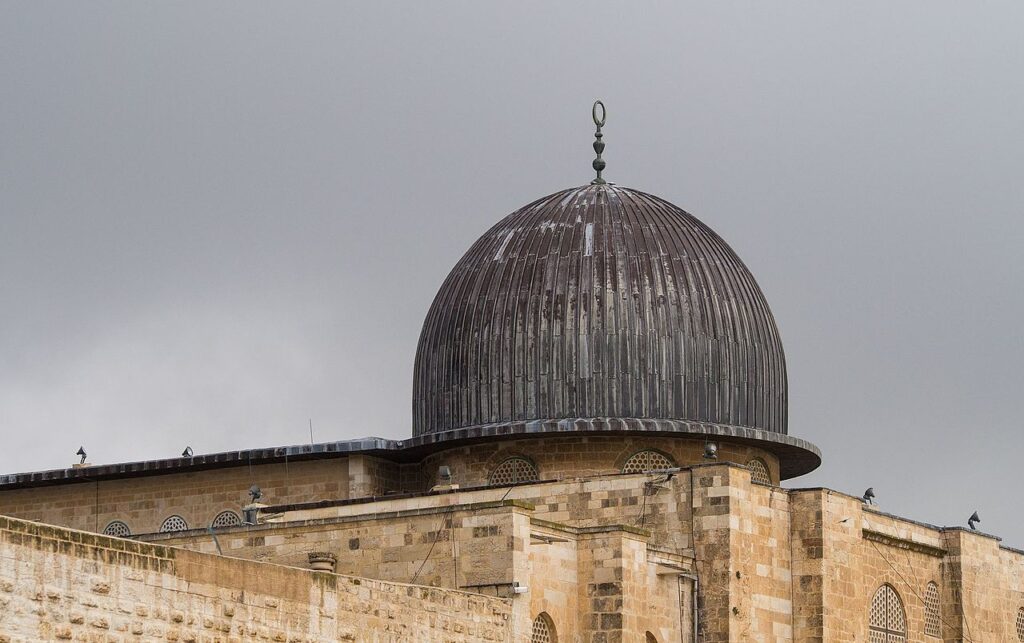
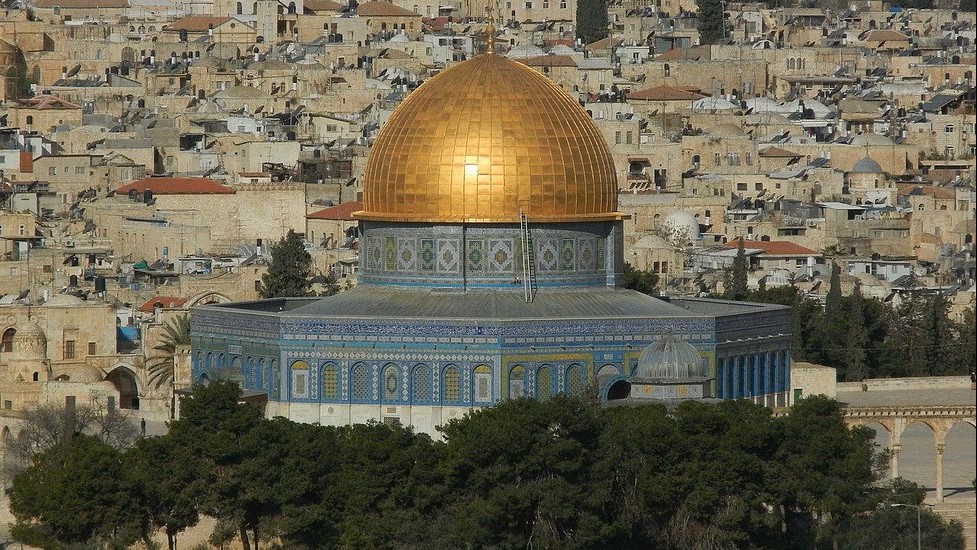
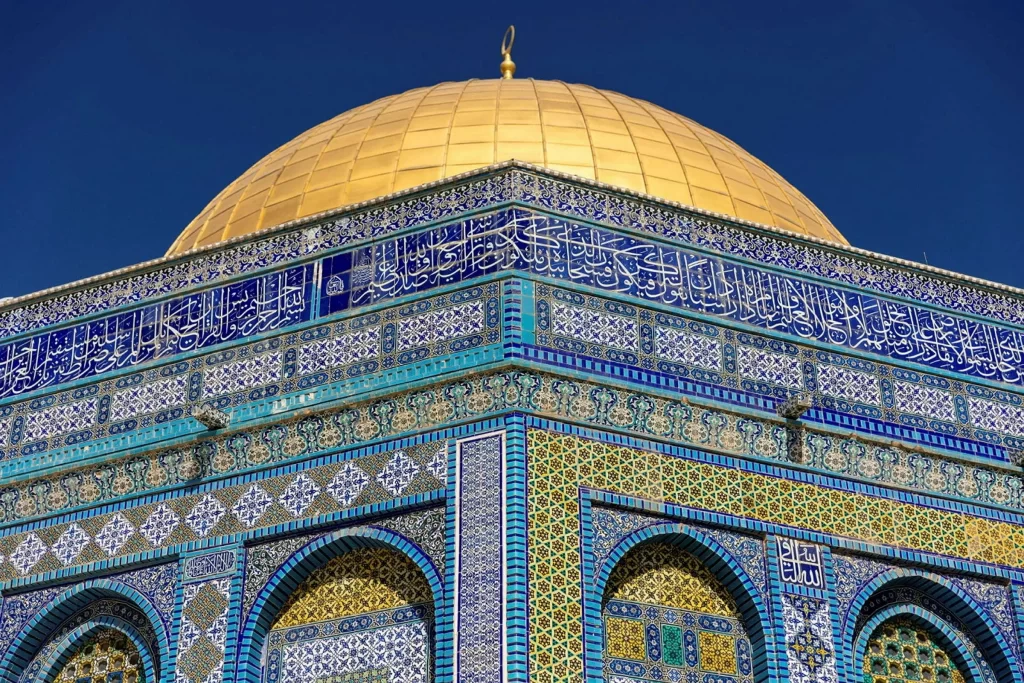
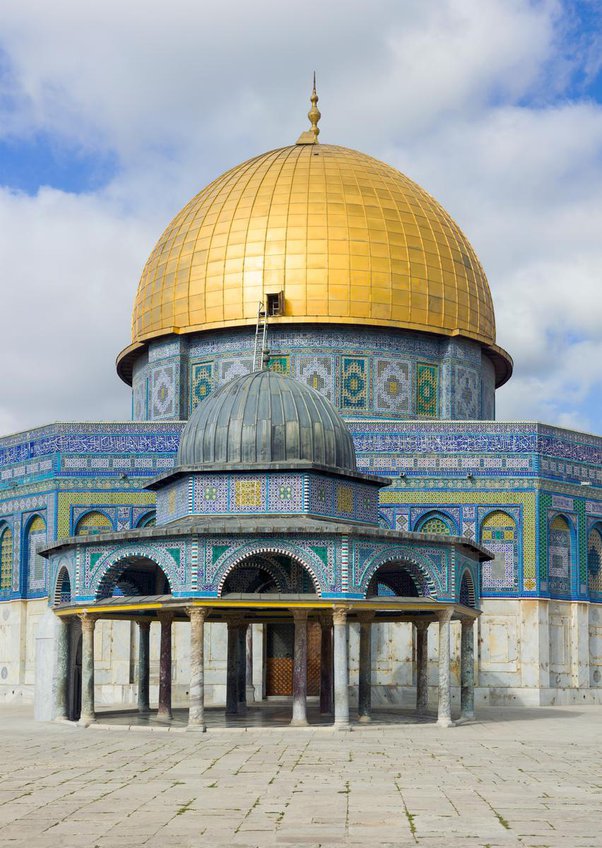
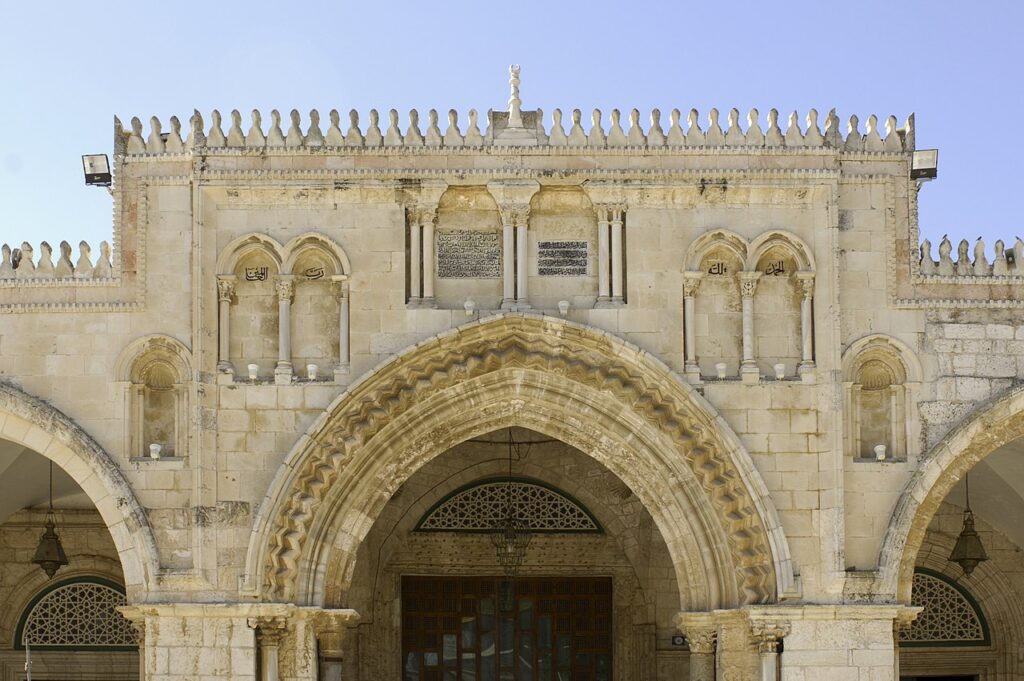
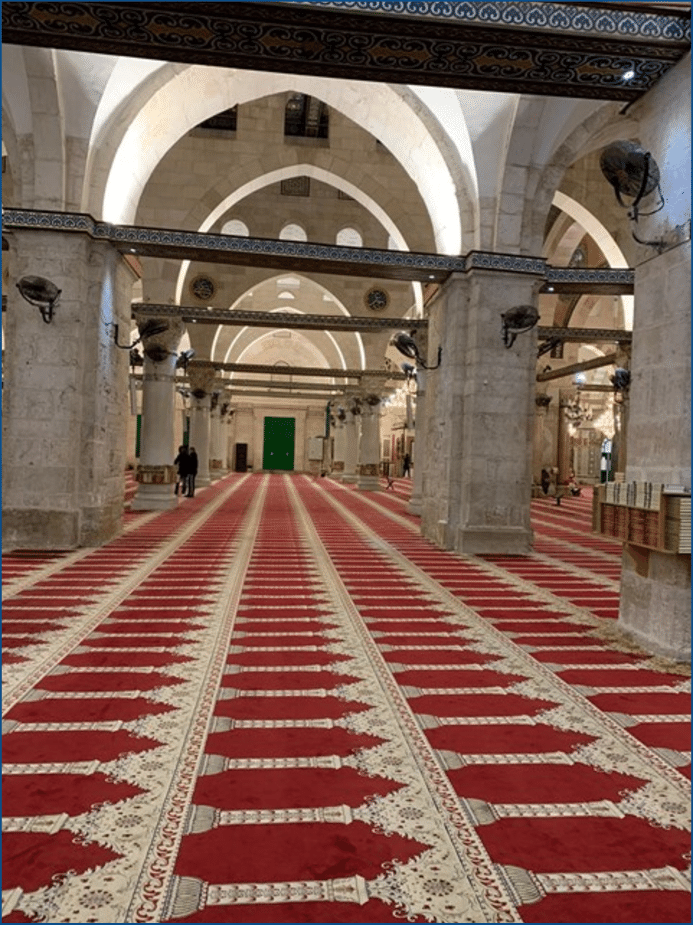
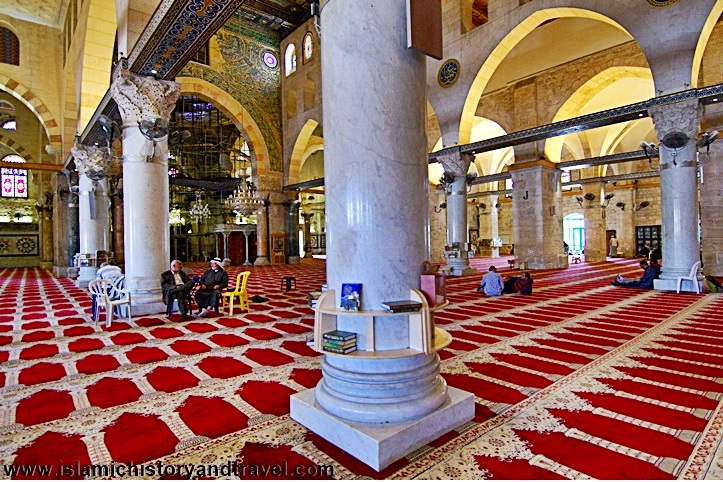
What are the virtues of Al-Masjid Al-Aqsa?
1.It was the first Qiblah (prayer direction) of the Muslims
عن الْبَرَاء يَقُولُ صَلَّيْنَا مَعَ رَسُولِ اللَّهِ صلى الله عليه وسلم نَحْوَ بَيْتِ الْمَقْدِسِ سِتَّةَ عَشَرَ شَهْرًا أَوْ سَبْعَةَ عَشَرَ شَهْرًا ثُمَّ صُرِفْنَا نَحْوَ الْكَعْبَةِ
Al-Baraa (radiallahu anhu) said: We prayed with the Messenger of Allah (sallallahu alaihi wasallam) (with our faces) towards Bait-ul-Maqdis for sixteen months or seventeen months. Then we were made to change (our direction) towards the Kabah. [Sahih Muslim, Hadeeth No. 1072]
2. It was the second masjid built on earth
عَنْ أَبِي ذَرٍّ ، قَالَ: قُلْتُ: يَا رَسُولَ اللّهِ! أَيُّ مَسْجِدٍ وُضِعَ فِي الأَرْضِ أَوَّلاً؟ قَالَ: الْمَسْجِدُ الْحَرَامُ. قُلْتُ: ثُمَّ أَيٌّ؟ قَالَ: :الْمَسْجِدُ الأَقْصَى. قُلْتُ: كَمْ بَيْنَهُمَا؟ قَالَ: أَرْبَعُونَ سَنَةً، وَأَيْنَمَا أَدْرَكَتْكَ الصَّلاَةُ فَصَلِّ فَهُوَ مَسْجِدٌ. وَفِي حَدِيثِ أَبِي كَامِلٍ :ثُمَّ حَيْثُمَا أَدْرَكَتْكَ الصَّلاَةُ فَصَلِّهْ. فَإِنَّهُ مَسْجِدٌ
Abu Dharr (radiallahu anhu) reported: I said: Messenger of Allah, which masjid was set up first on the earth? He (sallallahu alaihi wasallam) said: Al-Masjid al-Haram. I (again) said: Then which next? He said: It was the Masjid Al-Aqsa. I (again) said: How long the space of time (between their setting up)? He (the Prophet) said: It was forty years. And whenever the time comes for prayer, pray there, for that is a mosque; and in the hadith transmitted by Abu Kamil (the words are):” Whenever time comes for prayer, pray, for that is a mosque (for you).” [Sahih Muslim, Hadeeth No. 1056]
3. Prayer in it has more reward
عن أبي ذر رضي الله عنه أنَّهُ سأل رسولَ اللهِ صلَّى اللهُ عليْهِ وسلَّمَ عَن الصَّلاةِ في بَيتِ المقدِسِ أفضلُ أو في مسجِدِ رسولِ اللهِ صلَّى اللهُ عليْهِ وسلَّمَ فَقالَ صلاةٌ في مسجِدي هذا ، أفضلُ من أربعِ صلواتٍ فيهِ ، ولنِعْمَ المصلَّى
Abu Dharr (radiallahu anhu) narrated that he asked the Messenger of Allah (sallallahu alaihi wasallam) about whether prayer was more virtuous in Bait Al-Maqdis or in the masjid of the Messenger of Allah (sallallahu alaihi wasallam). He said: “One prayer in this mosque of mine is better than four prayers offered there (in Bayt al-Maqdis), and what a good place of prayer (it is). [Sahih At-Targheeb Wat-Tarheeb, Hadeeth No. 1179]
4. It is permitted to set out on a journey to visit it
عن أبي هريرةَ رضيَ اللَّهُ عنهُ عنِ النبي صلى الله عليه وسلّم قال: لا تُشَدُّ الرِّحالُ إلاّ إلى ثلاثةِ مَساجِدَ: المسجدِ الحرامِ، ومسجدِ الرسول صلى الله عليه وسلّم ومسجد الأقصى
Narrated Abu Hurairah (radiallahu anhu): The Prophet (sallallahu alaihi wasallam) said, “Do not set out on a journey except for three masjids i.e. Al-Masjid-AI-Haram, the Masjid of Allah’s Messenger (sallallahu alaihi wasallam), and the Masjid Al-Aqsa, (Masjid of Jerusalem).” [Sahih Bukhari, Volume 2, Hadeeth No. 281]
Setting out on a journey to pray in Al-Masjid Al-Aqsa has become a forgotten sunnah these days.
5. The area surrounding it is blessed
سُبْحَانَ الَّذِي أَسْرَىٰ بِعَبْدِهِ لَيْلًا مِّنَ الْمَسْجِدِ الْحَرَامِ إِلَى الْمَسْجِدِ الْأَقْصَى الَّذِي بَارَكْنَا حَوْلَهُ لِنُرِيَهُ مِنْ آيَاتِنَا ۚ إِنَّهُ هُوَ السَّمِيعُ الْبَصِيرُ
Exalted is He who took His Servant by night from al-Masjid al-Haram to al-Masjid al-Aqsa, whose surroundings We have blessed, to show him of Our signs. Indeed, He is the Hearing, the Seeing. [Surah Al-Israa (17) : 1]
Al-Masjid Al-Aqsa actually means “the furthest masjid”.
6. The Prophet (sallallahu alaihi wasallam) led the other Prophets (alaihimissalaam) in prayer in this masjid
This happened during the night journey (Al-Israa).
عَنْ أَبِي هُرَيْرَةَ، قَالَ قَالَ رَسُولُ اللَّهِ صلى الله عليه وسلم : لَقَدْ رَأَيْتُنِي فِي الْحِجْرِ وَقُرَيْشٌ تَسْأَلُنِي عَنْ مَسْرَاىَ فَسَأَلَتْنِي عَنْ أَشْيَاءَ مِنْ بَيْتِ الْمَقْدِسِ لَمْ أُثْبِتْهَا . فَكُرِبْتُ كُرْبَةً مَا كُرِبْتُ مِثْلَهُ قَطُّ قَالَ فَرَفَعَهُ اللَّهُ لِي أَنْظُرُ إِلَيْهِ مَا يَسْأَلُونِي عَنْ شَىْءٍ إِلاَّ أَنْبَأْتُهُمْ بِهِ وَقَدْ رَأَيْتُنِي فِي جَمَاعَةٍ مِنَ الأَنْبِيَاءِ فَإِذَا مُوسَى قَائِمٌ يُصَلِّي فَإِذَا رَجُلٌ ضَرْبٌ جَعْدٌ كَأَنَّهُ مِنْ رِجَالِ شَنُوءَةَ وَإِذَا عِيسَى ابْنُ مَرْيَمَ – عَلَيْهِ السَّلاَمُ – قَائِمٌ يُصَلِّي أَقْرَبُ النَّاسِ بِهِ شَبَهًا عُرْوَةُ بْنُ مَسْعُودٍ الثَّقَفِيُّ وَإِذَا إِبْرَاهِيمُ – عَلَيْهِ السَّلاَمُ – قَائِمٌ يُصَلِّي أَشْبَهُ النَّاسِ بِهِ صَاحِبُكُمْ – يَعْنِي نَفْسَهُ – فَحَانَتِ الصَّلاَةُ فَأَمَمْتُهُمْ فَلَمَّا فَرَغْتُ مِنَ الصَّلاَةِ قَالَ قَائِلٌ يَا مُحَمَّدُ هَذَا مَالِكٌ صَاحِبُ النَّارِ فَسَلِّمْ عَلَيْهِ . فَالْتَفَتُّ إِلَيْهِ فَبَدَأَنِي بِالسَّلاَمِ
It is narrated on the authority of Abu Hurairah (radiallahu anhu) that the Messenger of Allah (sallallahu alaihi wasallam) said: I found myself in Hijr and the Quraish were asking me about my night journey. I was asked about things pertaining to Bait-ul-Maqdis which I could not preserve (in my mind). I was very much vexed, so vexed as I had never been before. Then Allah raised it (Bait-ul-Maqdis) before my eyes. I looked towards it, and I gave them the information about whatever they questioned me I also saw myself among the group of Prophets. I saw Musa saying prayer and found him to be a well-built man as if he was a man of the tribe of Shanua. I saw Isa, the son of Maryam, offering prayer, of all of men he had the closest resemblance with Urwa bin Masud ath-Thaqafi. I saw Ibrahim (alaihissalaam) offering prayer; he had the closest resemblance with your companion (the Prophet himself) amongst people. When the time of prayer came I led them. When I completed the prayer, someone said: Here is Malik, the keeper of the Hell; pay him salutations. I turned to him, but he preceded me in salutation. [Sahih Muslim, Hadeeth No. 328]
7. The Dajjal will not enter it
فقال: أنذَرتُكمُ المَسيحَ، وهو مَمسوحُ العَينِ -قال: أحسَبُه قال: اليُسْرى- يَسيرُ معه جِبالُ الخُبْزِ، وأنهارُ الماءِ، علامَتُه يَمكُثُ في الأرضِ أربَعينَ صباحًا، يَبلُغُ سُلْطانُه كُلَّ مَنهَلٍ، لا يَأتي أربعةَ مَساجِدَ: الكَعْبةَ، ومَسجِدَ الرَّسولِ، والمَسجِدَ الأقْصى، والطُّورَ
He (the Prophet (sallallahu alaihi wasallam)said: “I have been warning you about the Dajjal who has one abraded eye.” [The narrators] said: I think he said the left eye. “He will have with him mountains of bread and rivers of water, and his sign will stay in the earth for forty mornings, and his authority will reach everywhere. He will not come to four mosques: the Kabah, the Masjid of the Messenger, al-Masjid al-Aqsa and (the masjid of) at-Toor (Sinai).” [Musnad Ahmad, Hadeeth No. 23090. Shuaib Al-Arnaut said that its “isnaad” (chain of narrators) was “sahih” (authentic).]
In fact, he will be killed at a place called Ludd which is close to Bait Al-Maqdis.
عَنْ مُجَمِّع بْن جَارِيَةَ الأَنْصَارِيَّ يَقُولُ سَمِعْتُ رَسُولَ اللَّهِ صلى الله عليه وسلم يَقُولُ : يَقْتُلُ ابْنُ مَرْيَمَ الدَّجَّالَ بِبَابِ لُدٍّ
As you can see, this masjid is full of virtues and we need to strive to visit it, if possible, and also increase in supplication for the Palestinians, and indeed for all the oppressed Muslims around the world, like the Uyghurs, Rohingya and the Kashmiris (and now the Assamese). May Allah aid them and grant them victory over their oppressors.

AFTER HAJJ
As discussed in Part 1 of this series, the purpose of our lives is to worship Allah alone.
وَمَا خَلَقْتُ الْجِنَّ وَالْإِنسَ إِلَّا لِيَعْبُدُونِ
And I (Allah) created not the jinns and humans except they should worship Me (Alone). [Surah Ad-Dhaariyaat (51) : 56]
قُلْ إِنَّ صَلَاتِي وَنُسُكِي وَمَحْيَايَ وَمَمَاتِي لِلَّـهِ رَبِّ الْعَالَمِينَ
Say: “Verily, my salaah (prayers), my sacrifice, my living, and my dying are for Allah, the Lord of the Alameen (mankind, jinns and all that exists).” [Surah Al-Anaam (6) : 162]
So, worshipping Allah does not end with Hajj. A person who returns back from Hajj should be a better person than when he or she left for it.
Make sure to ask Allah to accept your Hajj and increase you in righteousness and faith (iman). Also, make a firm commitment to change and make sure you have an ibaadah (worship) routine. If you slip, get right back up. One of the ways to remain steadfast is by seeking authentic Islamic knowledge for the entirety of one’s Islam.
Remember, we need to keep worshipping Allah until death comes to us.
وَاعْبُدْ رَبَّكَ حَتَّىٰ يَأْتِيَكَ الْيَقِينُ
And worship your Lord until there comes unto you the certainty (i.e. death). [Surah Al-Hijr (15) : 99]

FOR THOSE NOT GOING FOR HAJJ THIS YEAR
What if you are not going for Hajj this year? Well, there are plenty of acts to do. Here’s a poster that I prepared for my telegram channel:
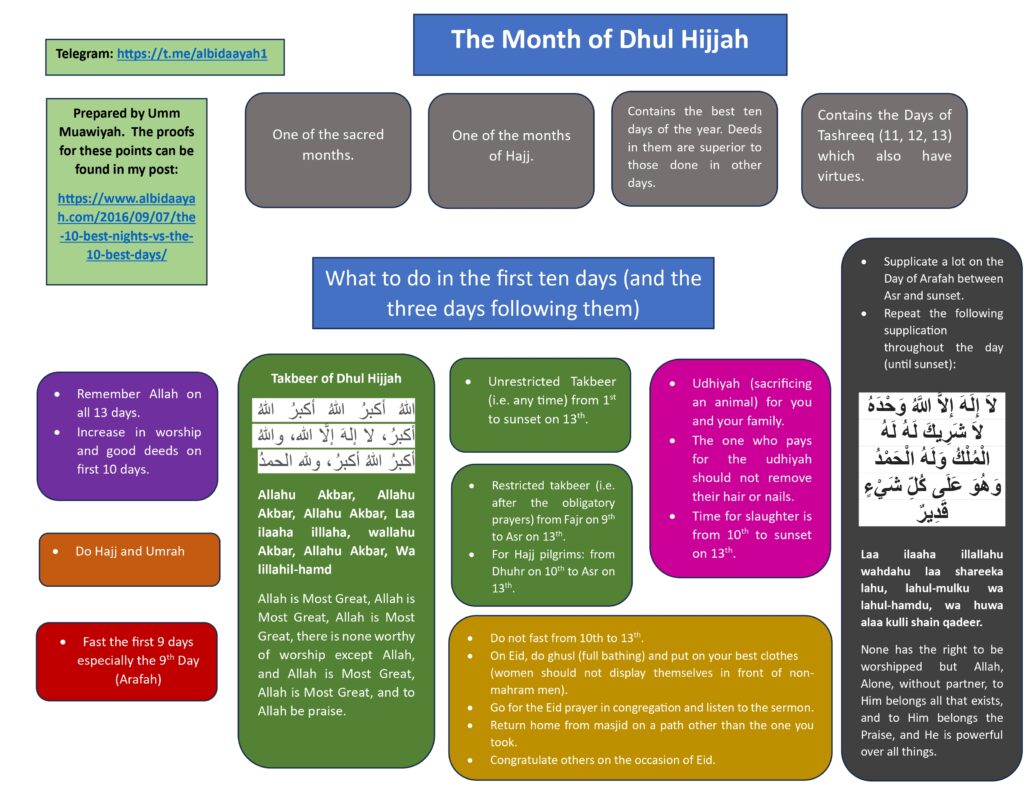
Here are some of my previous articles on this topic:
And here are some articles on Udhiyah (slaughtering):
What is Udhiyah? – Islam QA
Conditions of Udhiyah – Islam QA
Who should offer Udhiyah – Islam QA
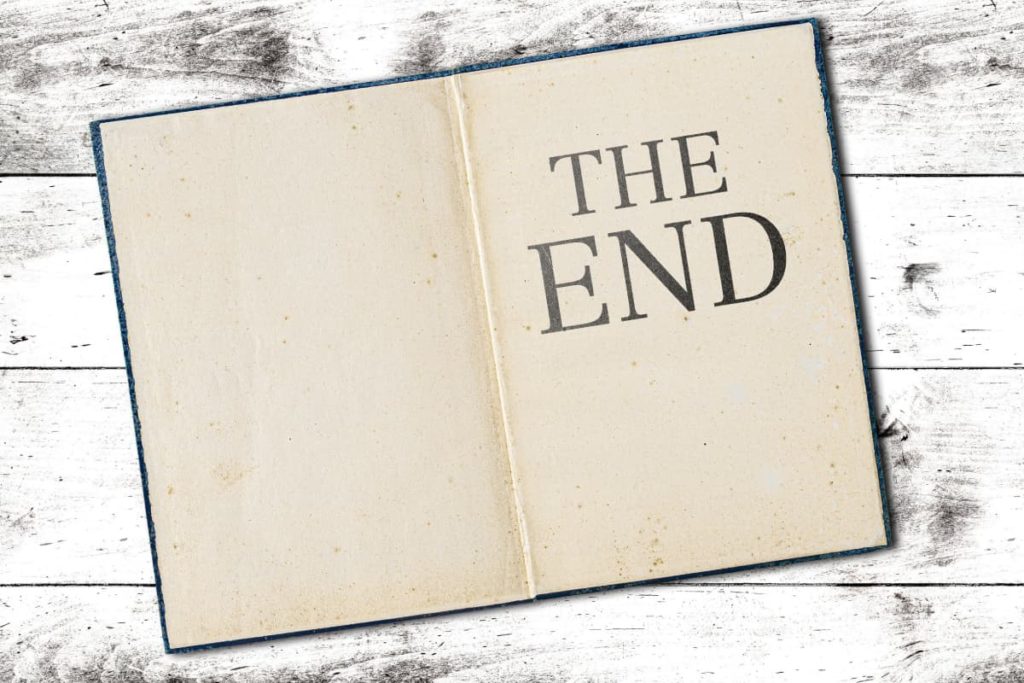
I originally taught my Hajj course in 2008. At that time, I started typing out my notes. In 2011, I started working a private website based on the course and the notes. Then, in 2016, I publish Part 1 of this series (an upgrade on my course and prior notes).
Today is Arafah of 2023 and I have finally finished this series, alhamdulillah. It took 15 years to get to this stage. All praise is due to Allah for causing me to start, continue and finish.
I will try to update each part of the series over the coming year, in shaa Allah.
I hope you enjoyed reading this series. Your thoughts on it would be most welcome.
At the end, the only thing that I can say is:
الْحَمْدُ لِلَّهِ رَبِّ الْعَالَمِينَ
All the praises and thanks be to Allah, the Lord of the Alameen (mankind, jinns and all that exists). [Surah Al-Fatihah (1) : 2]
